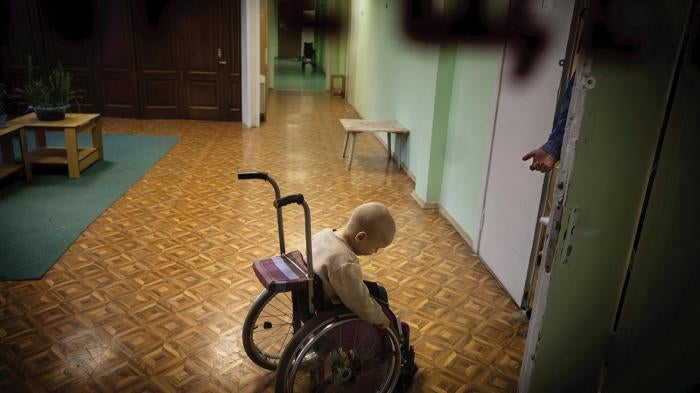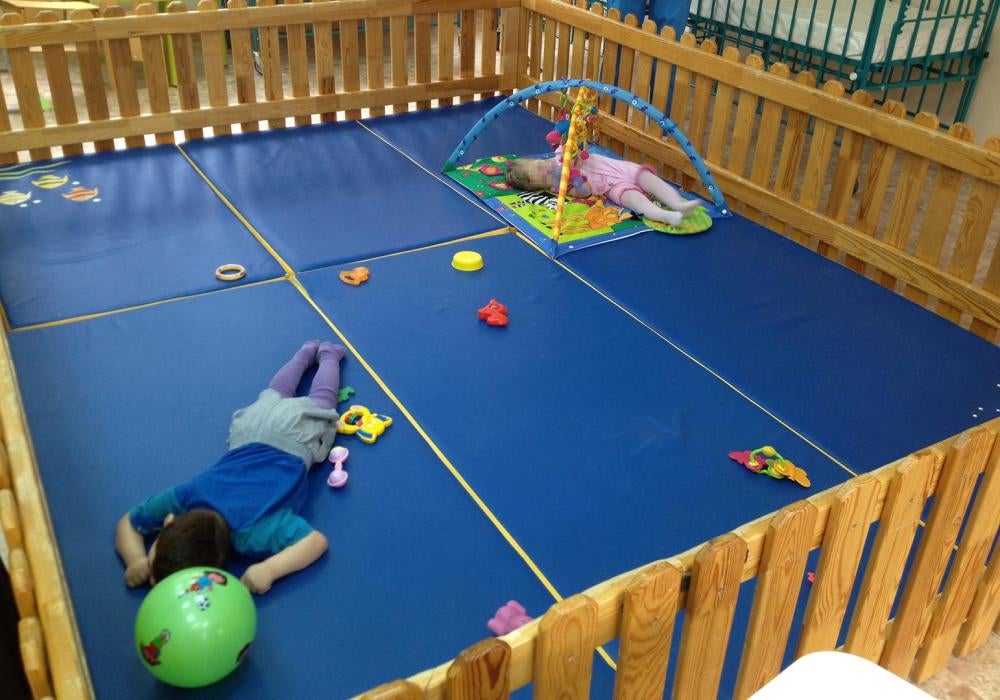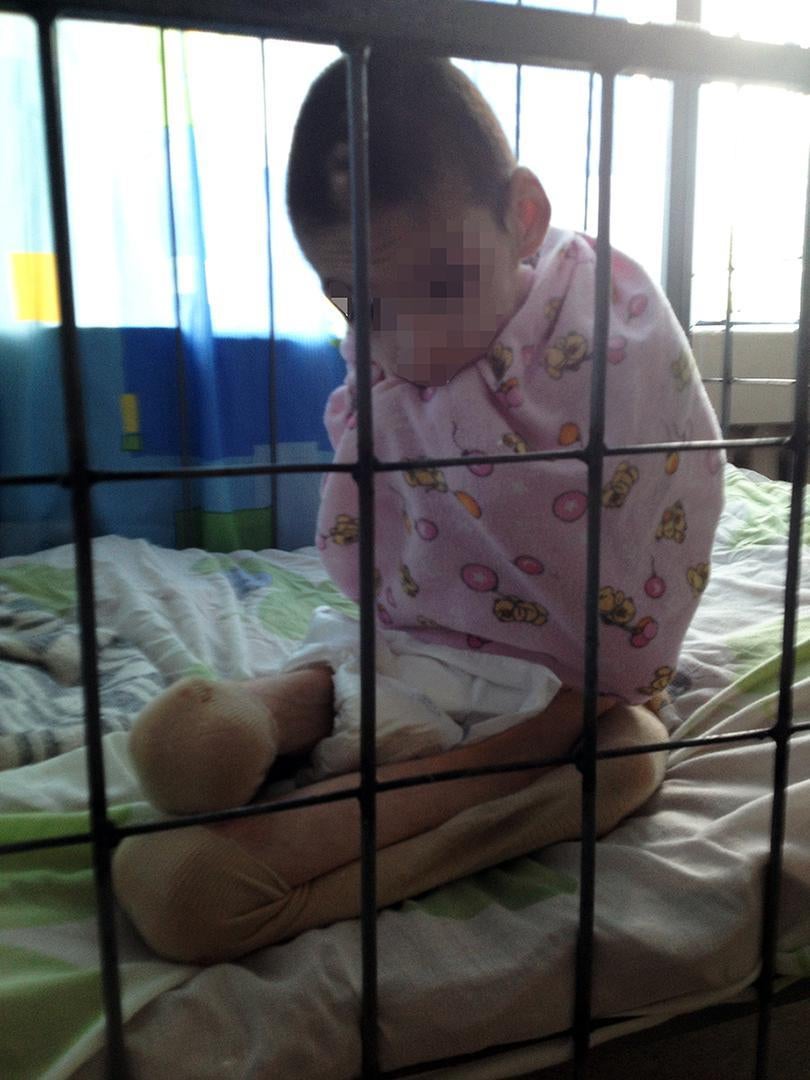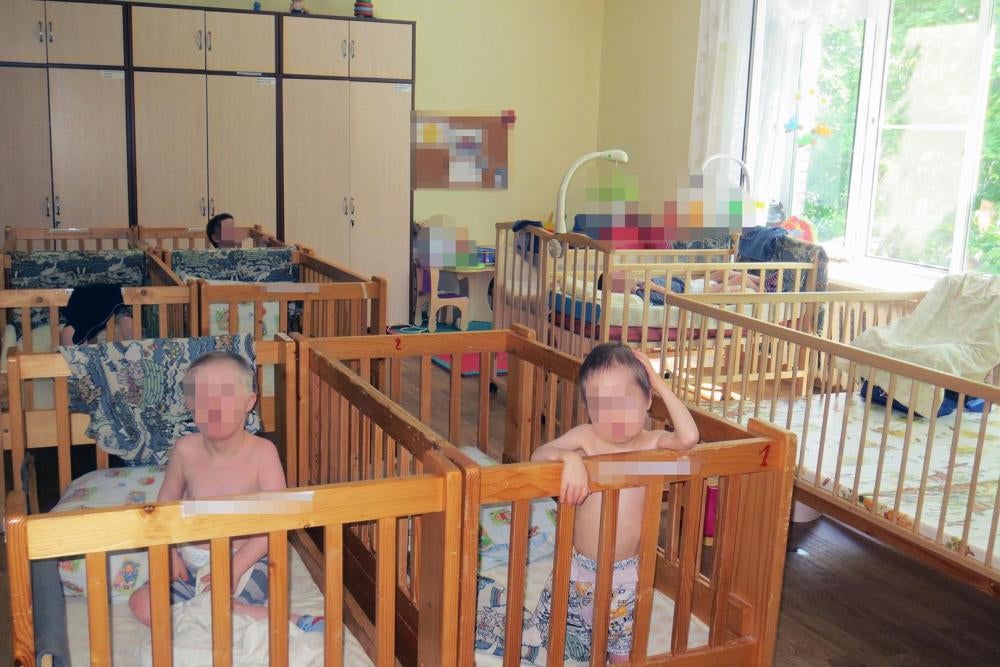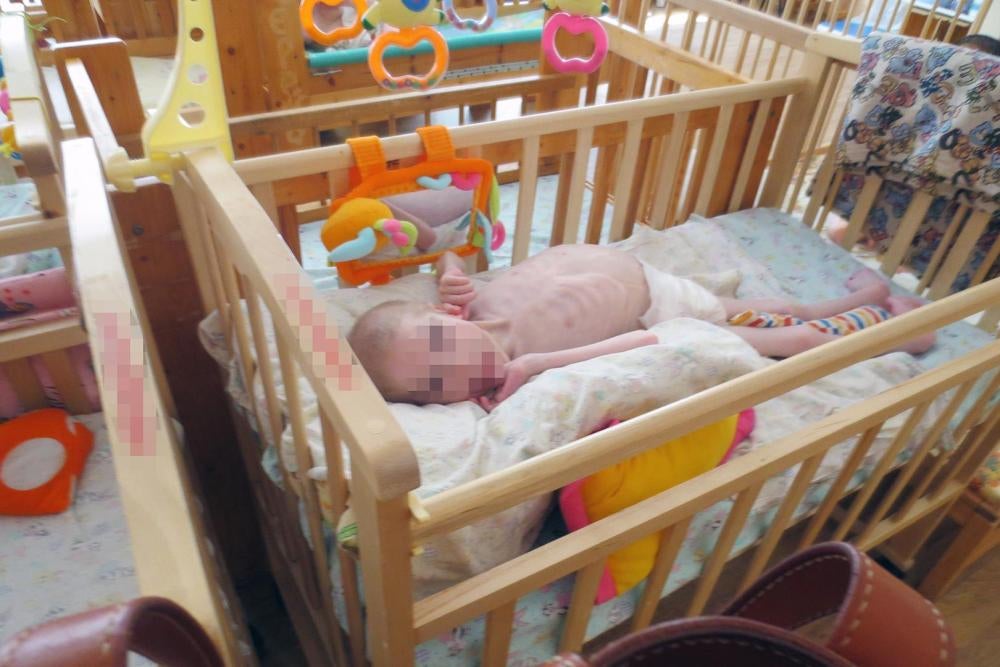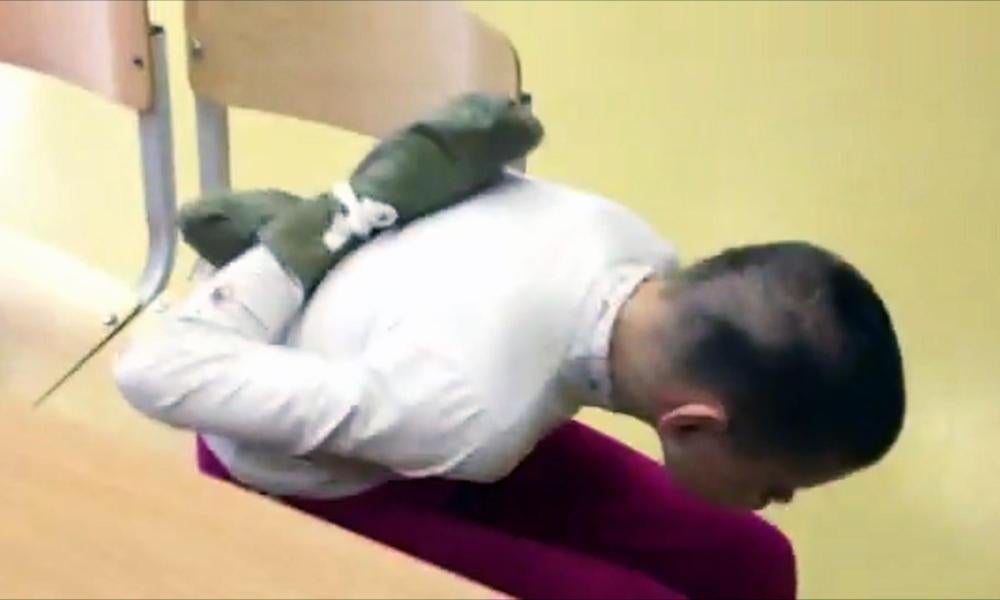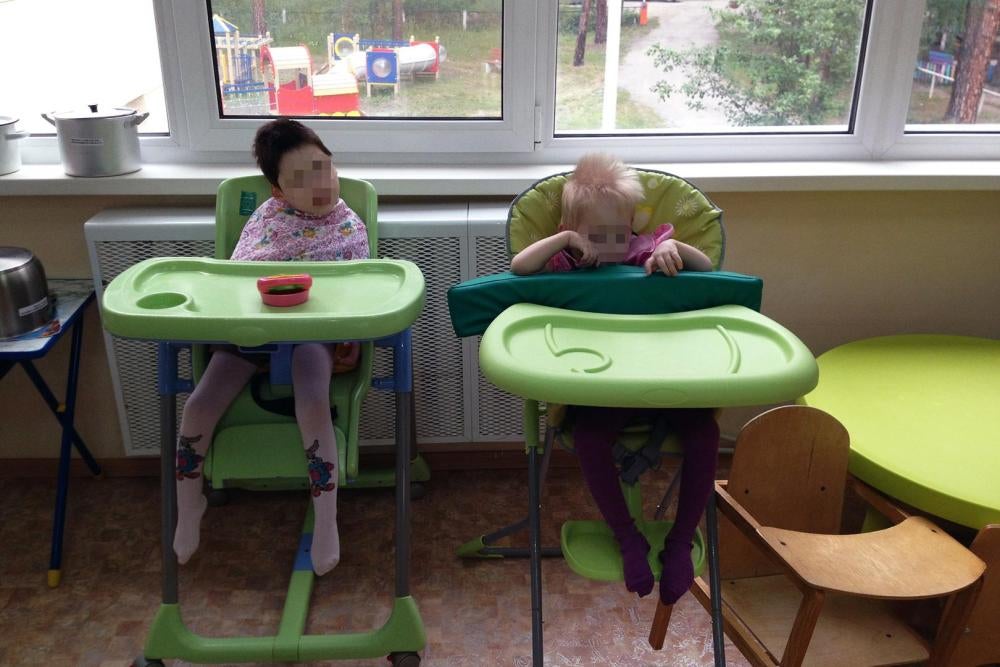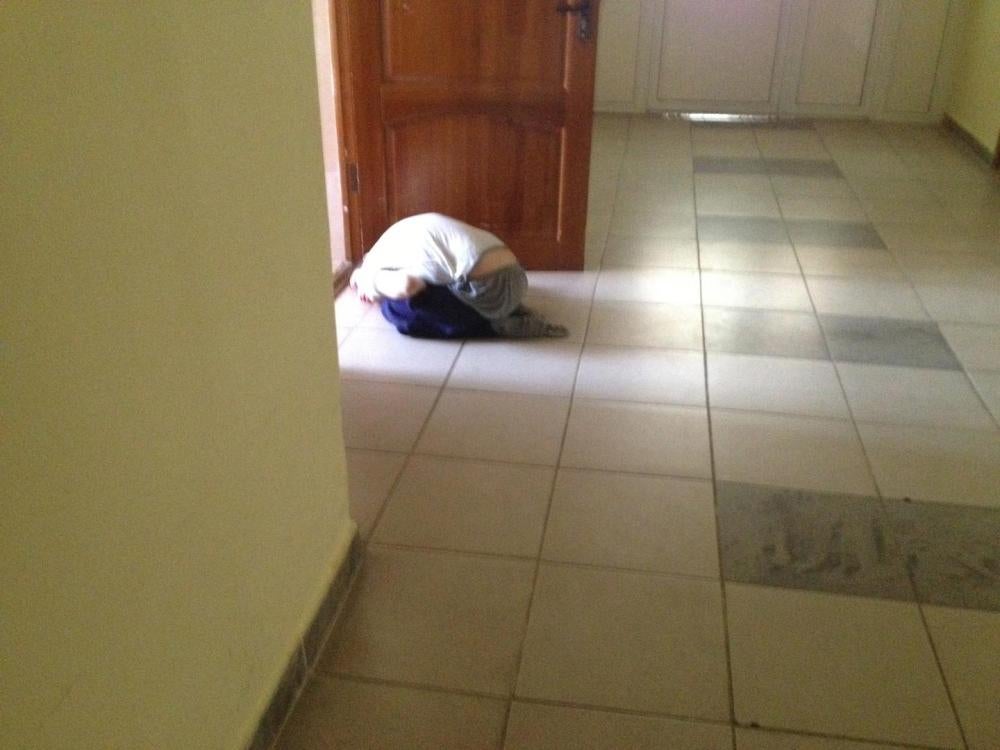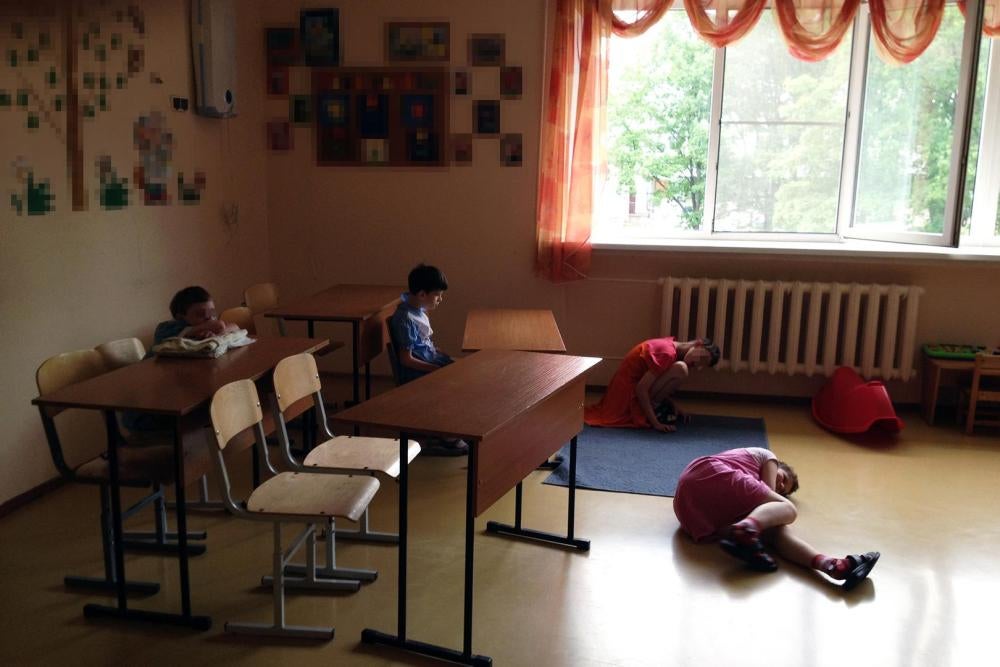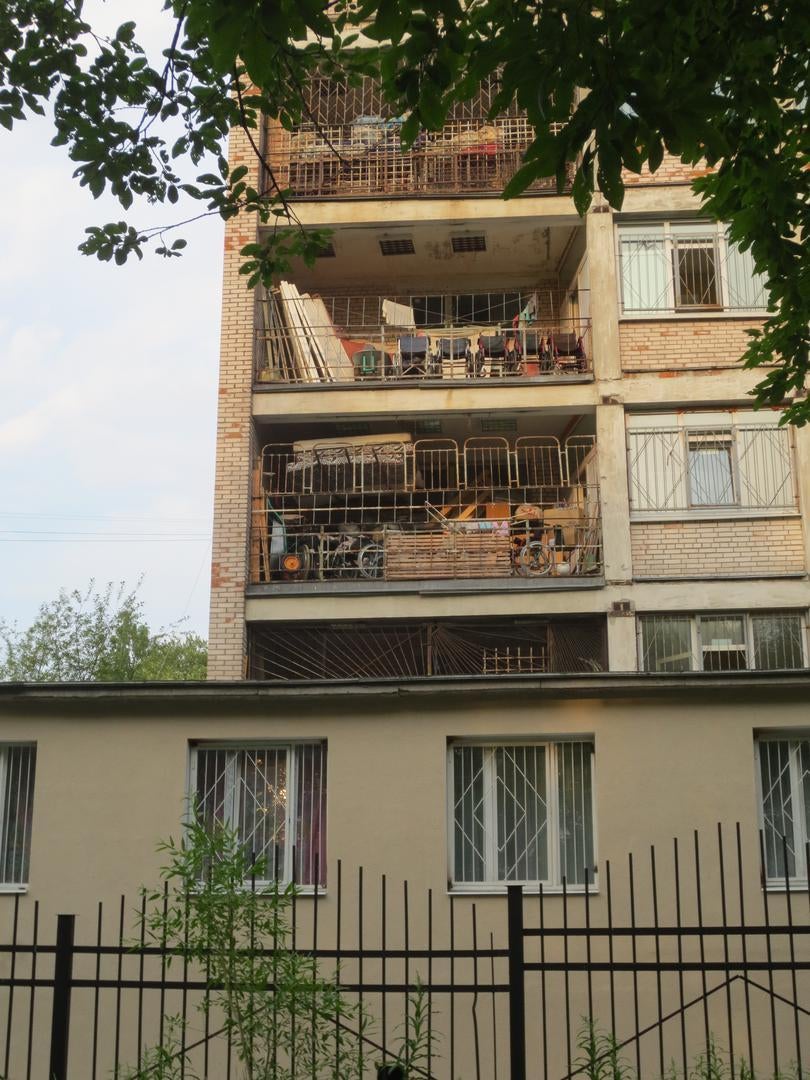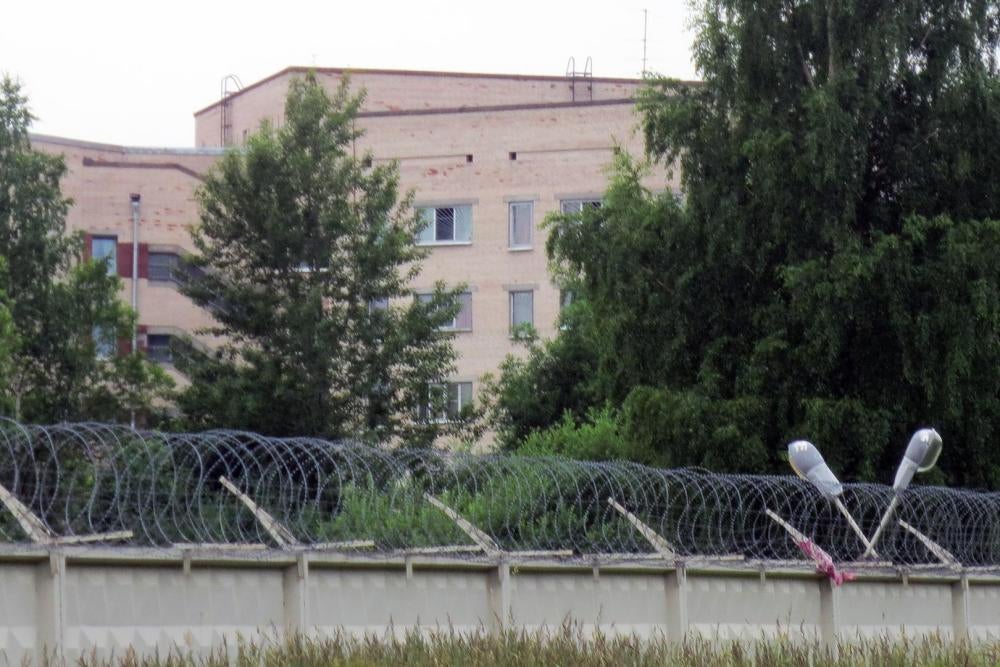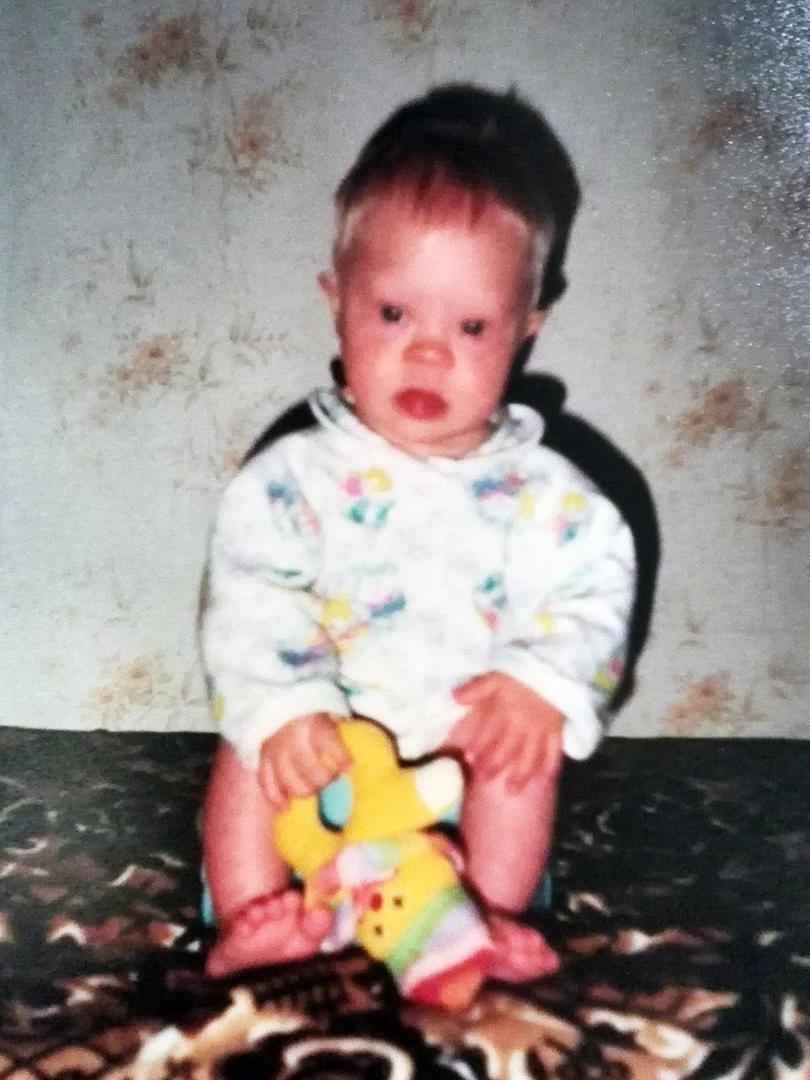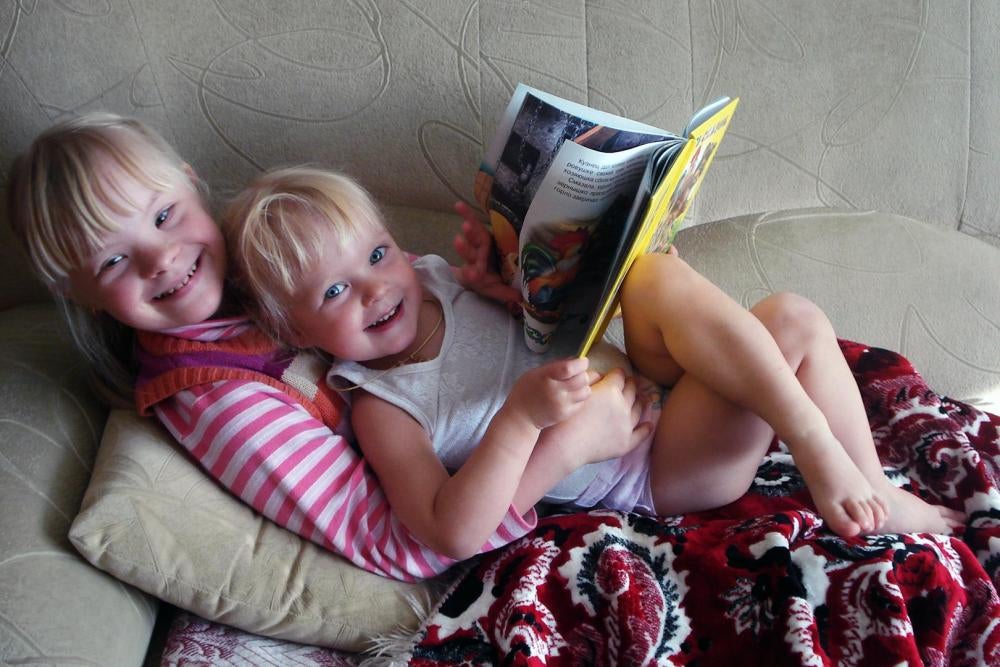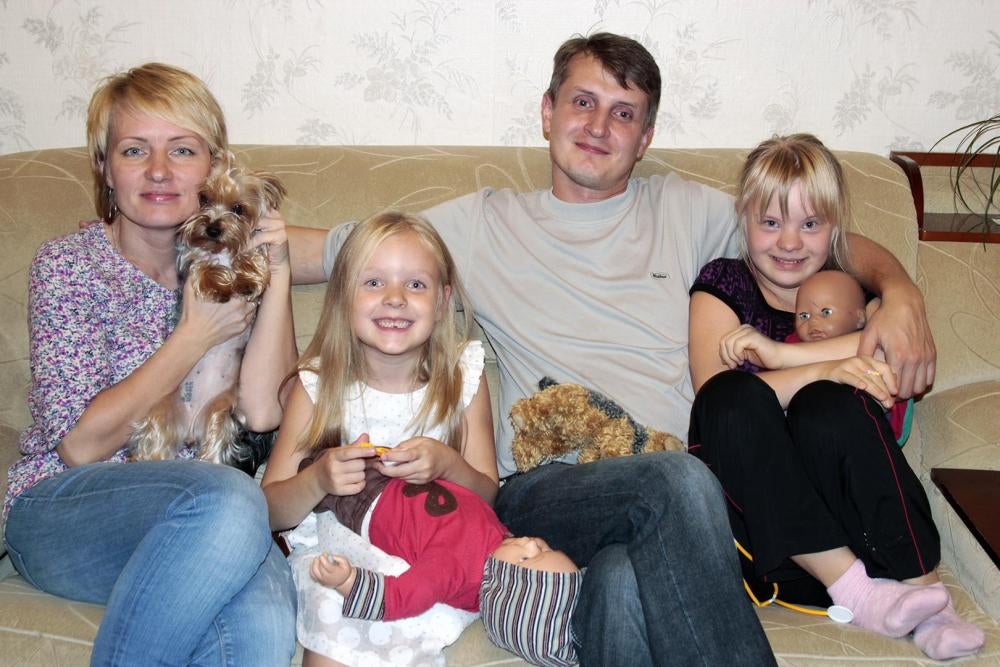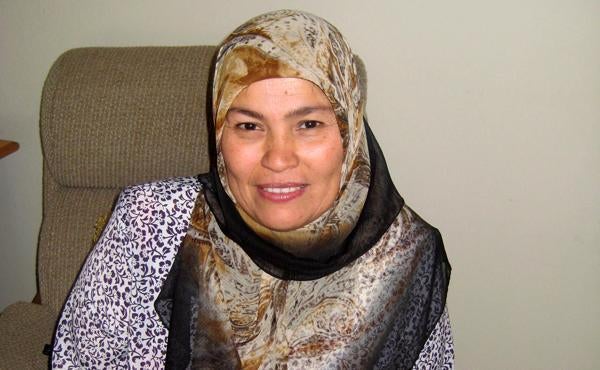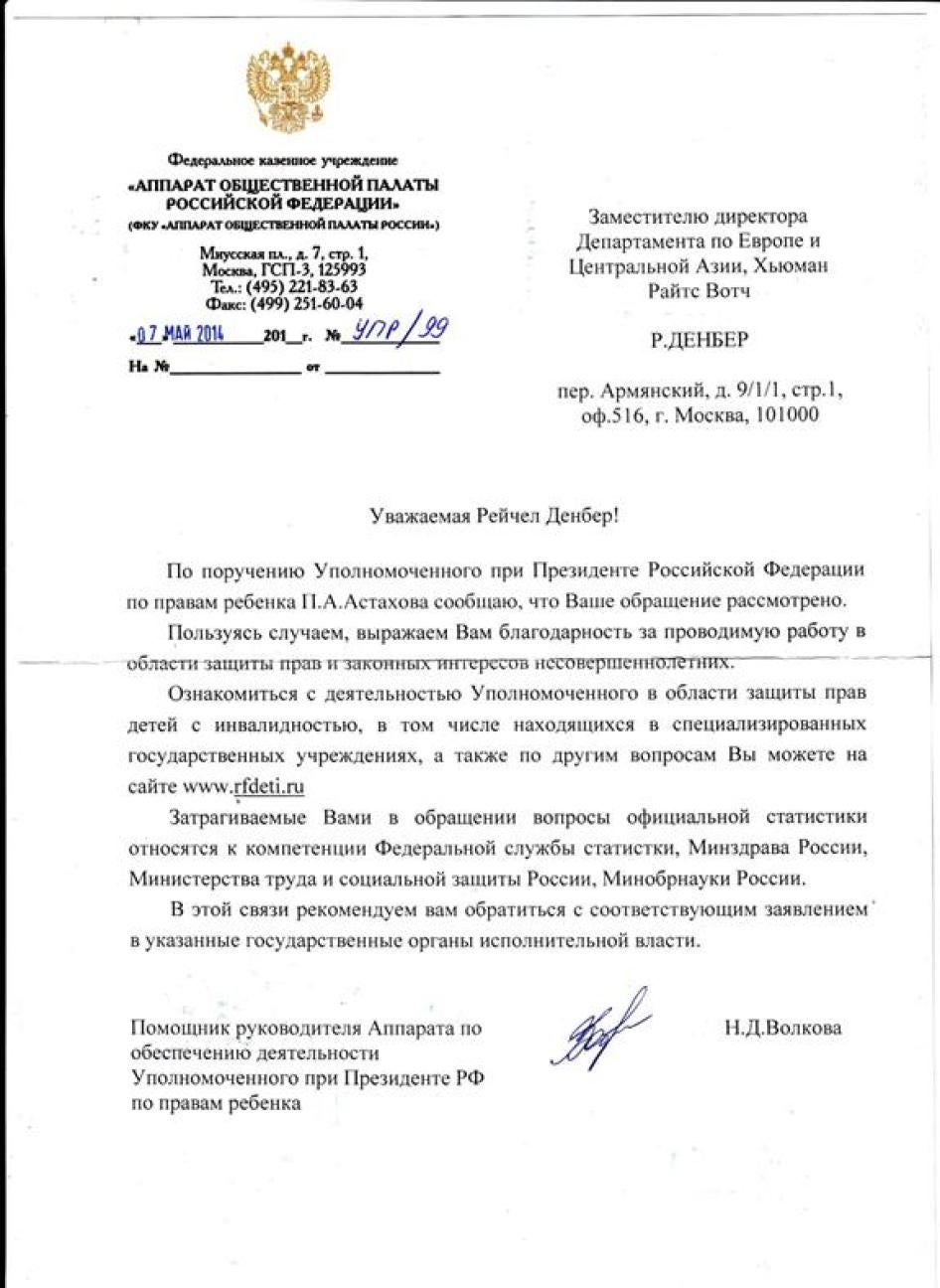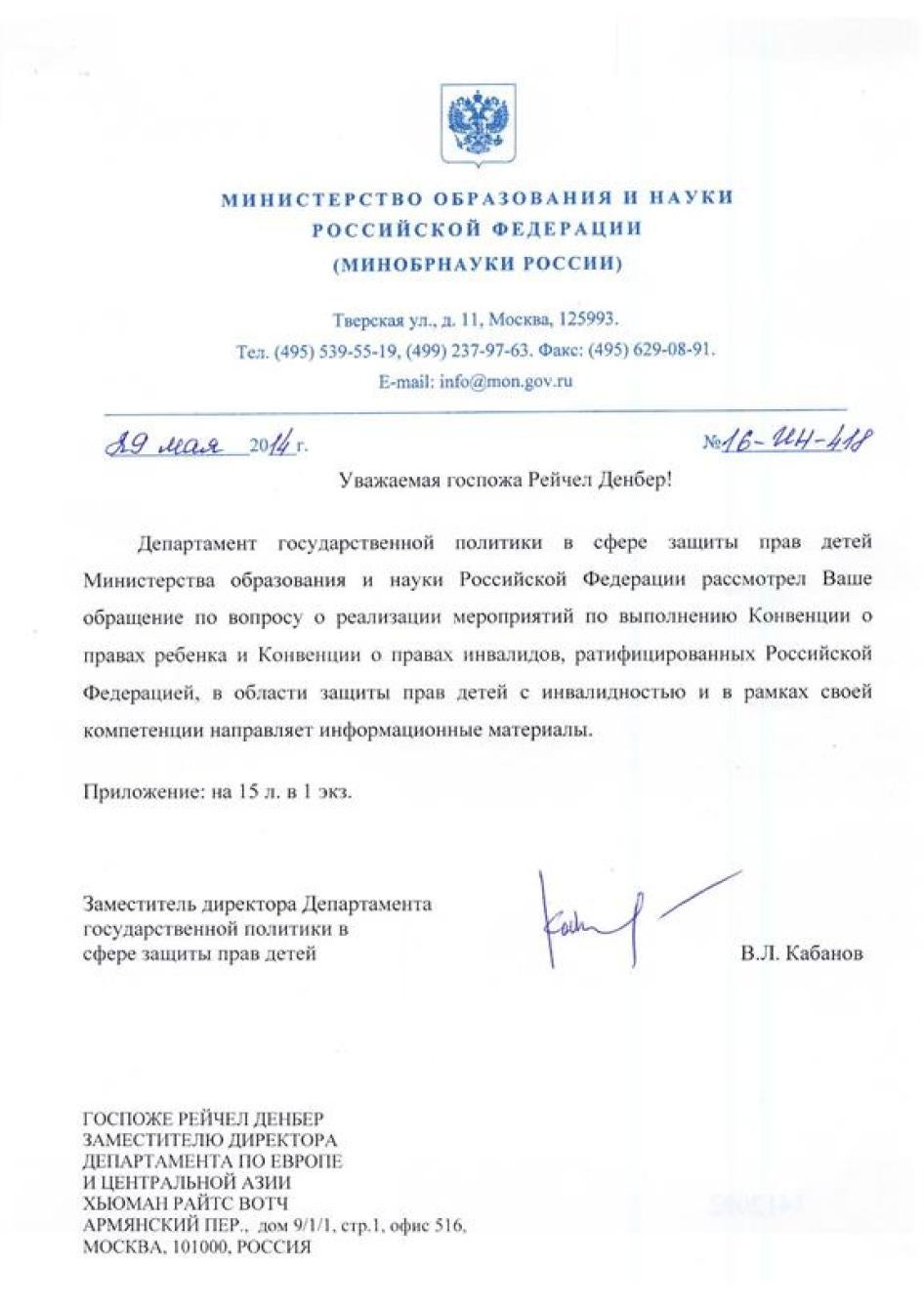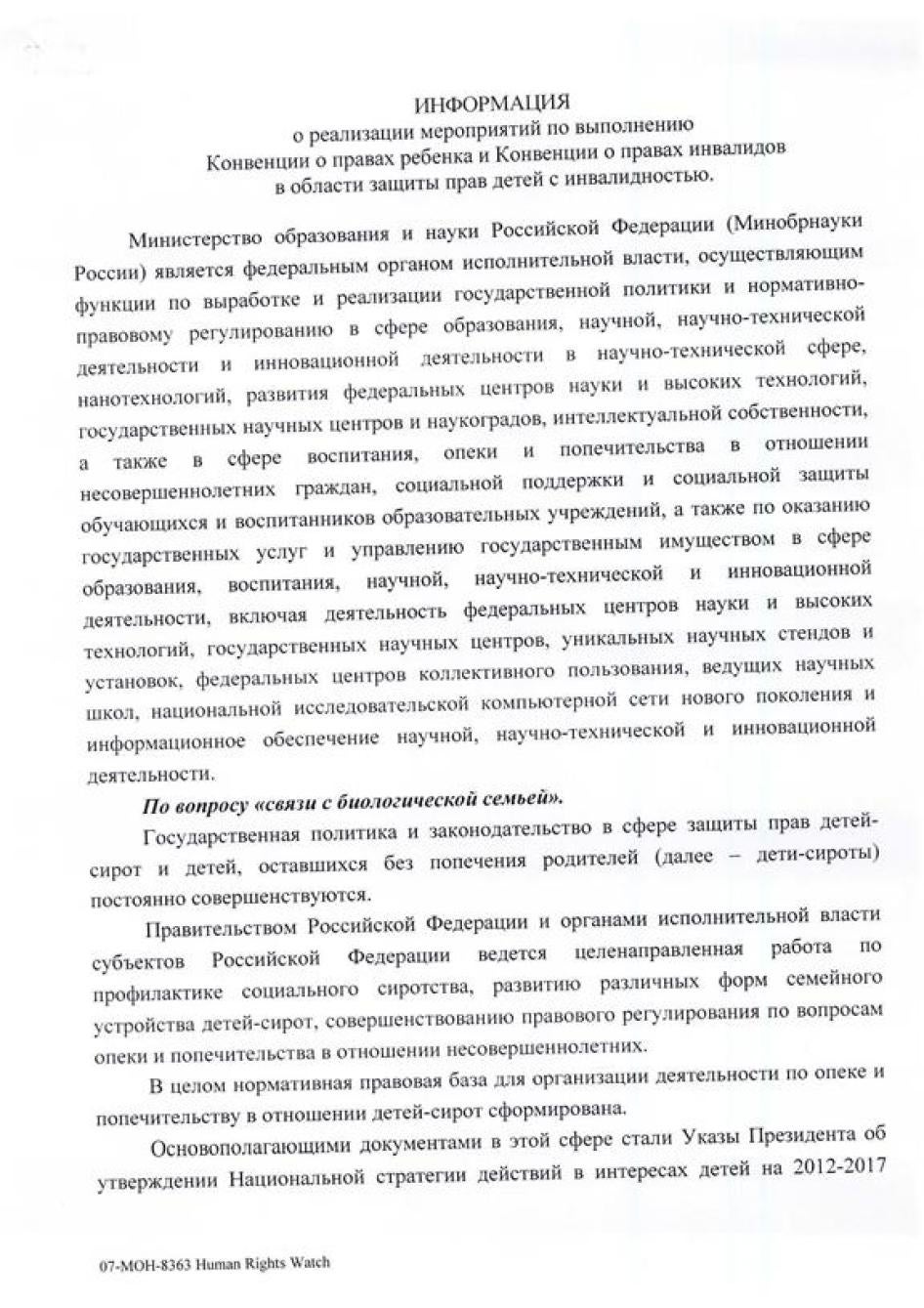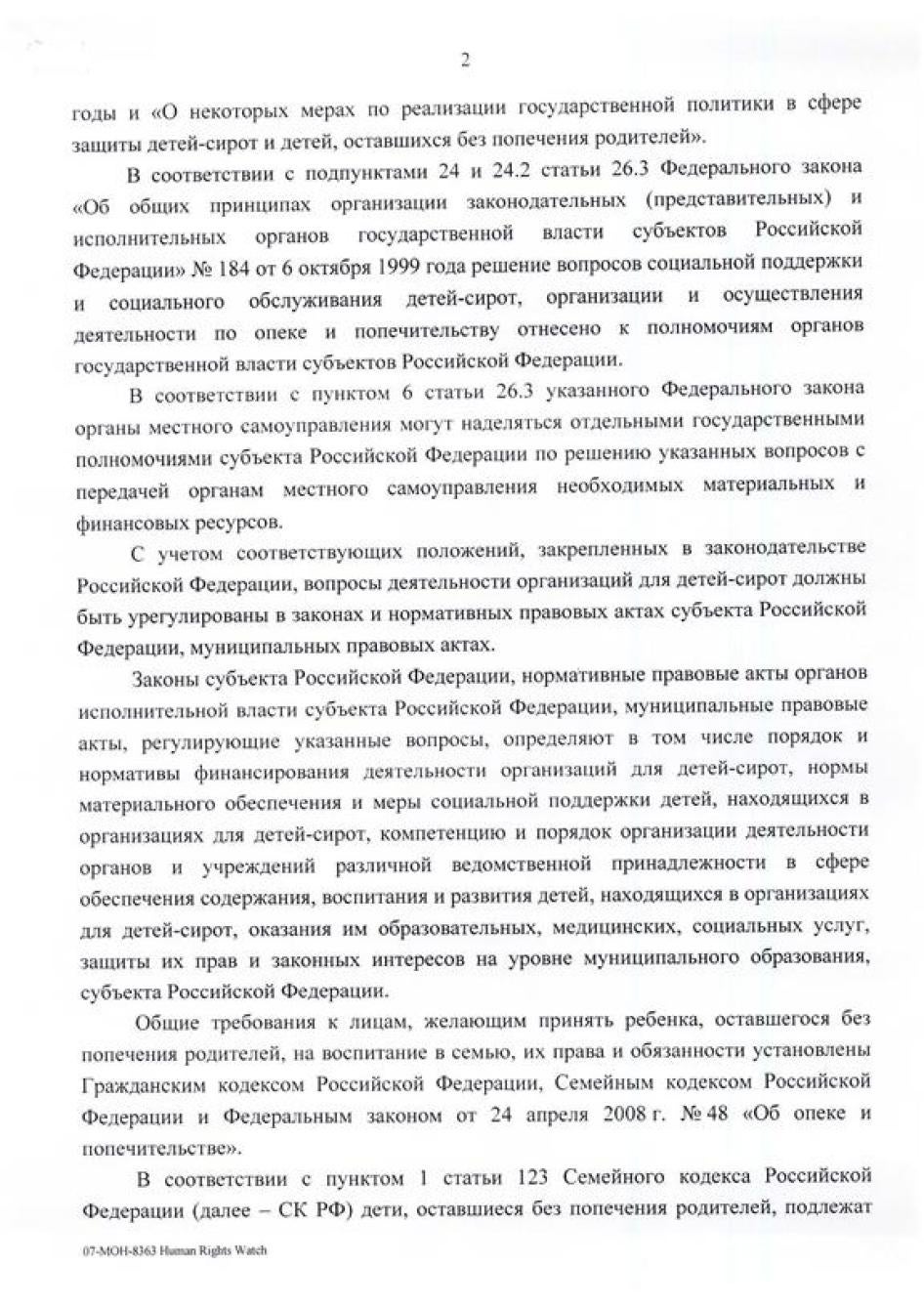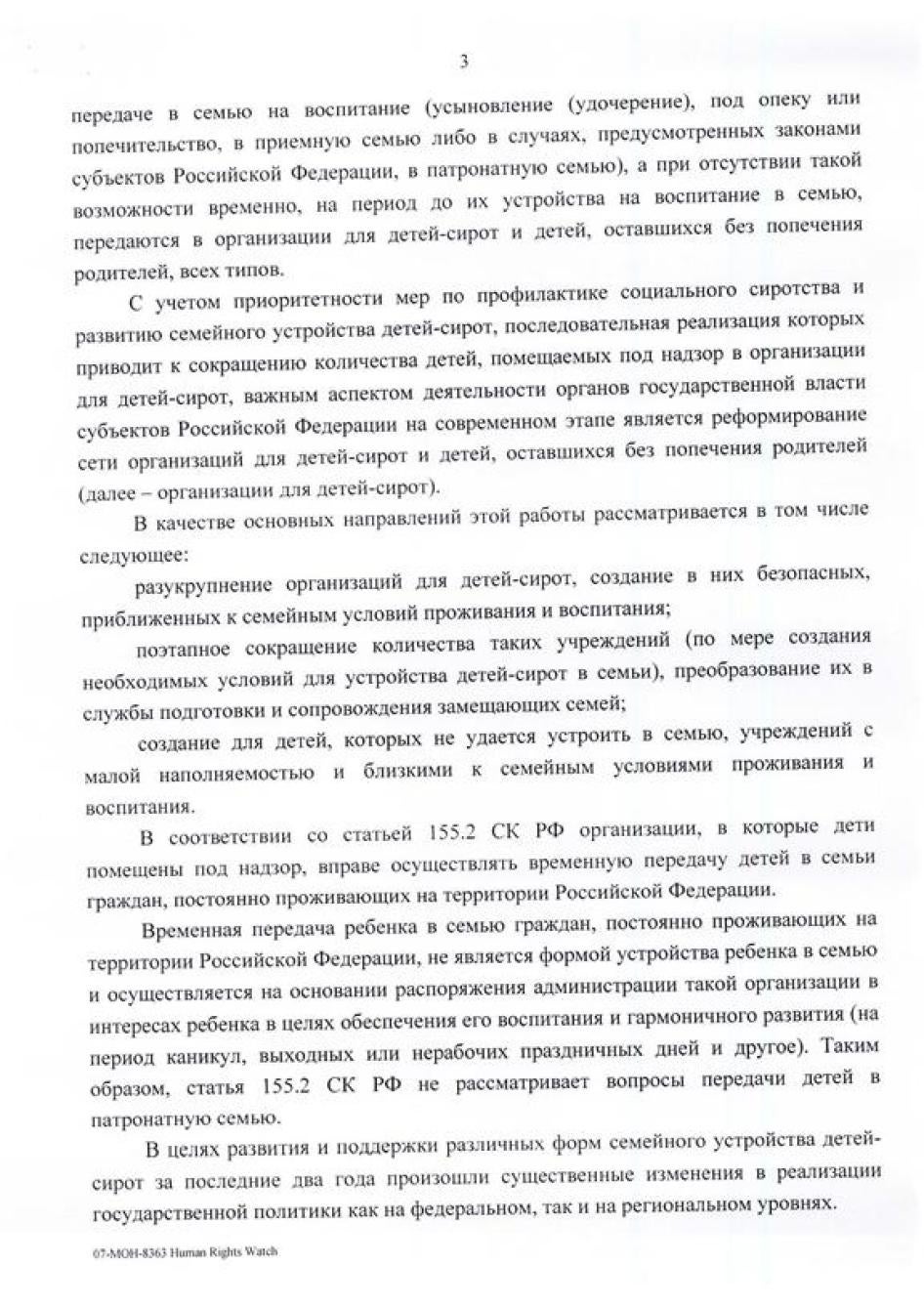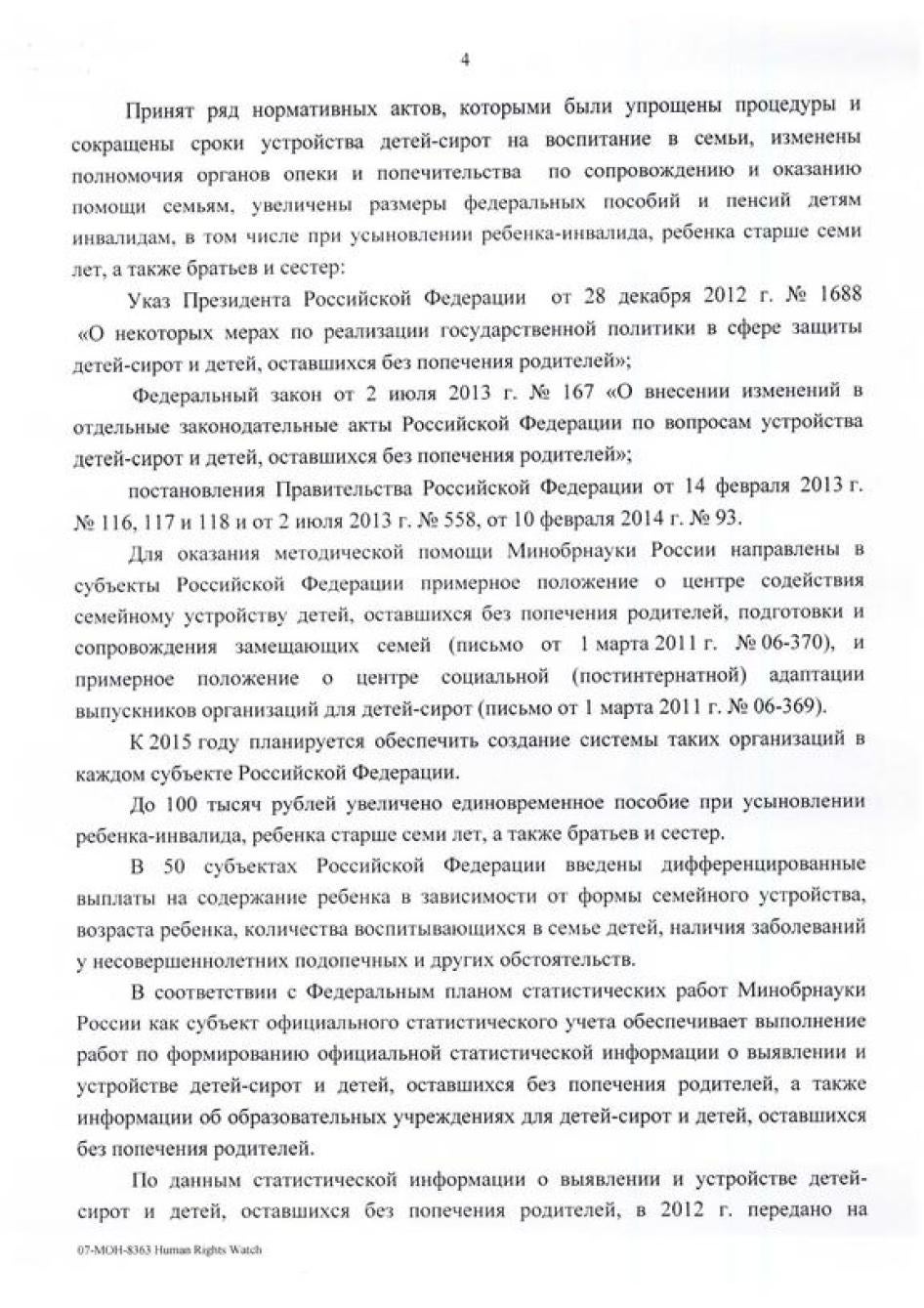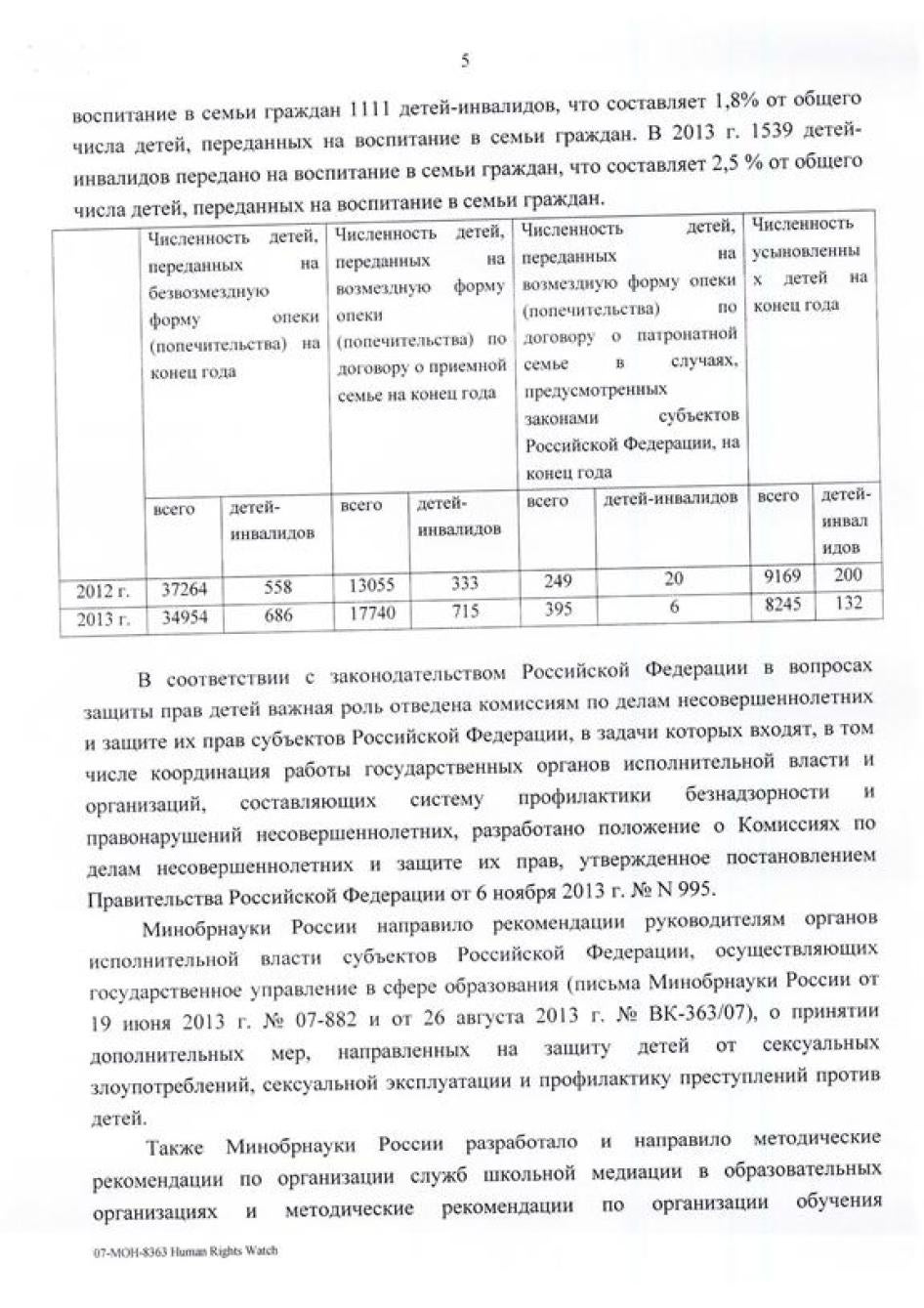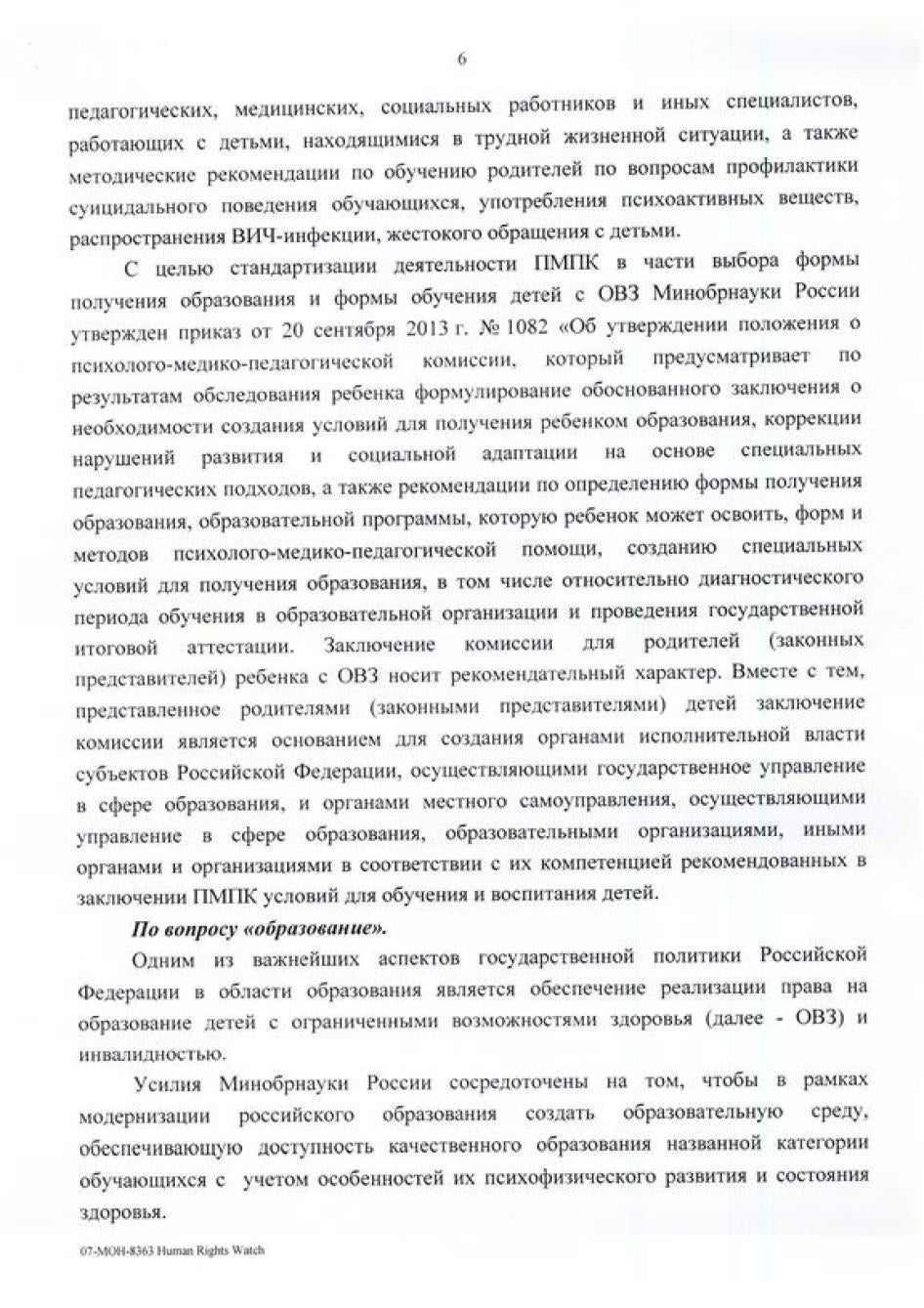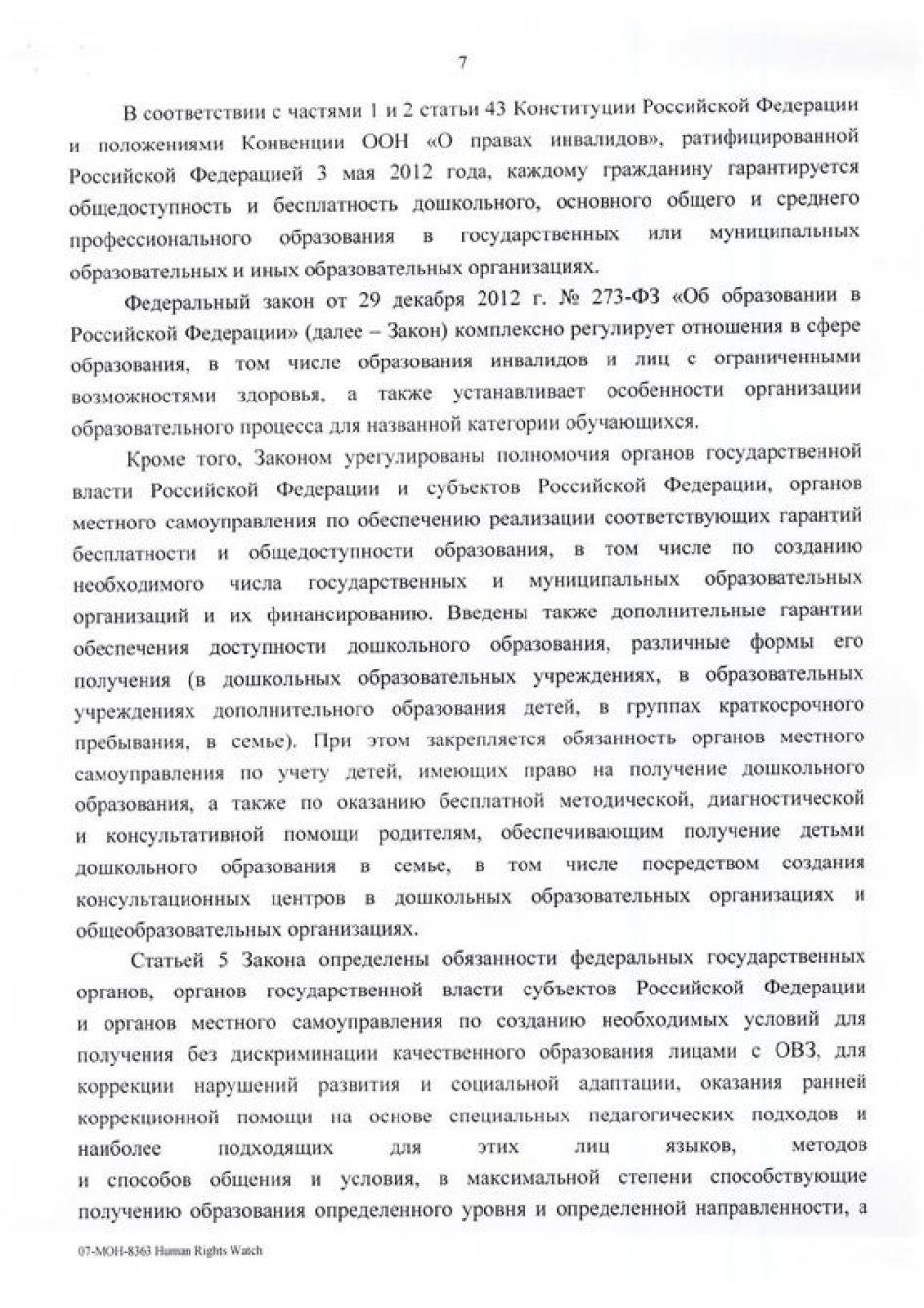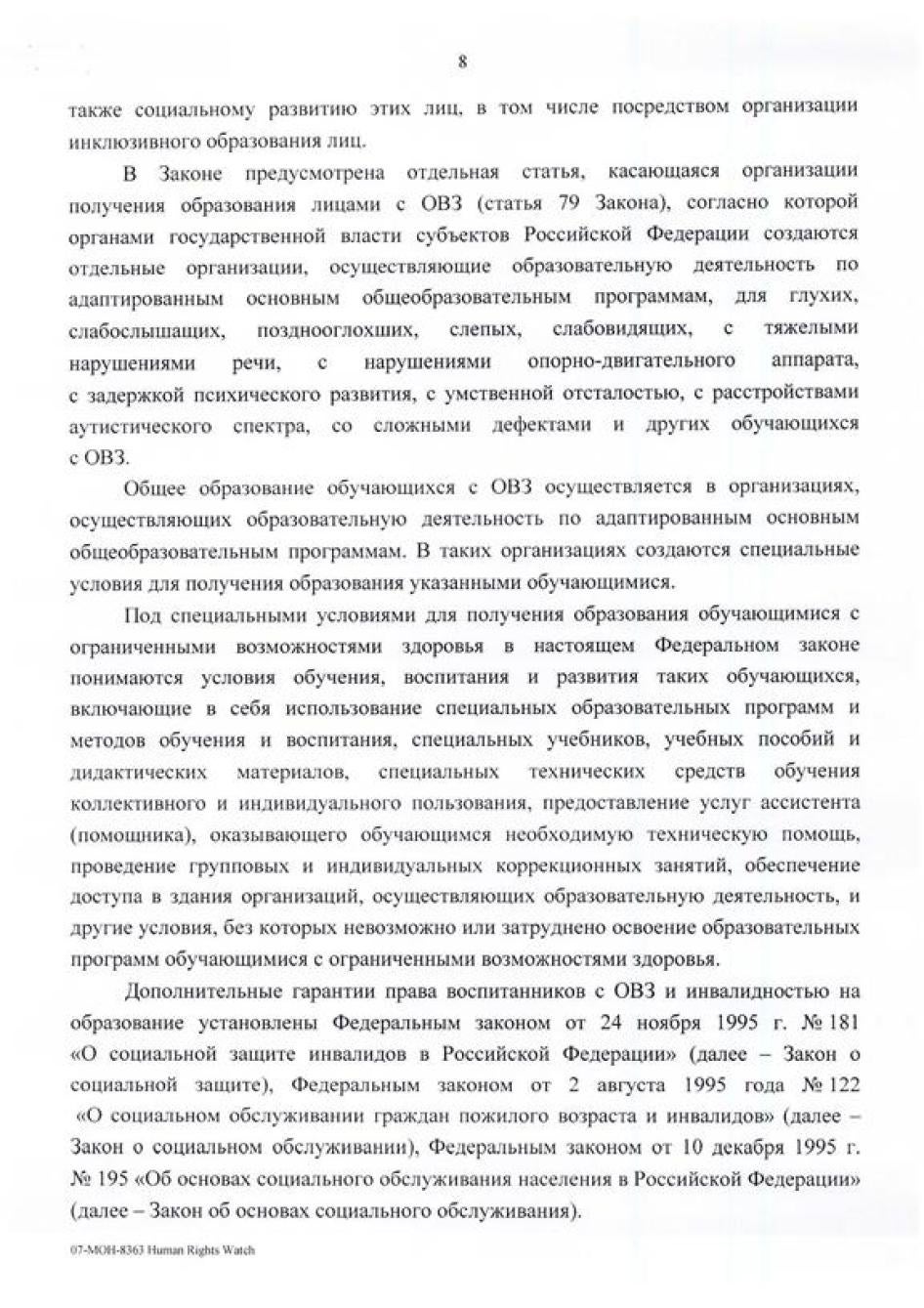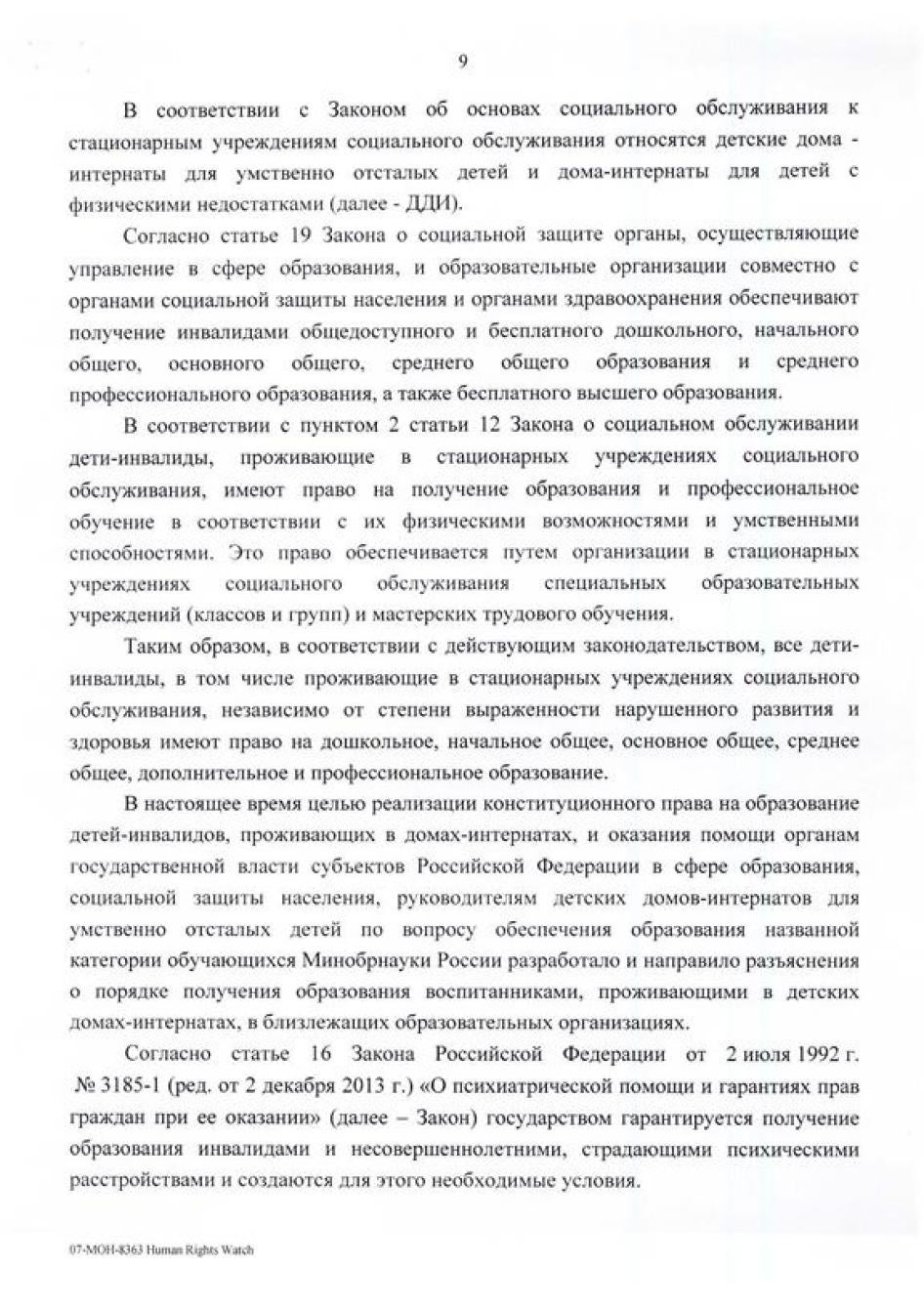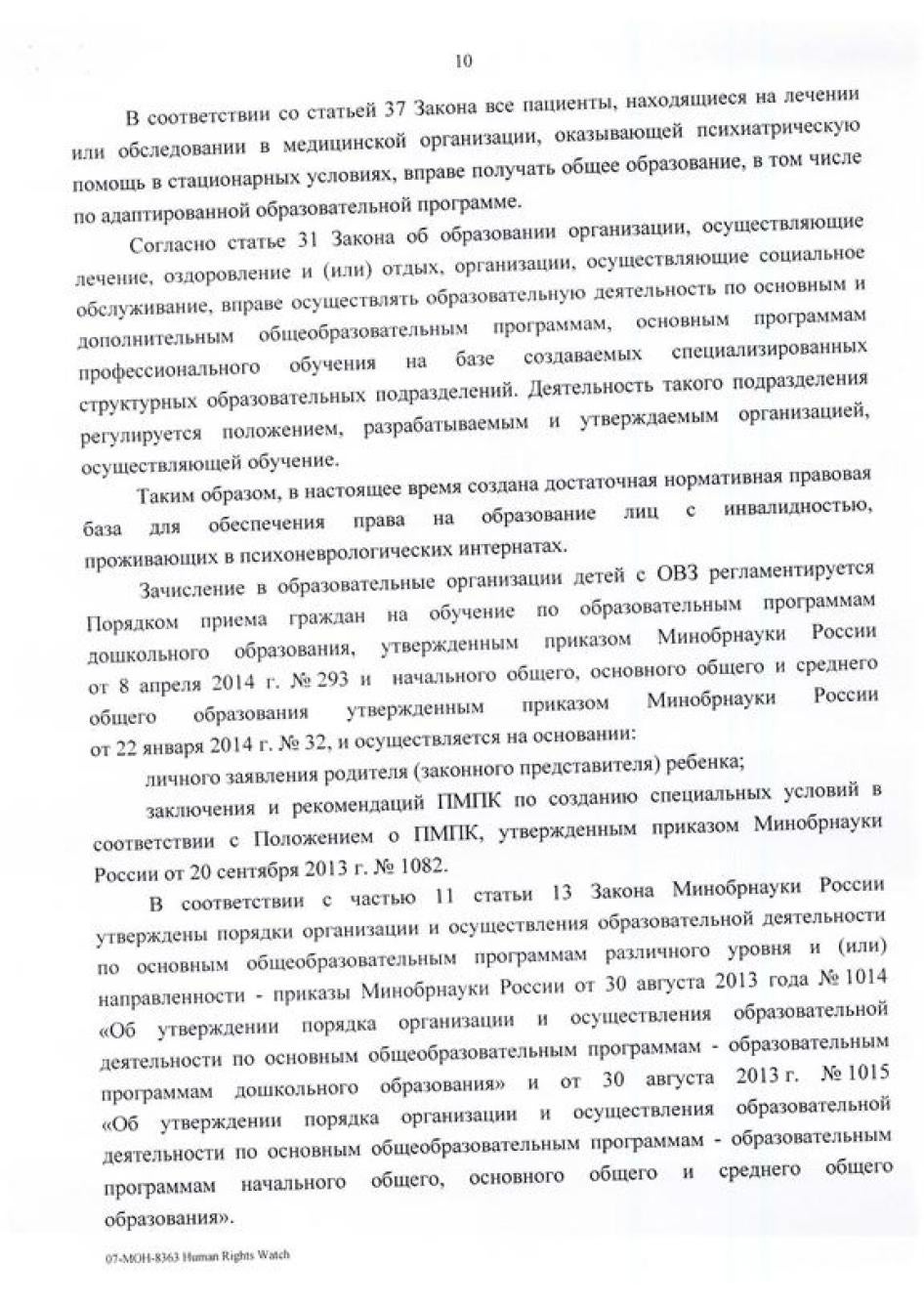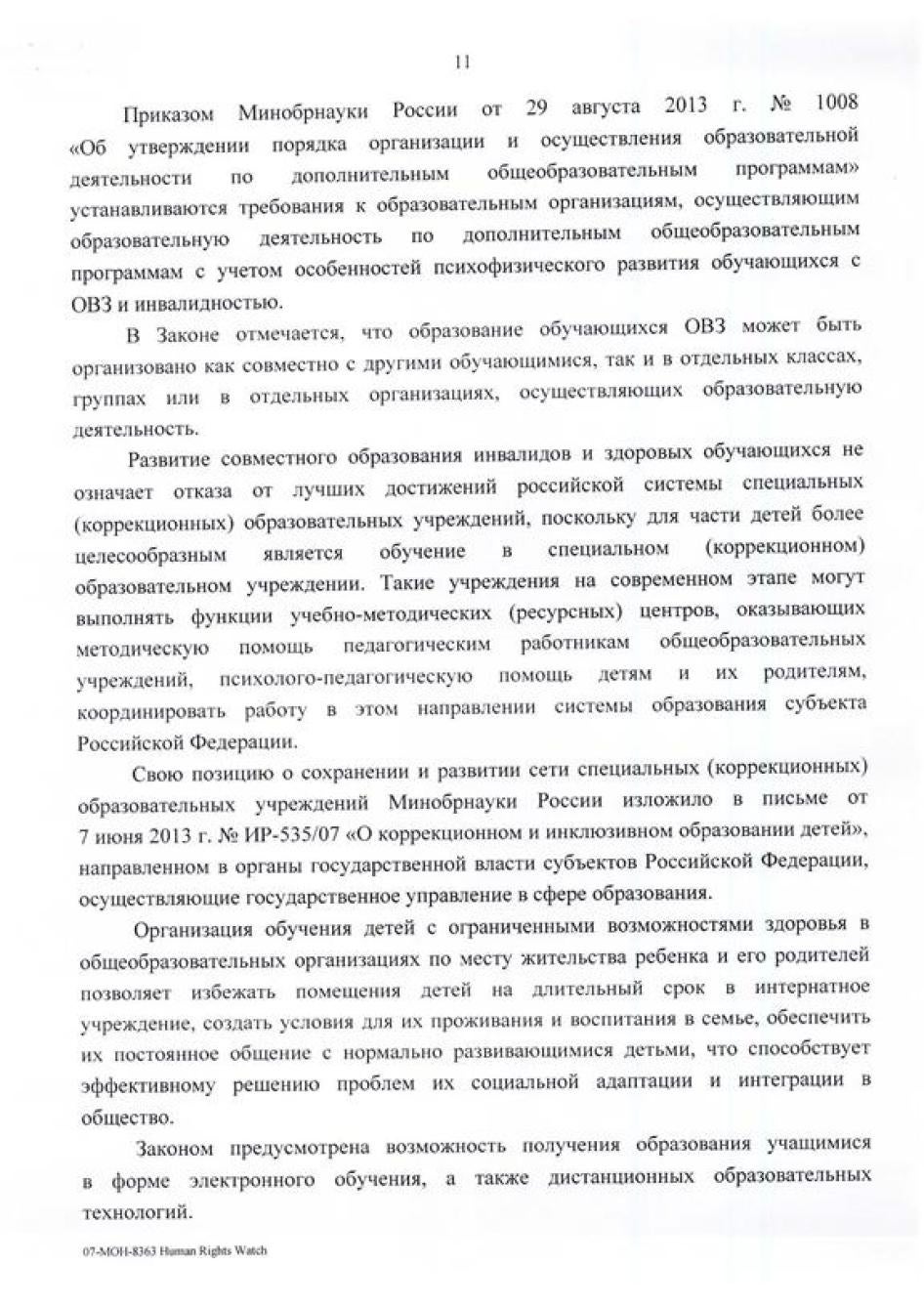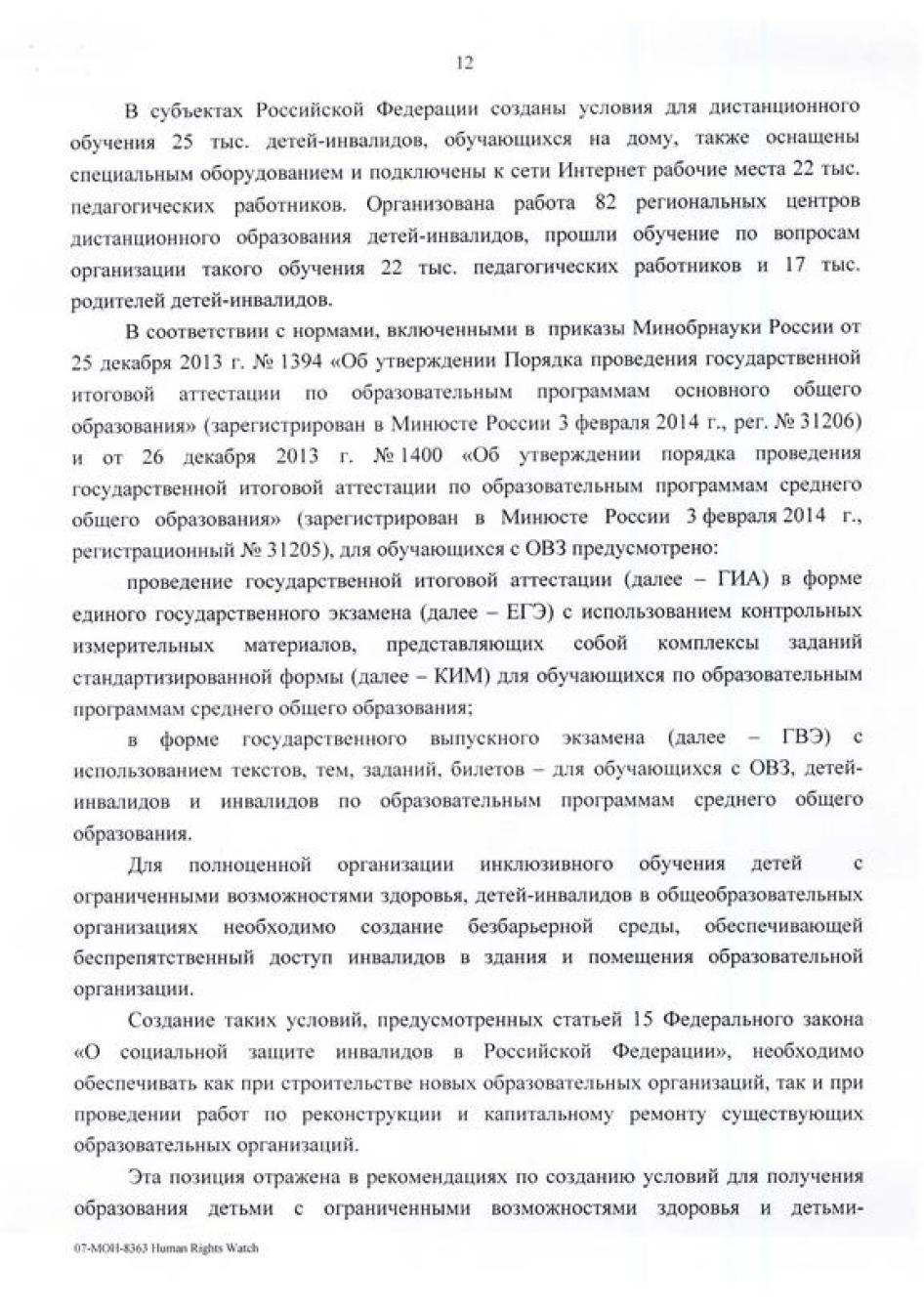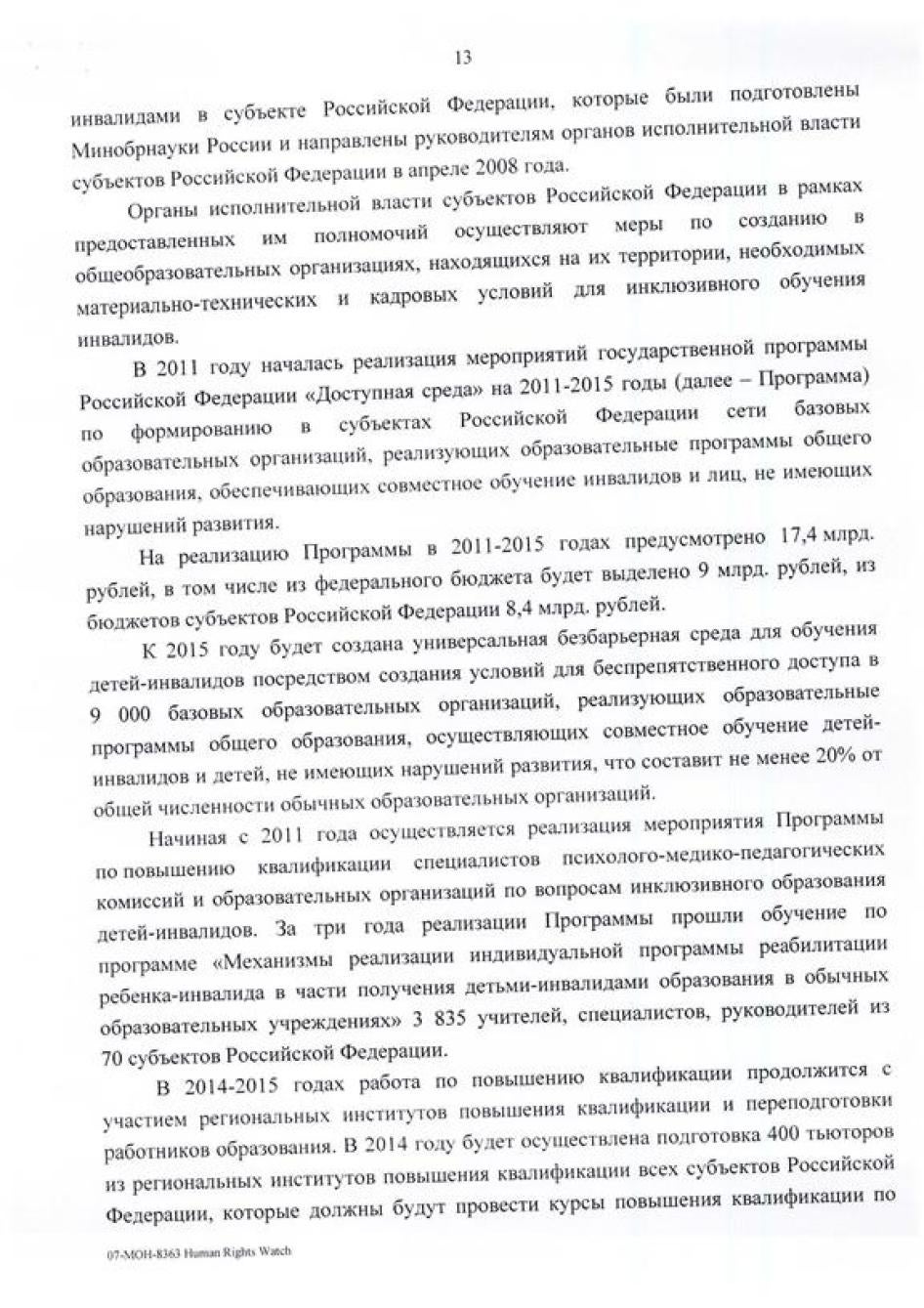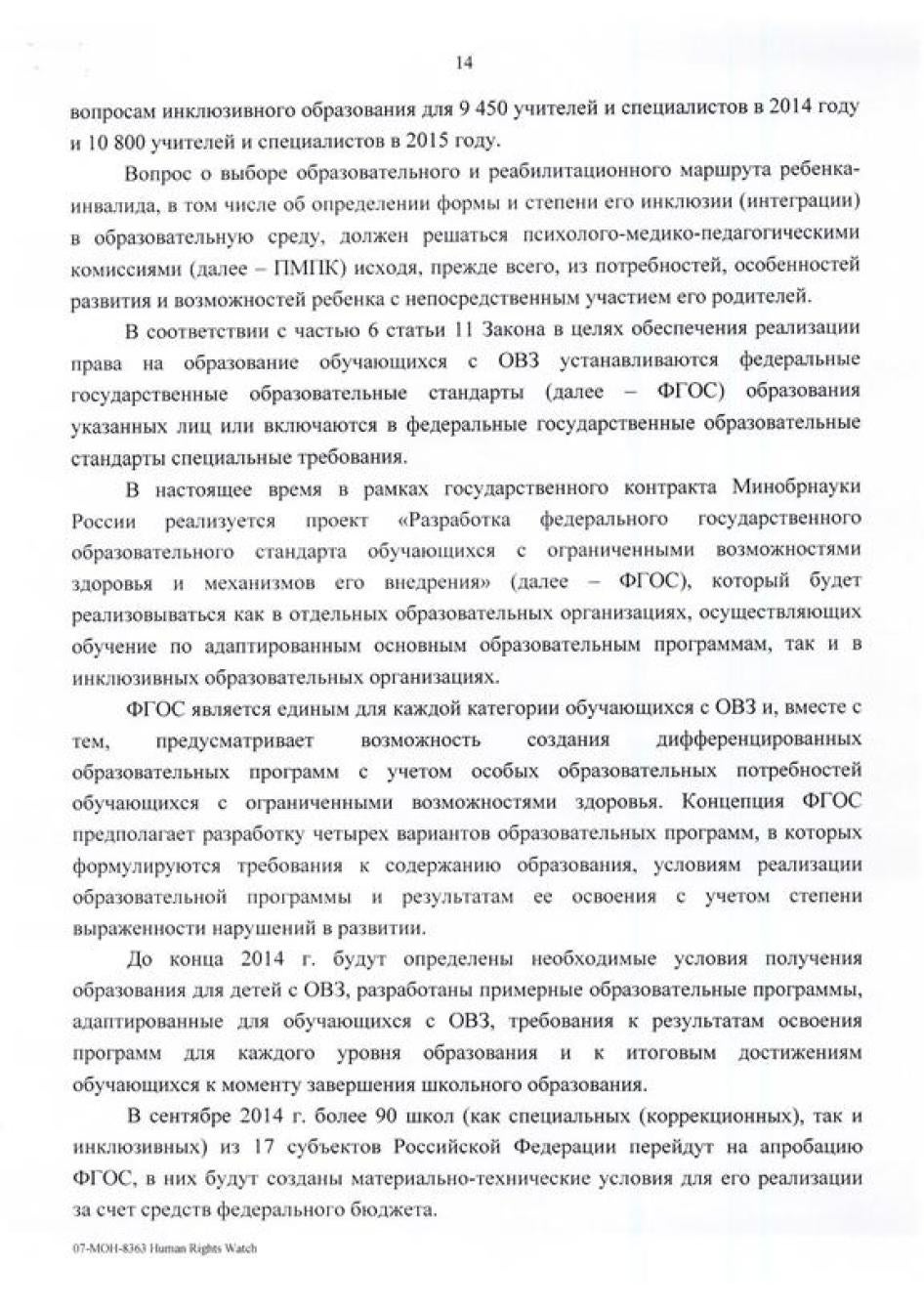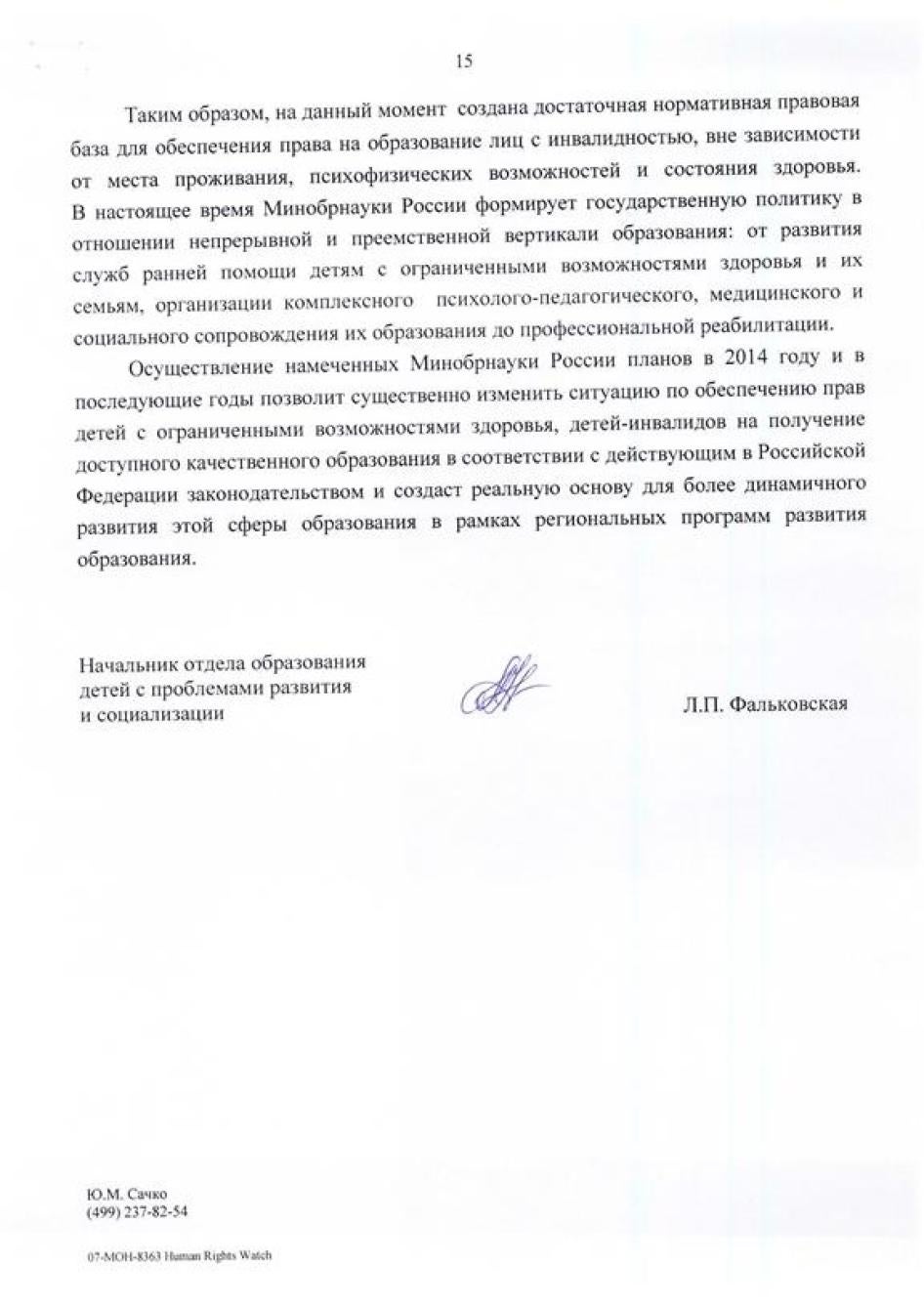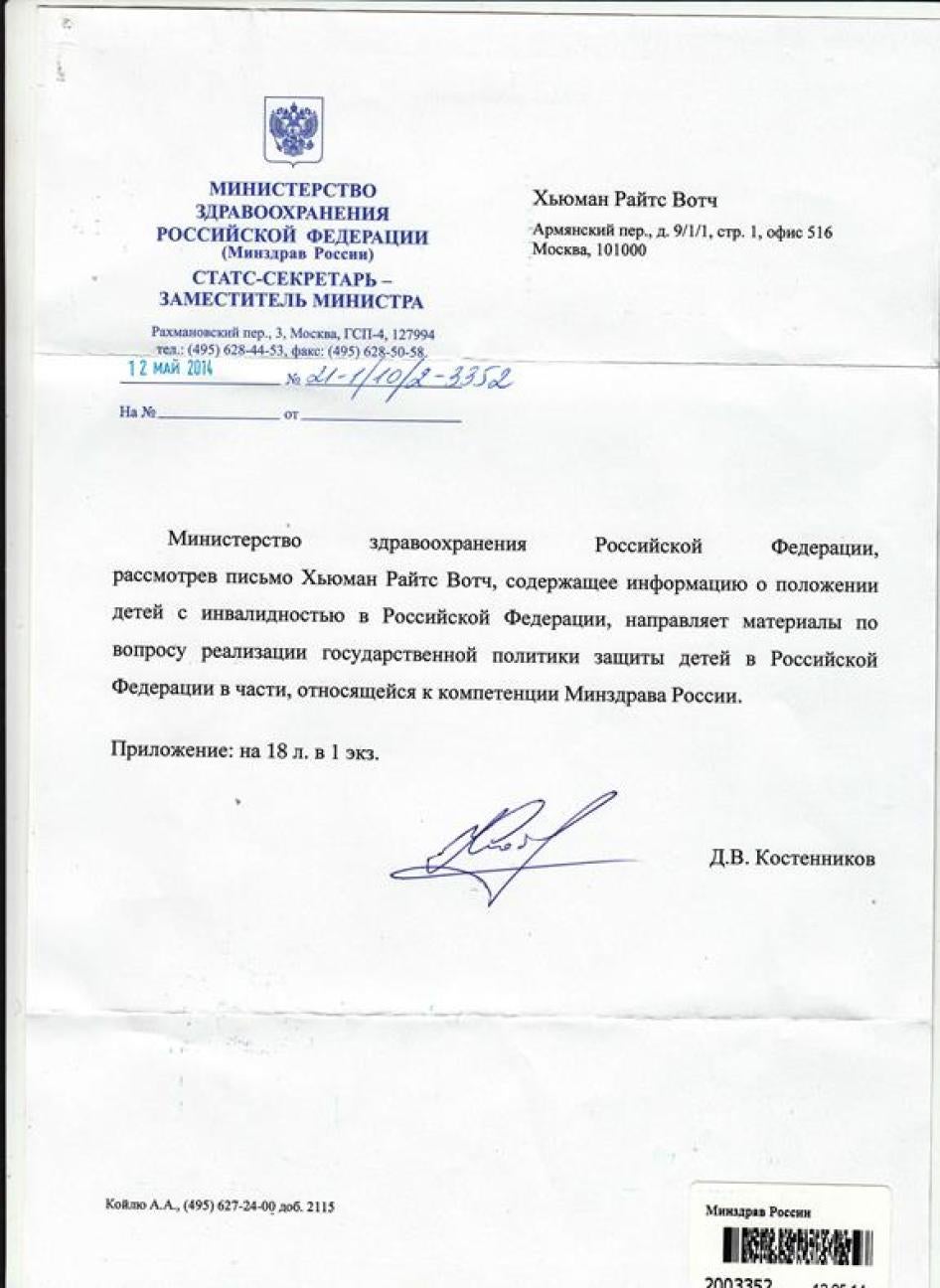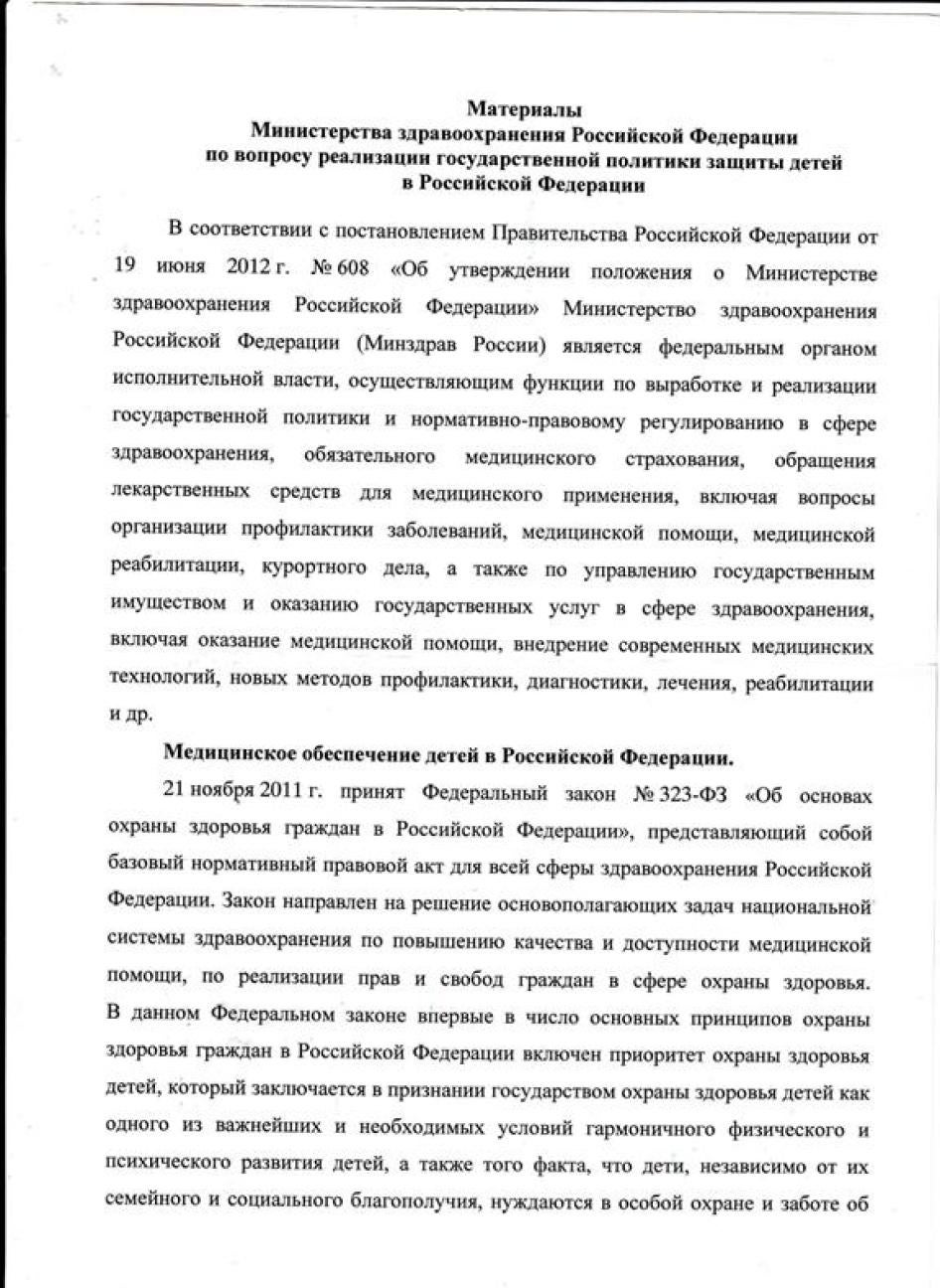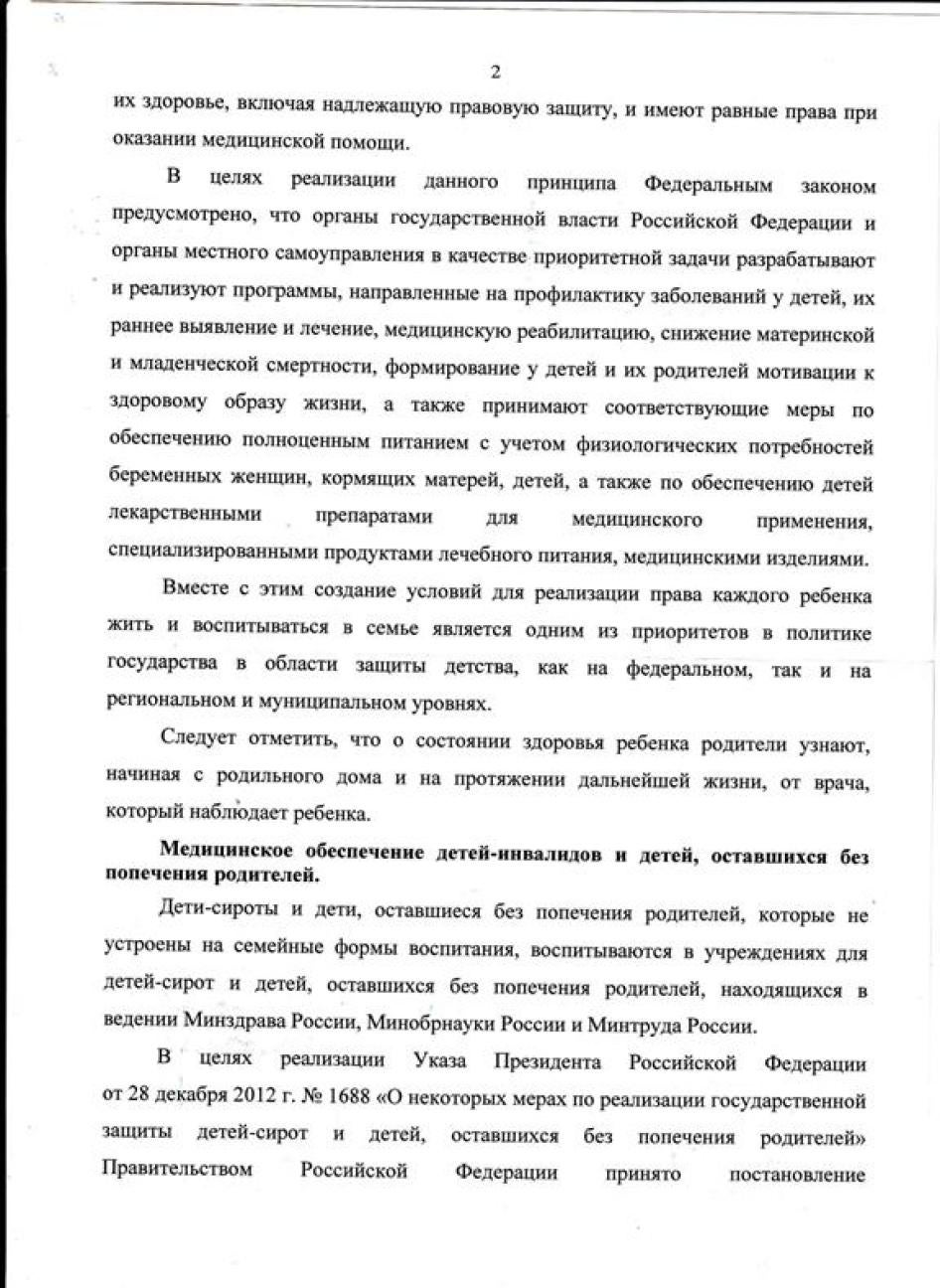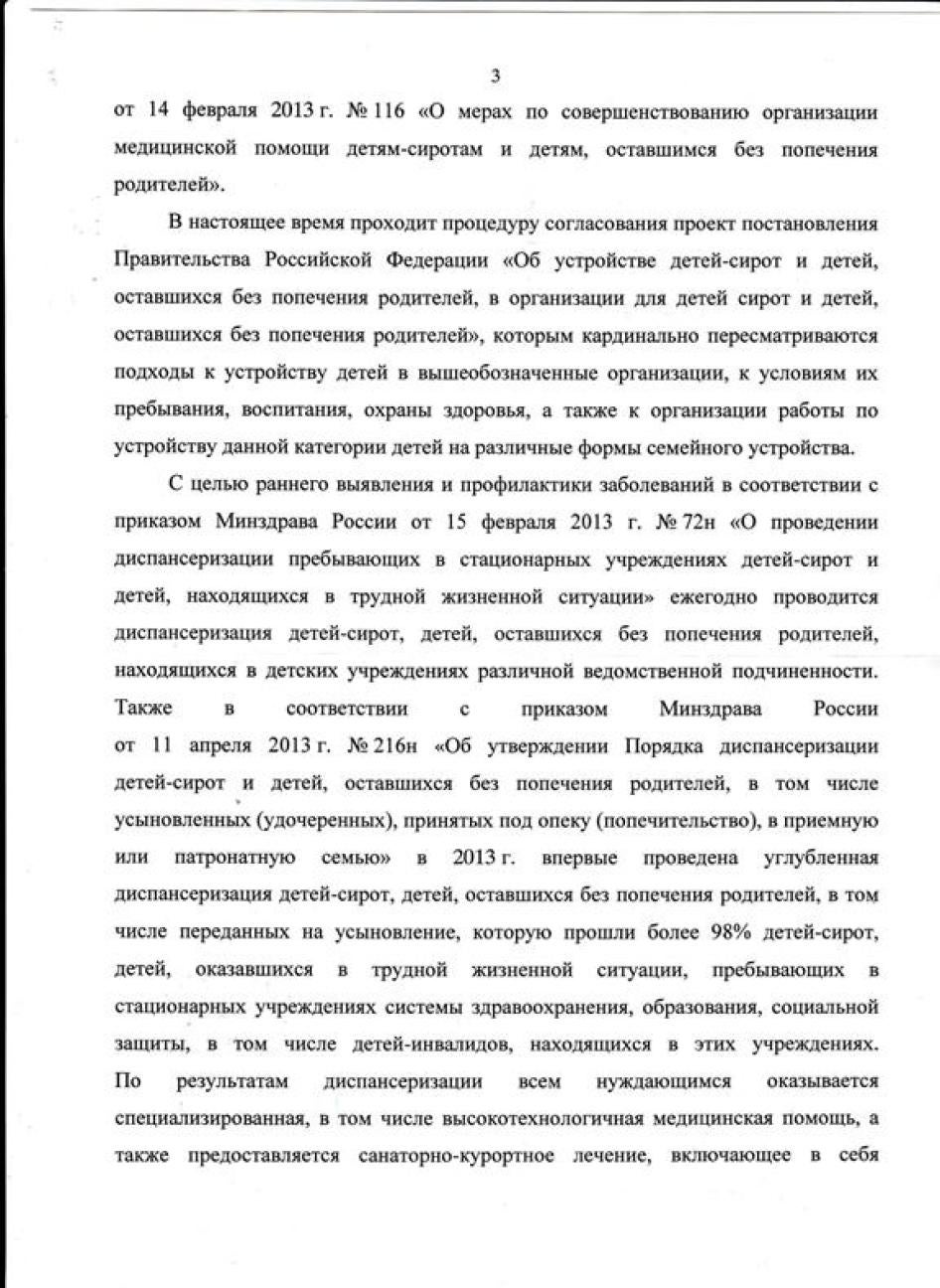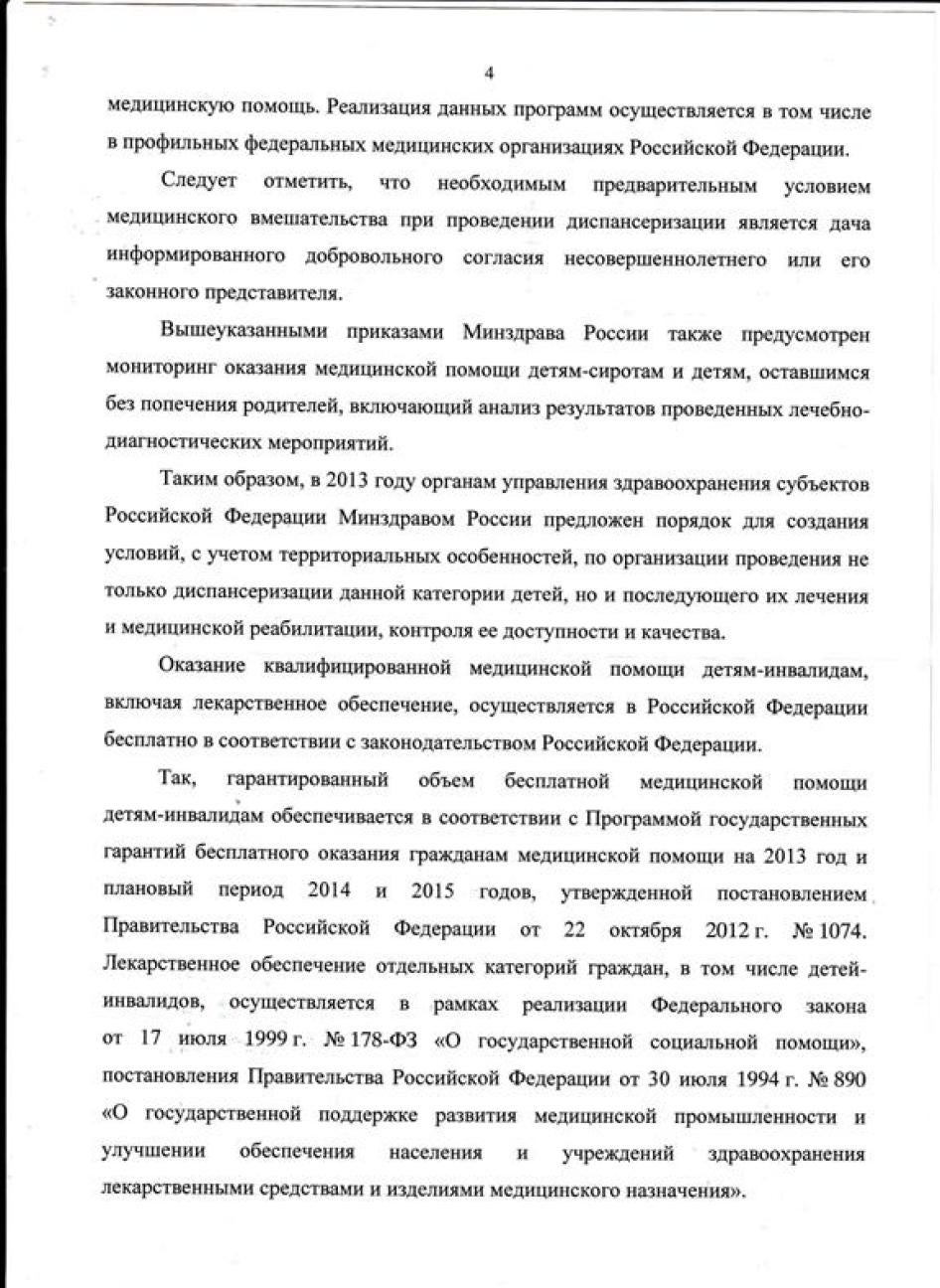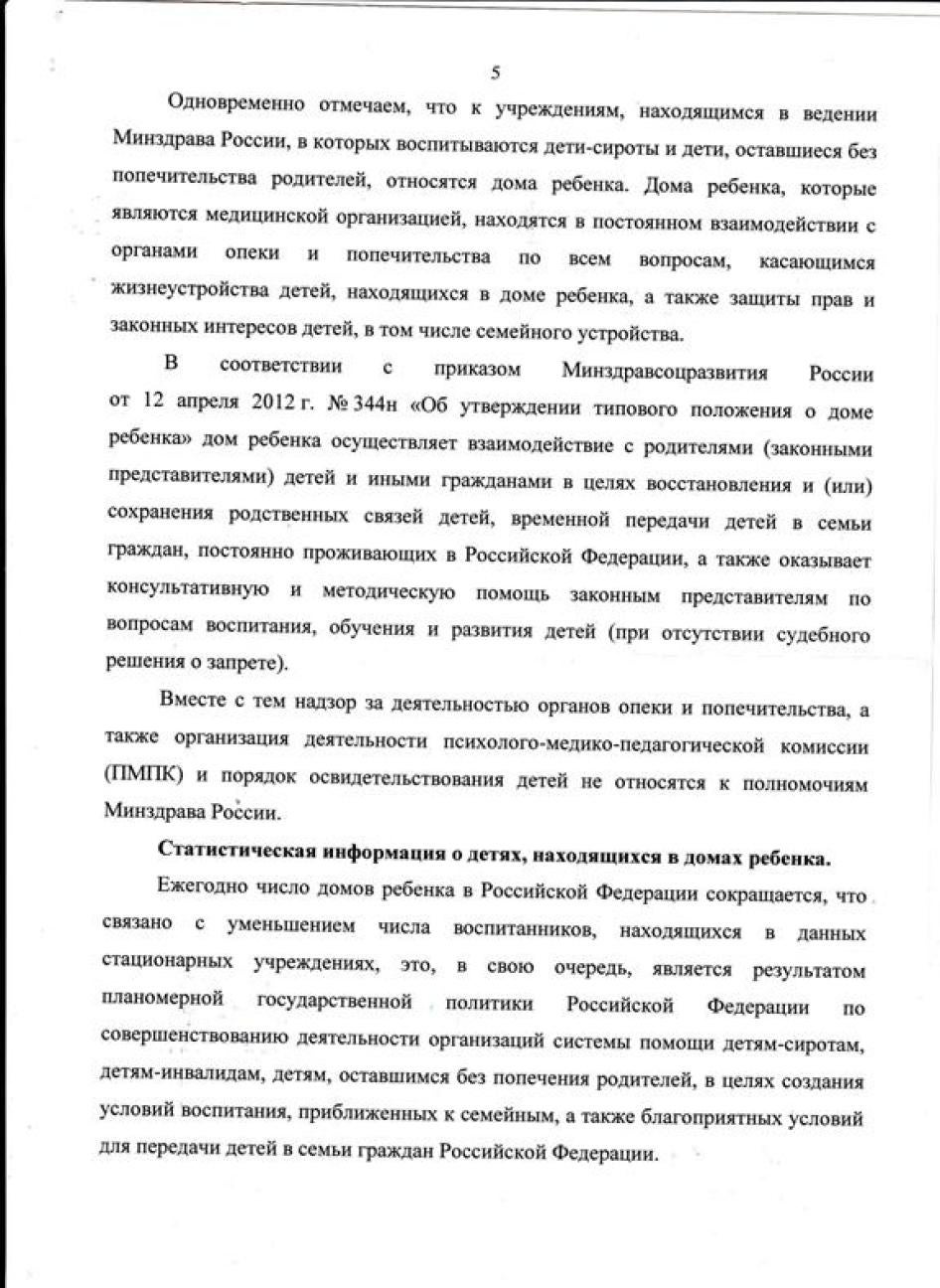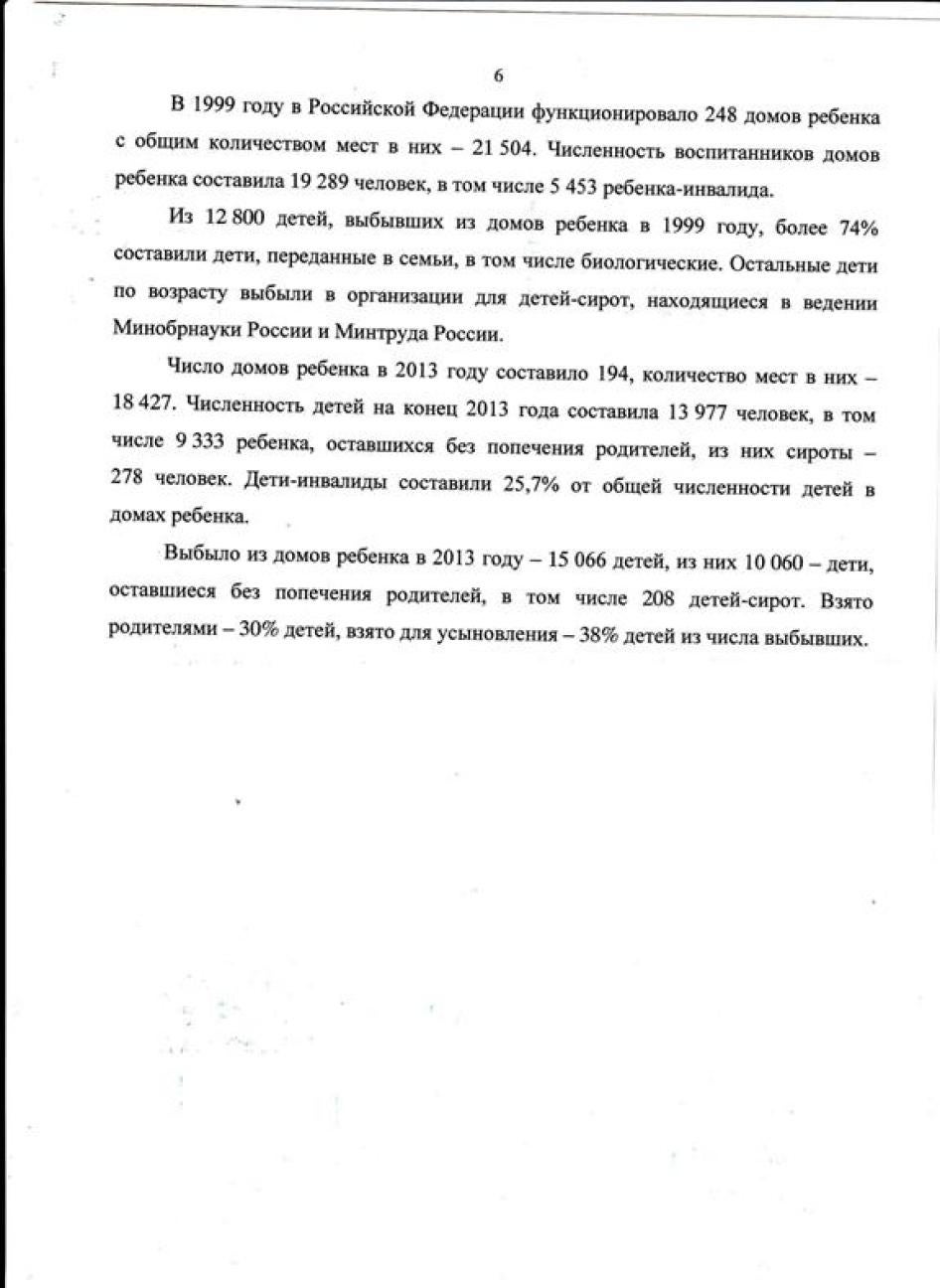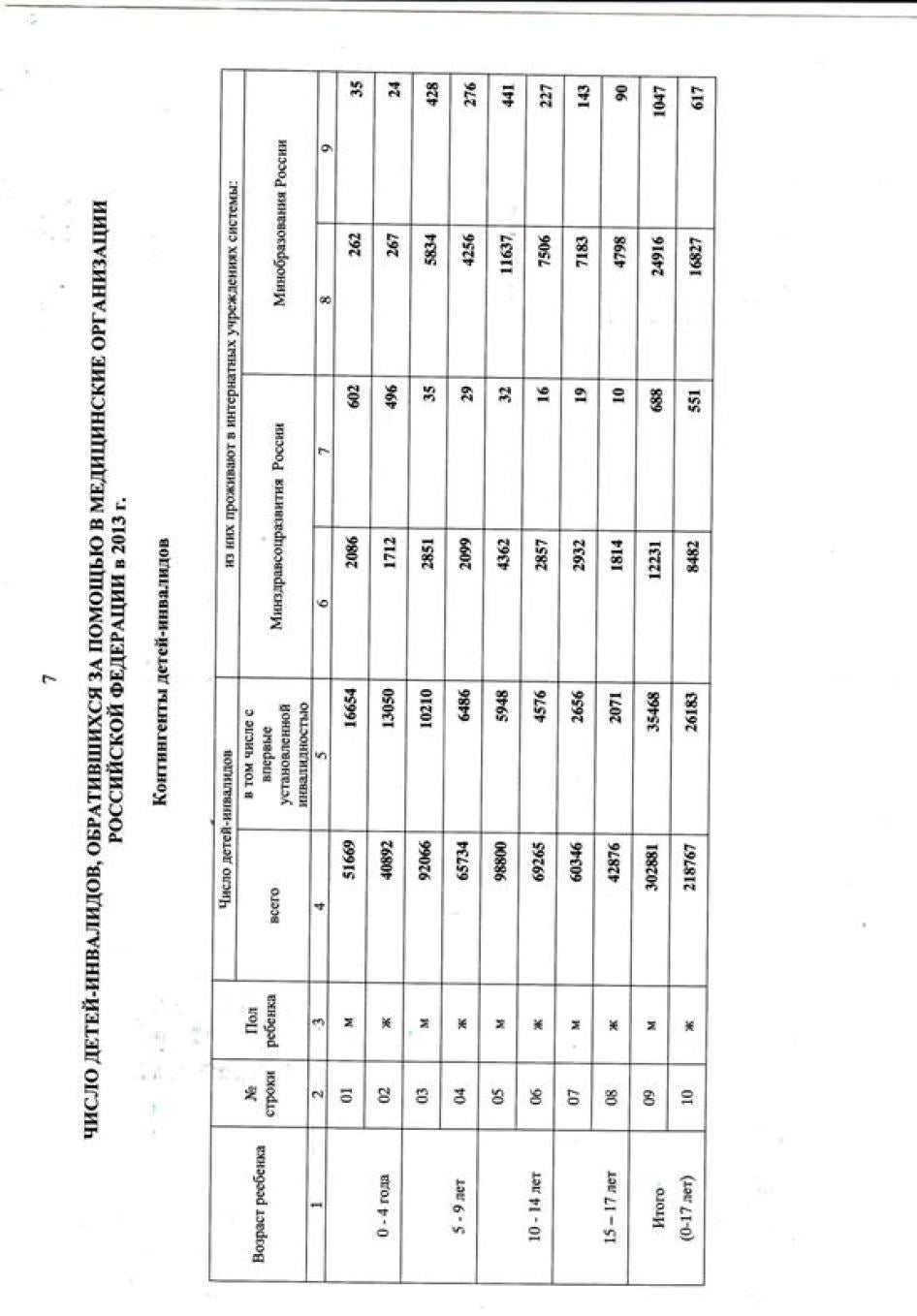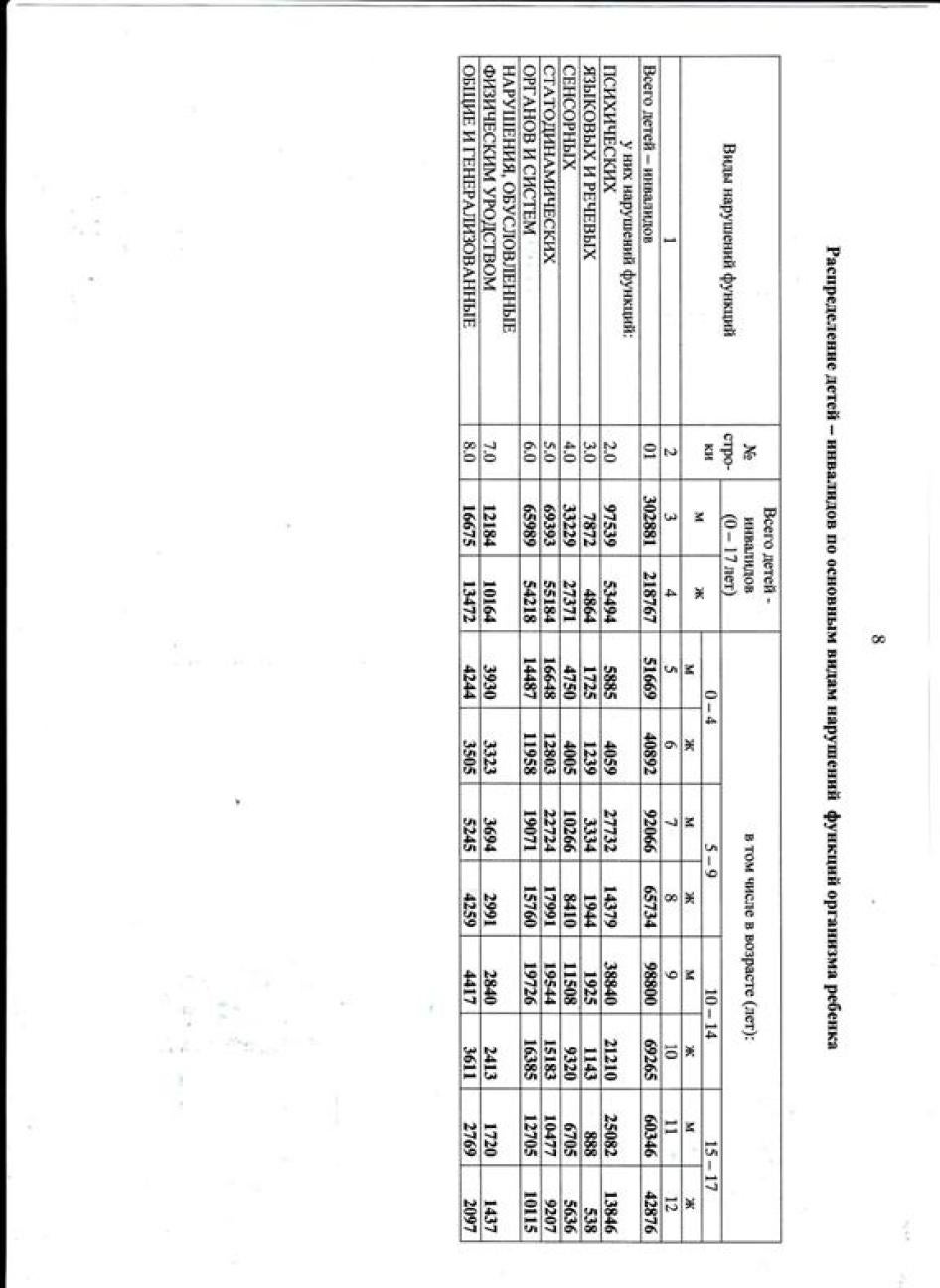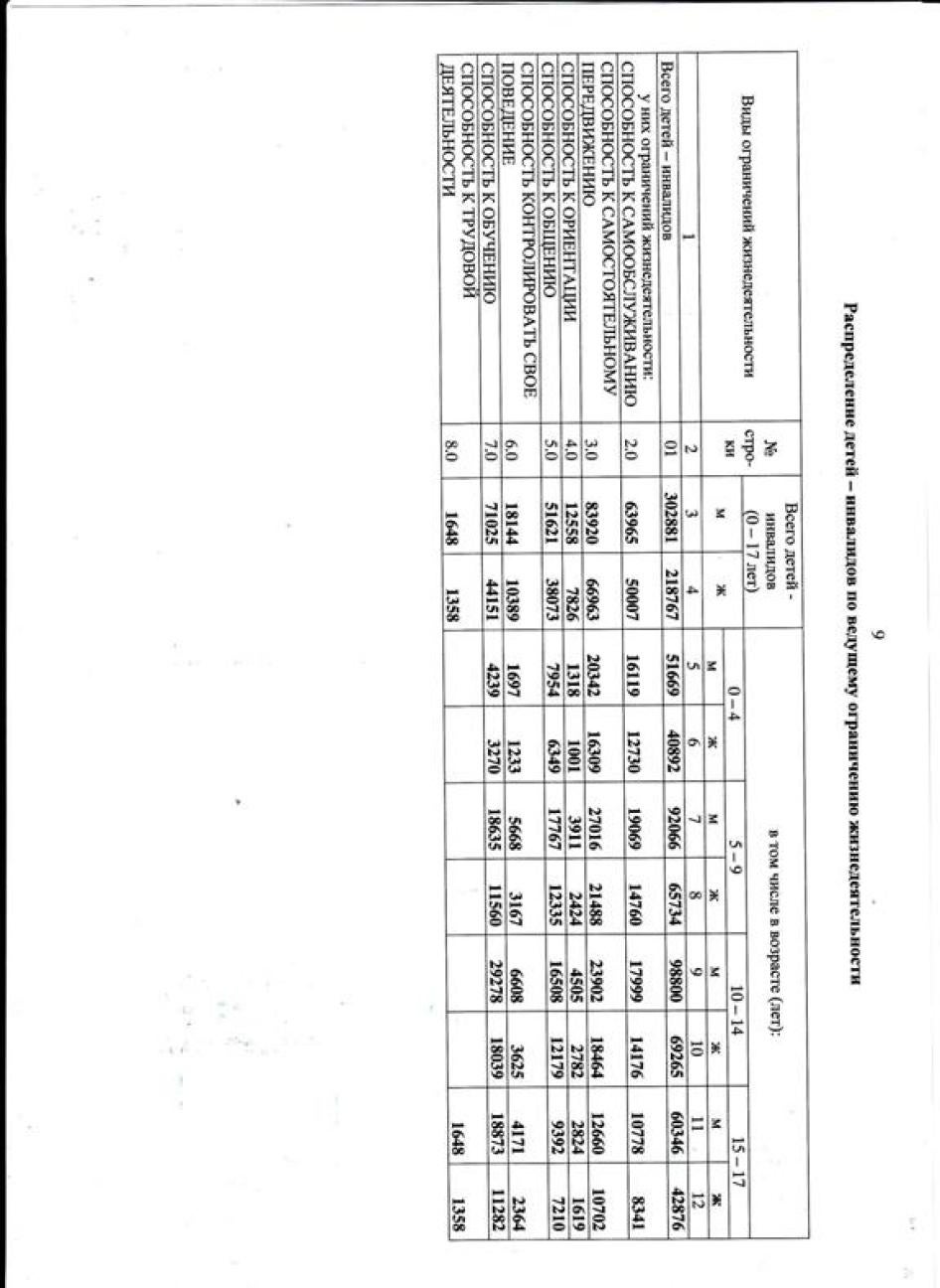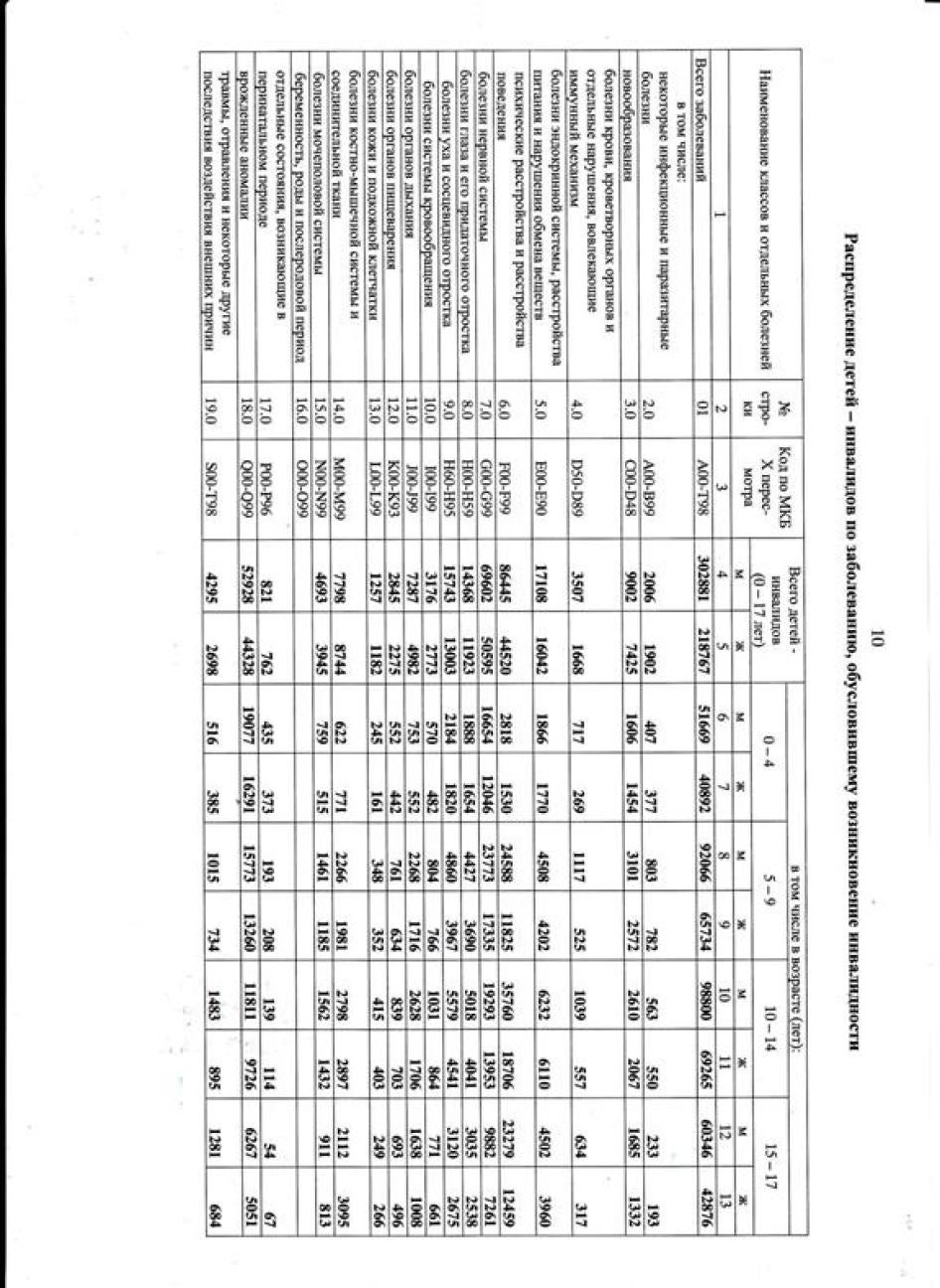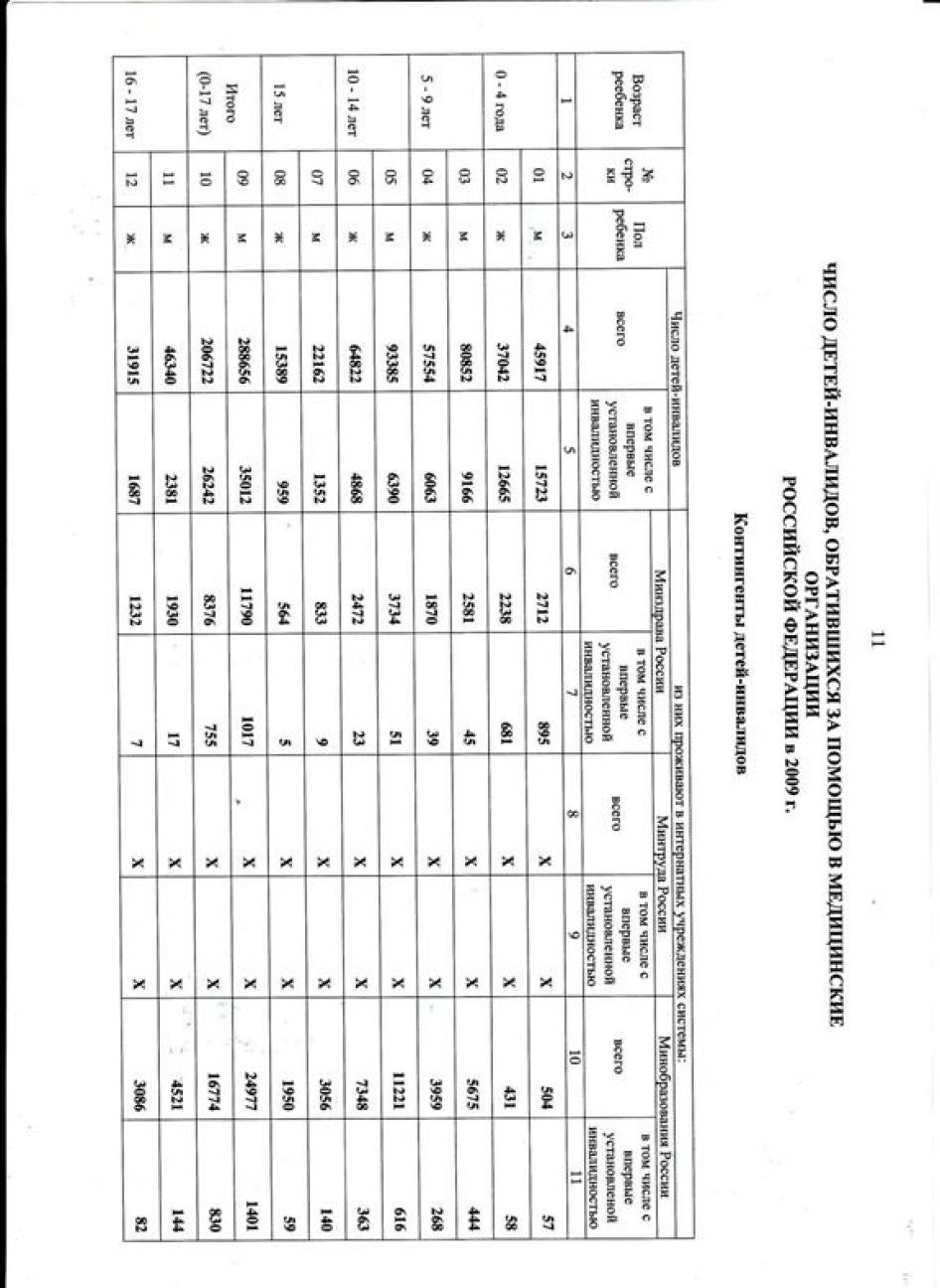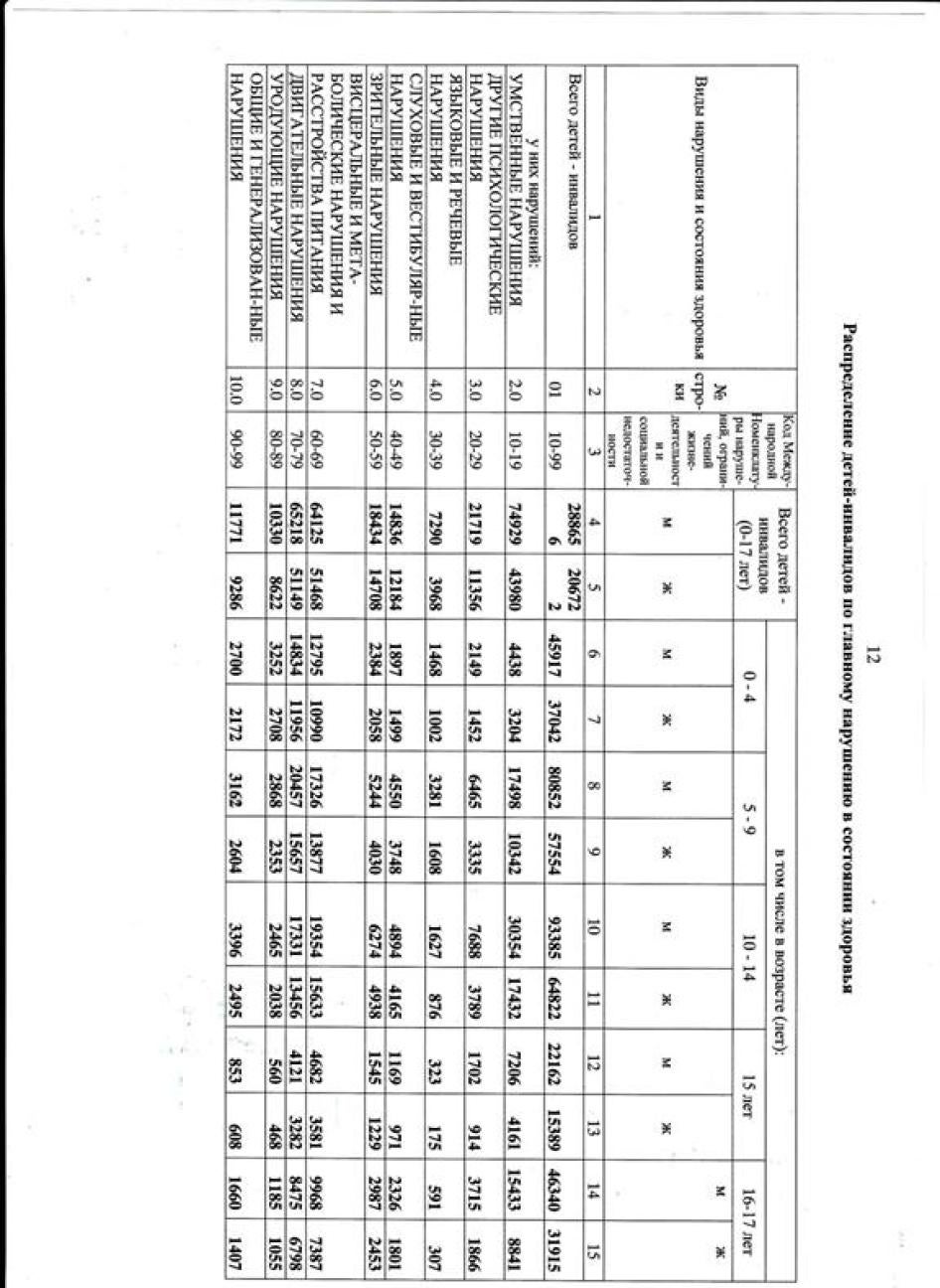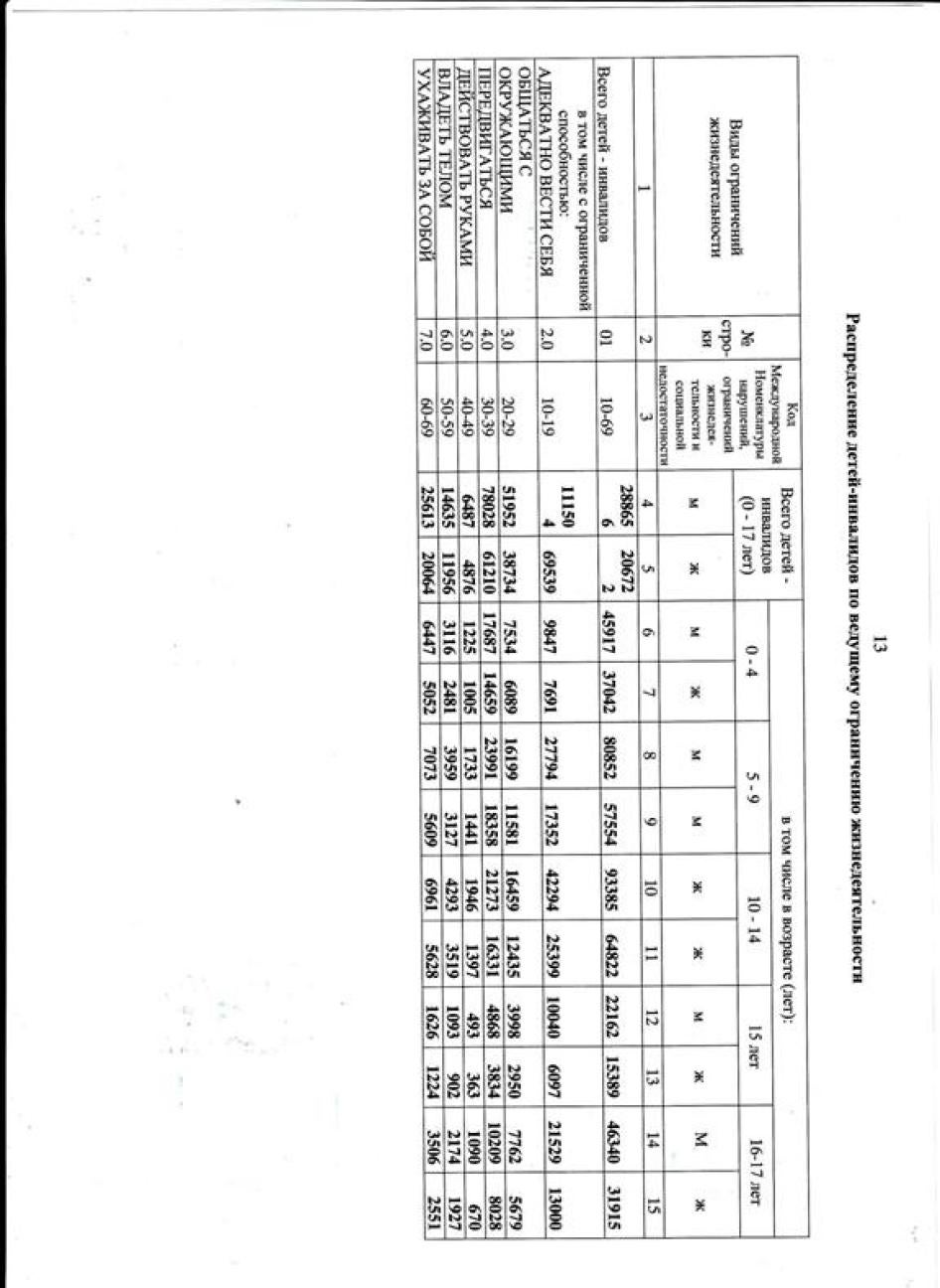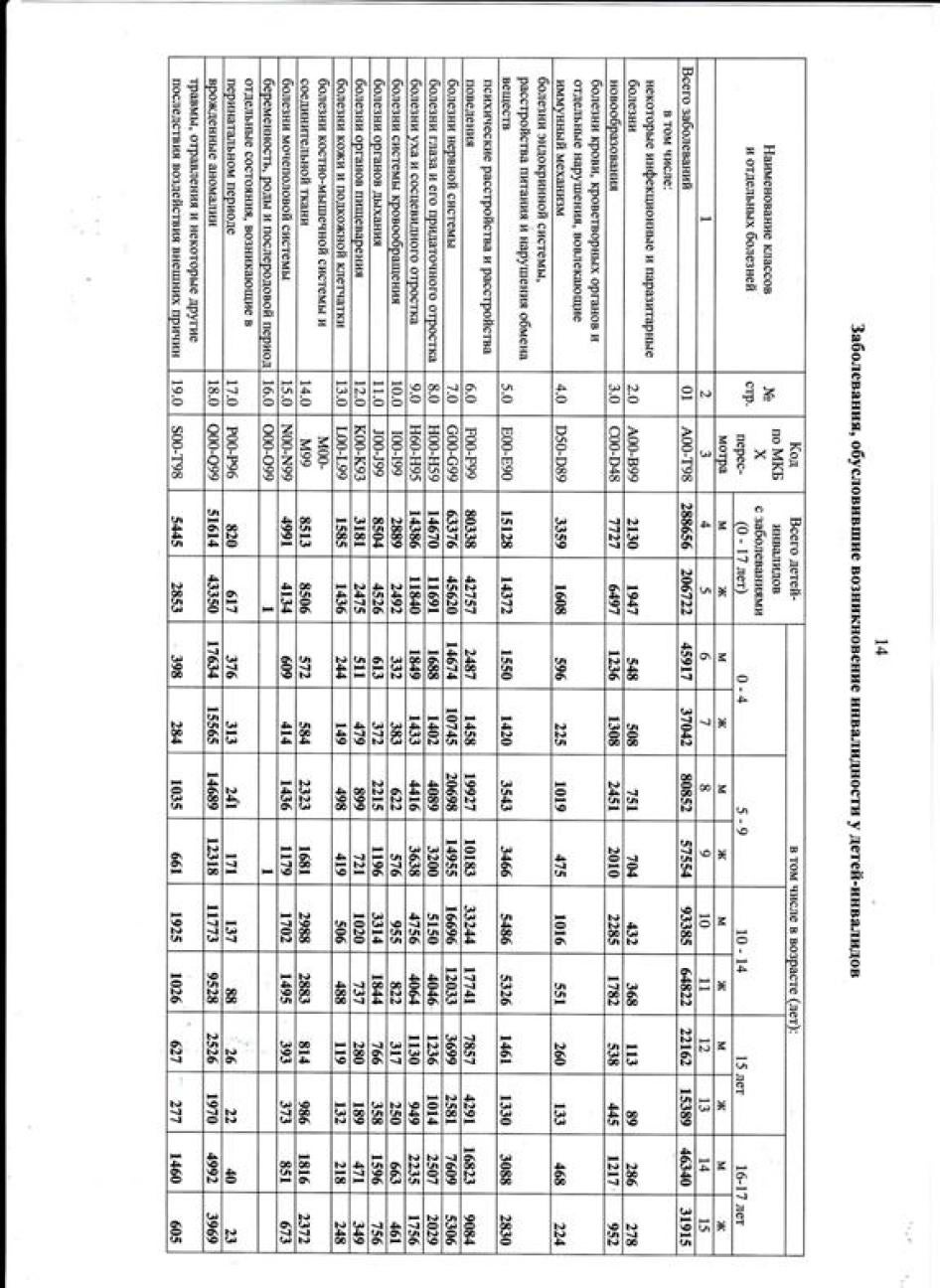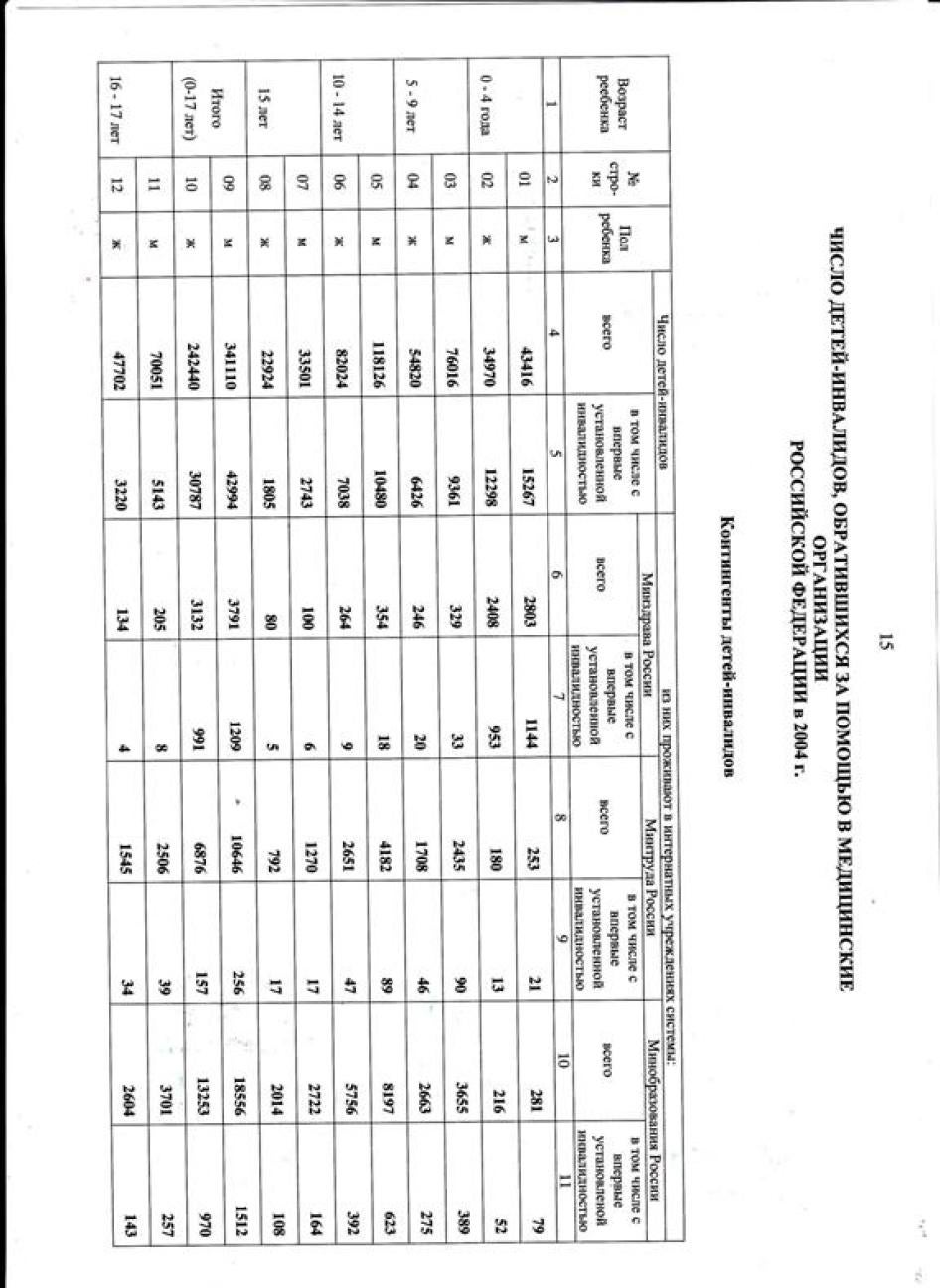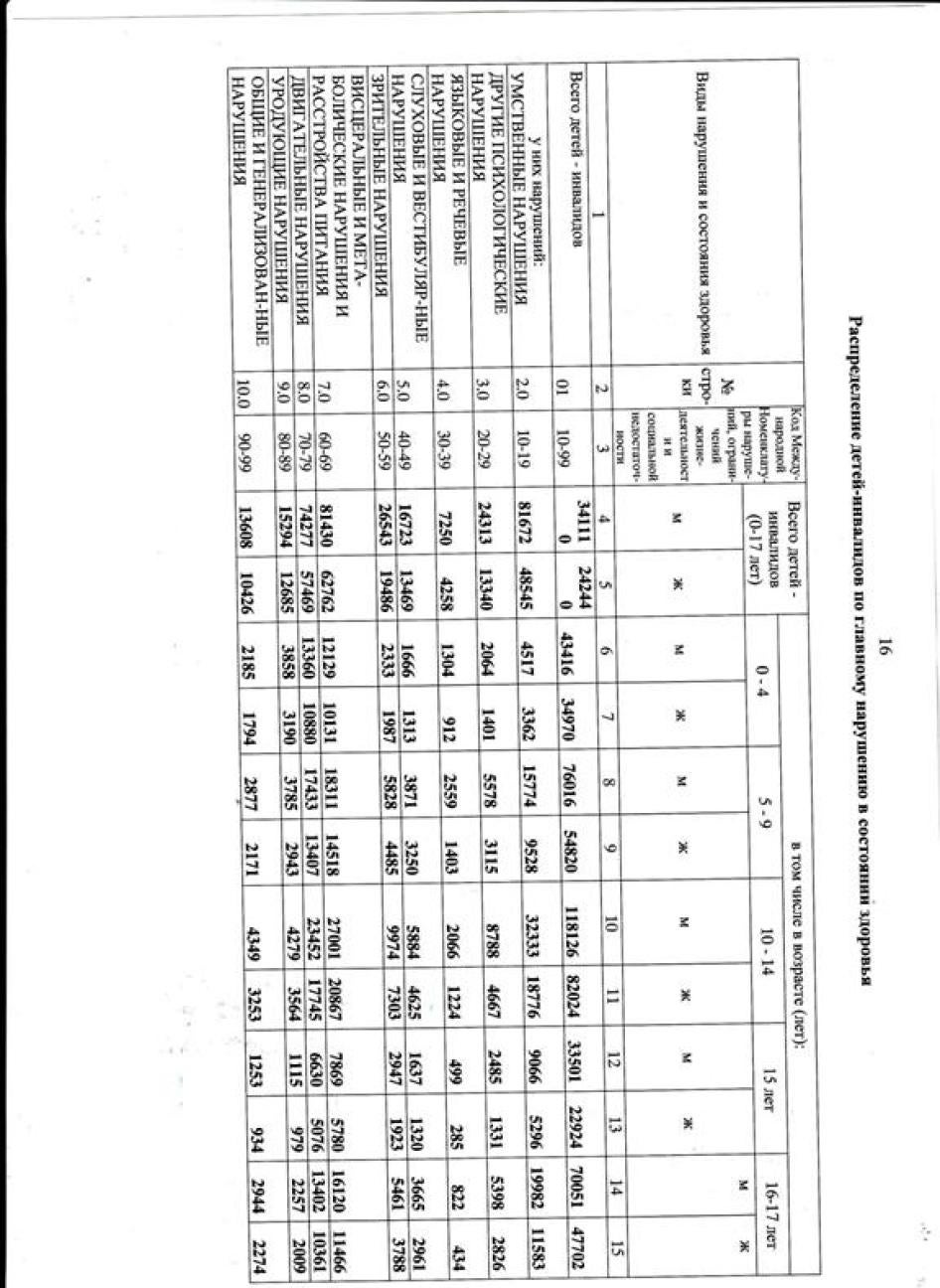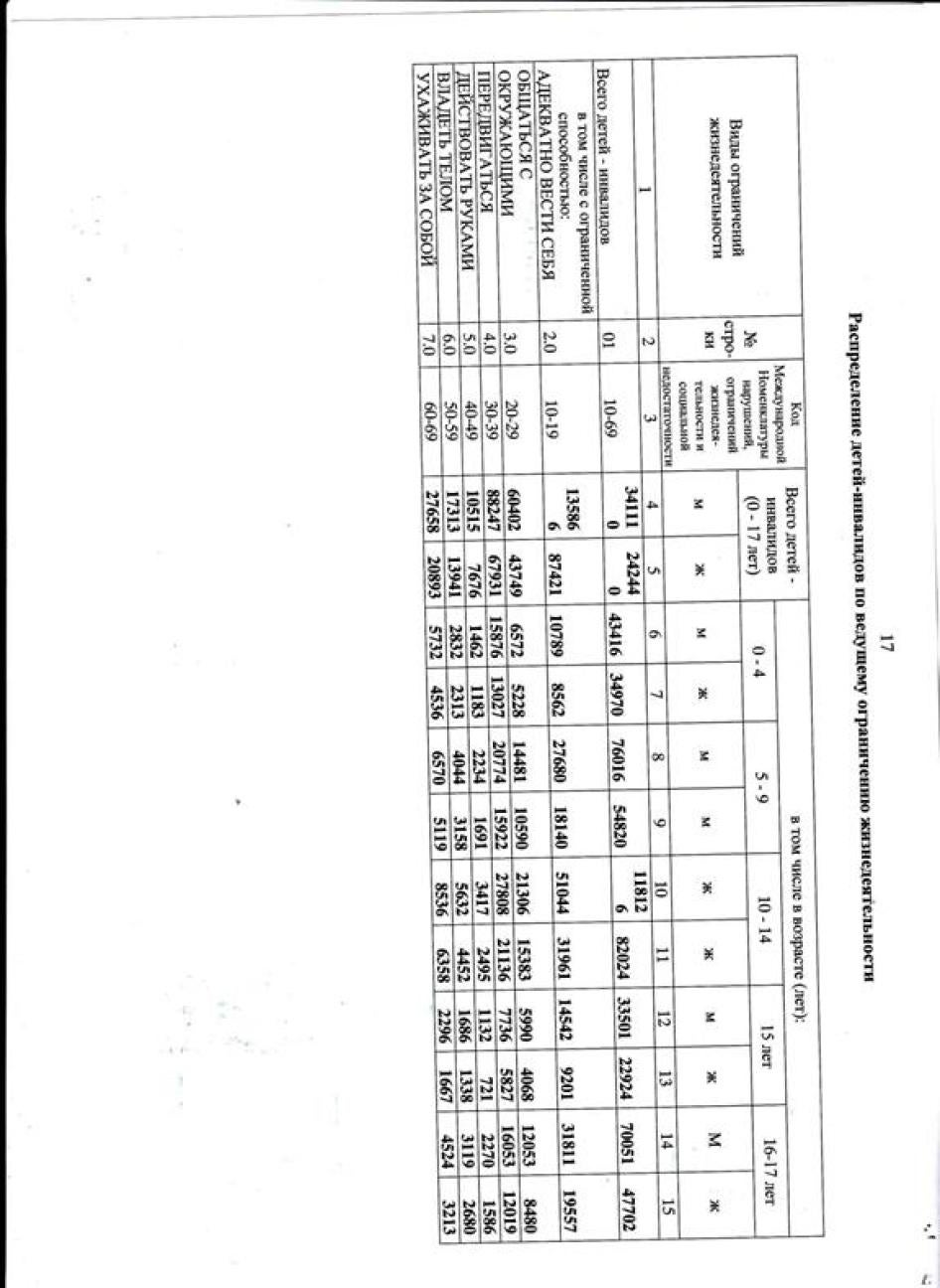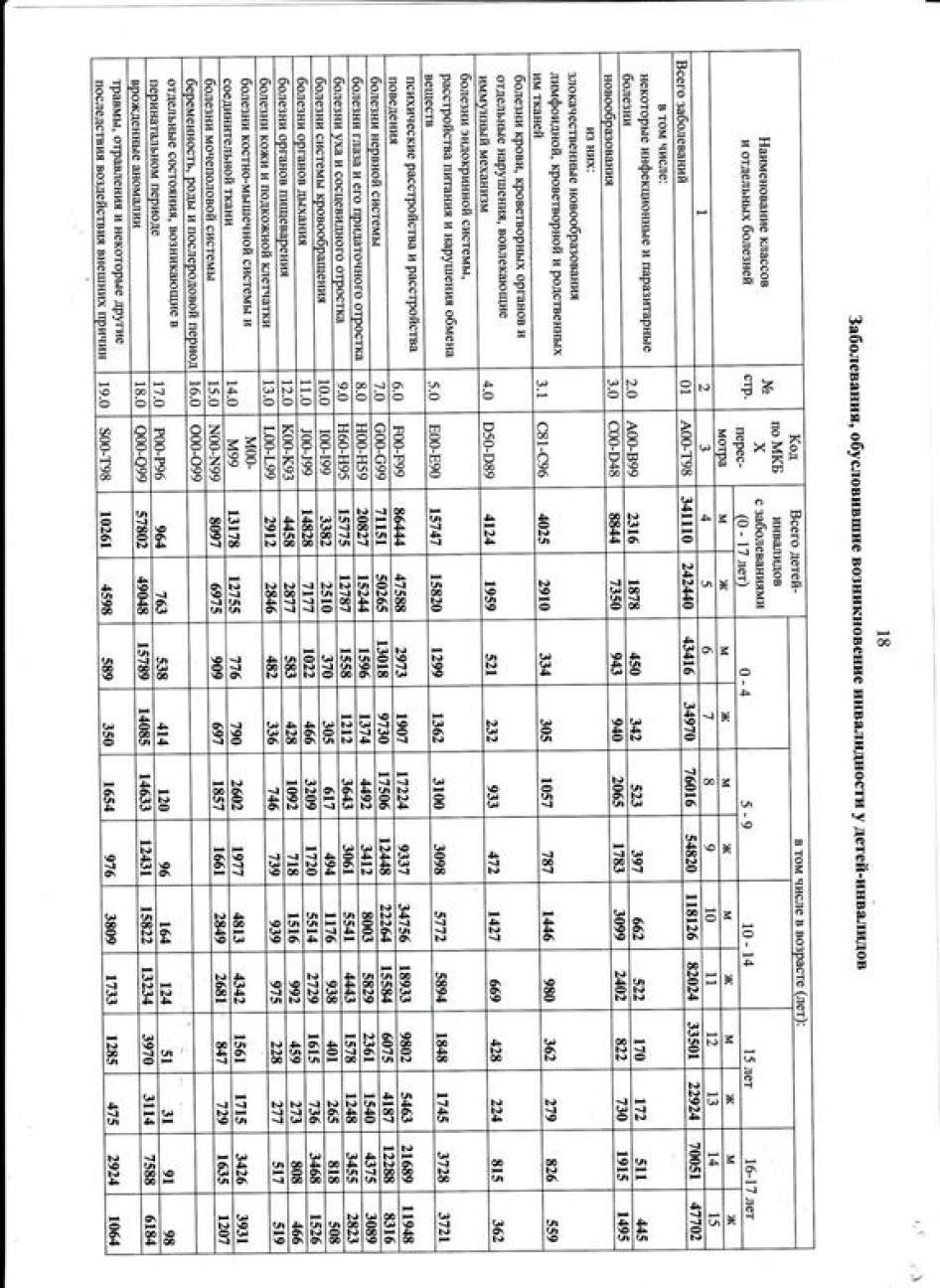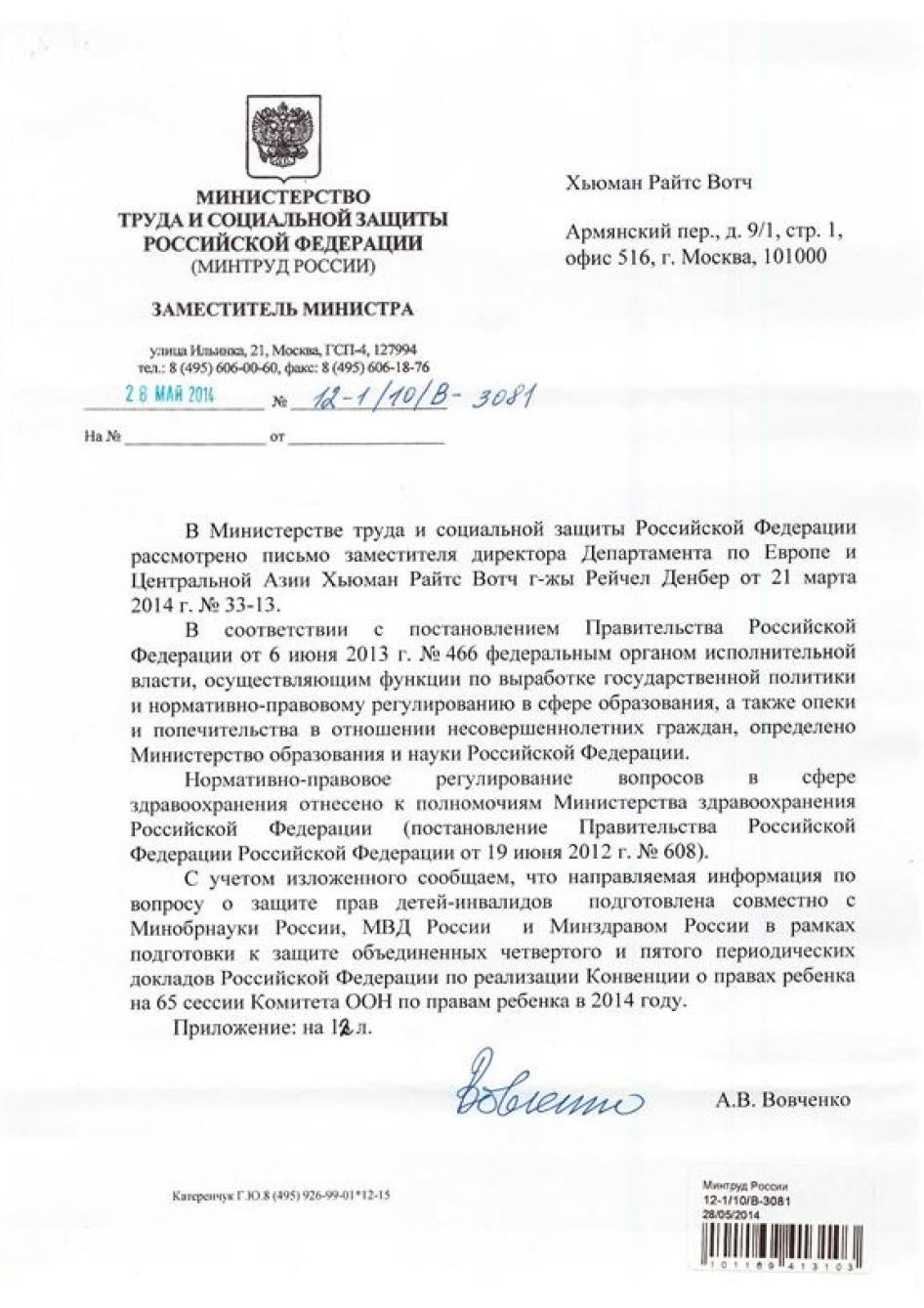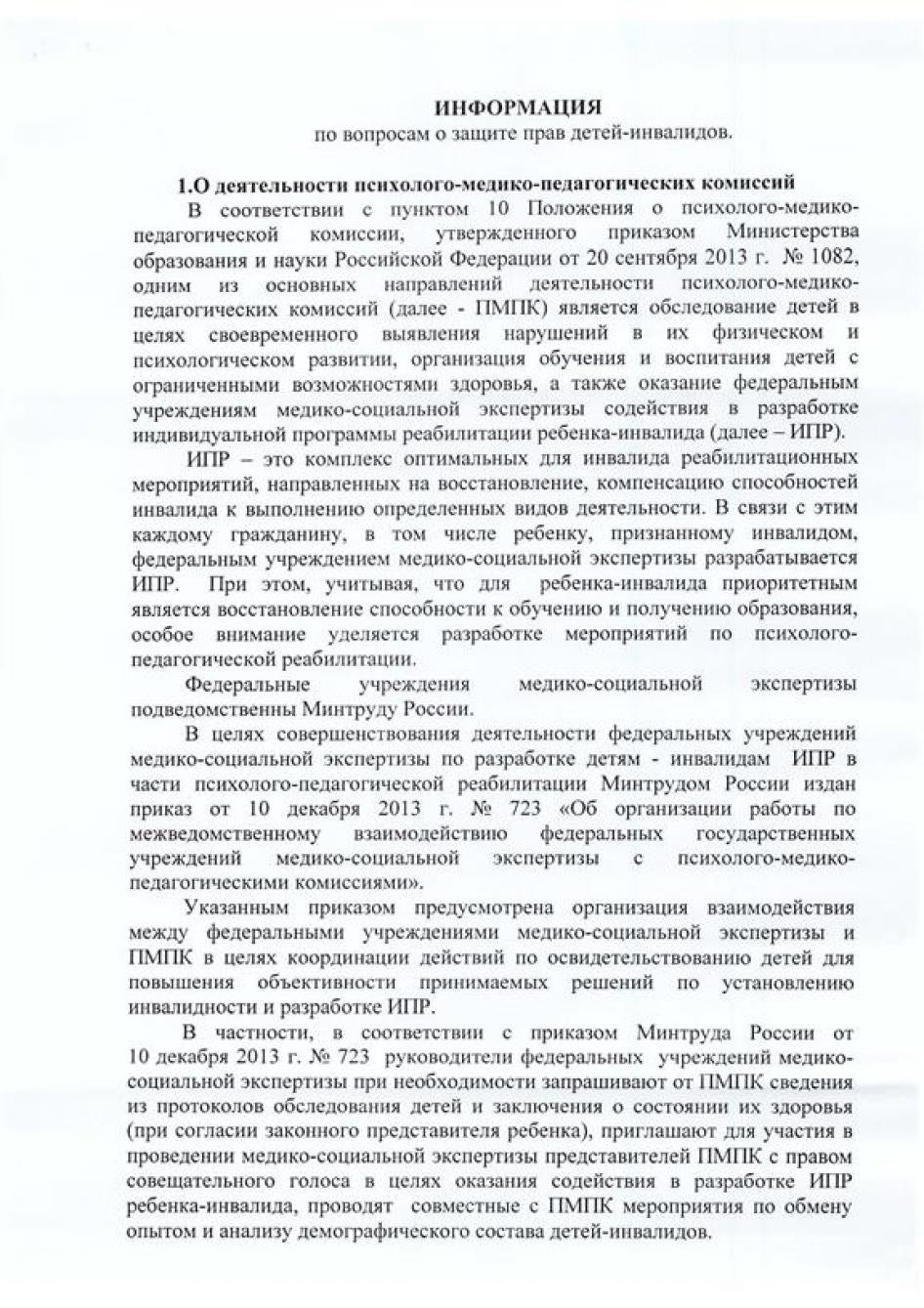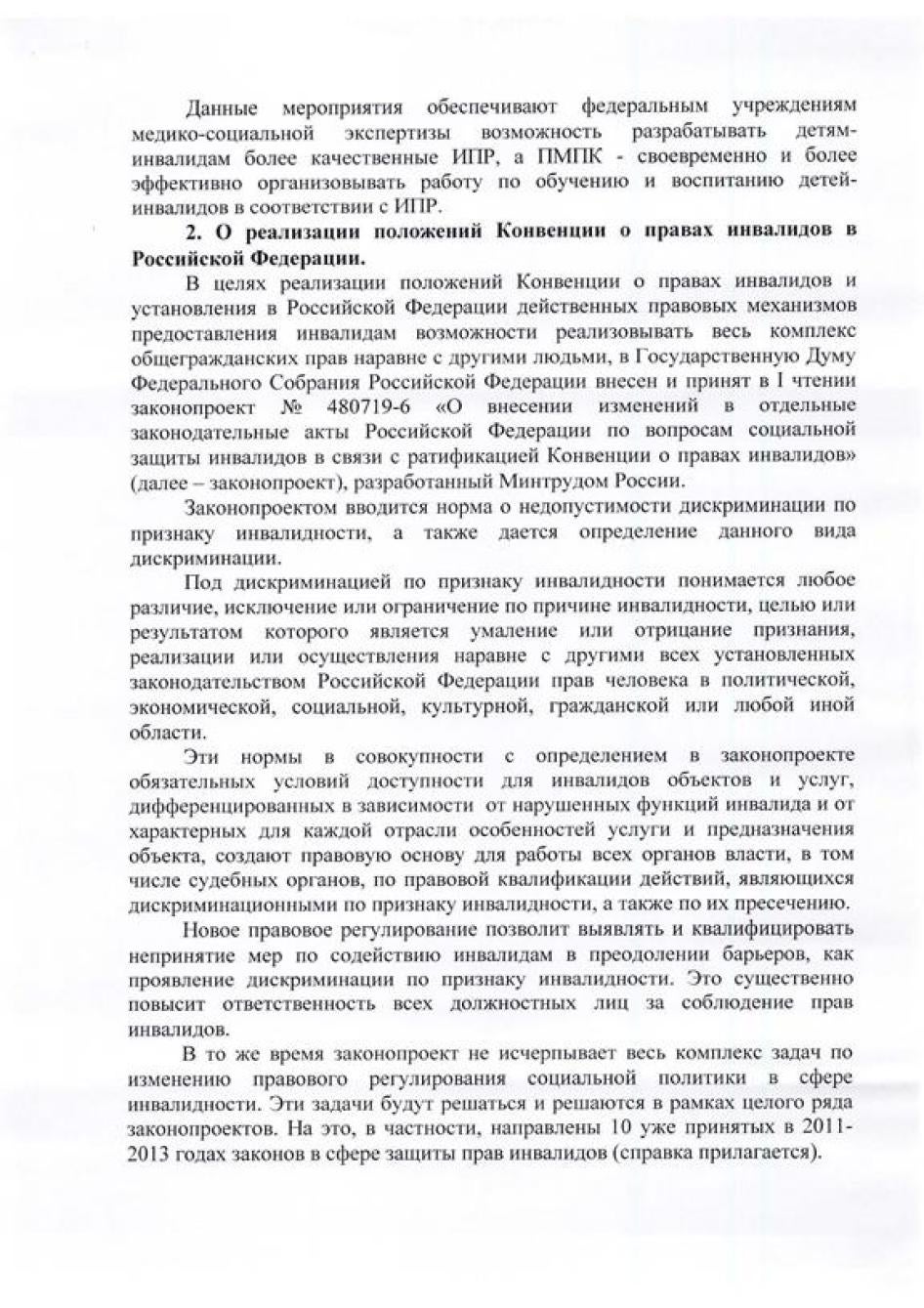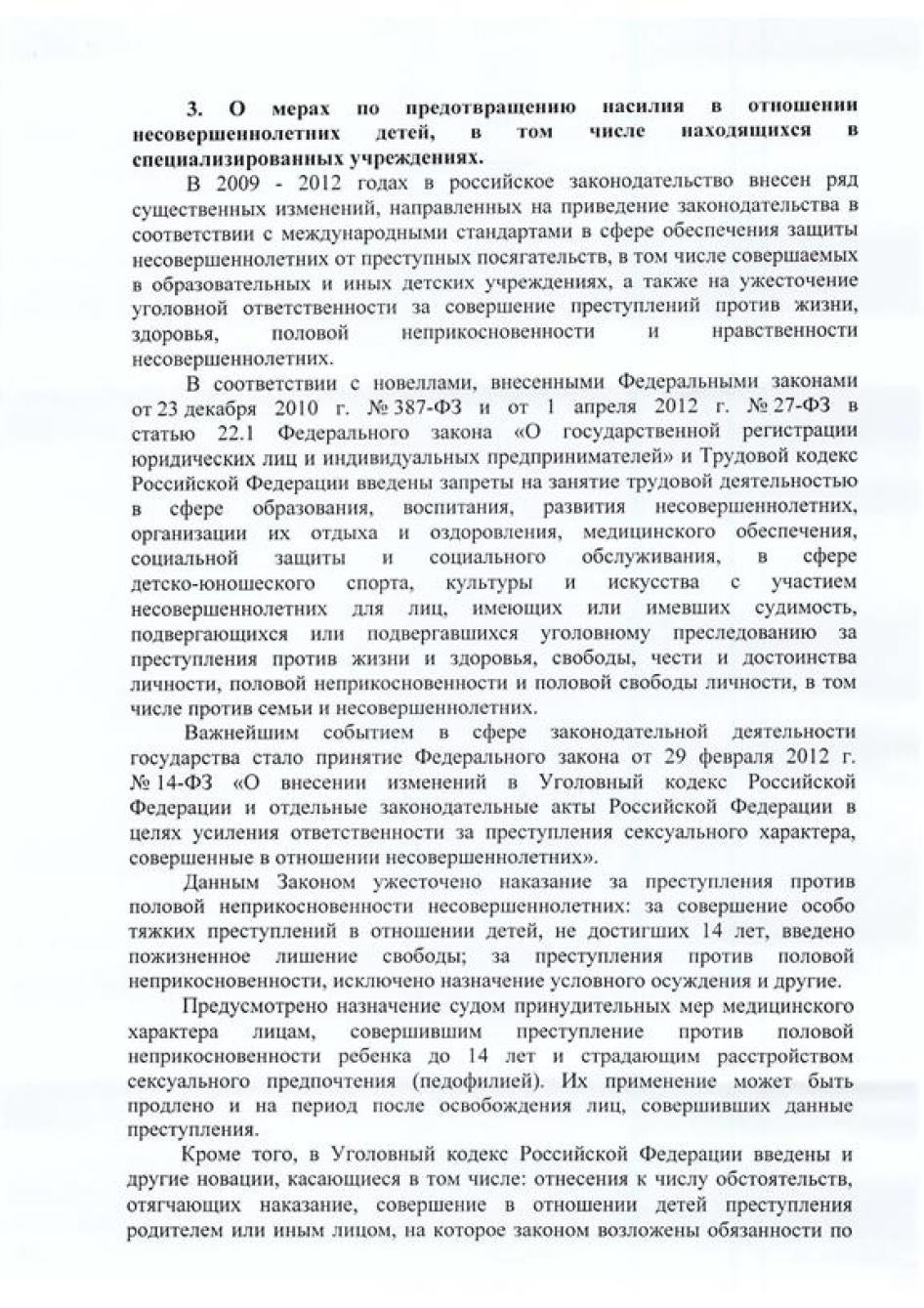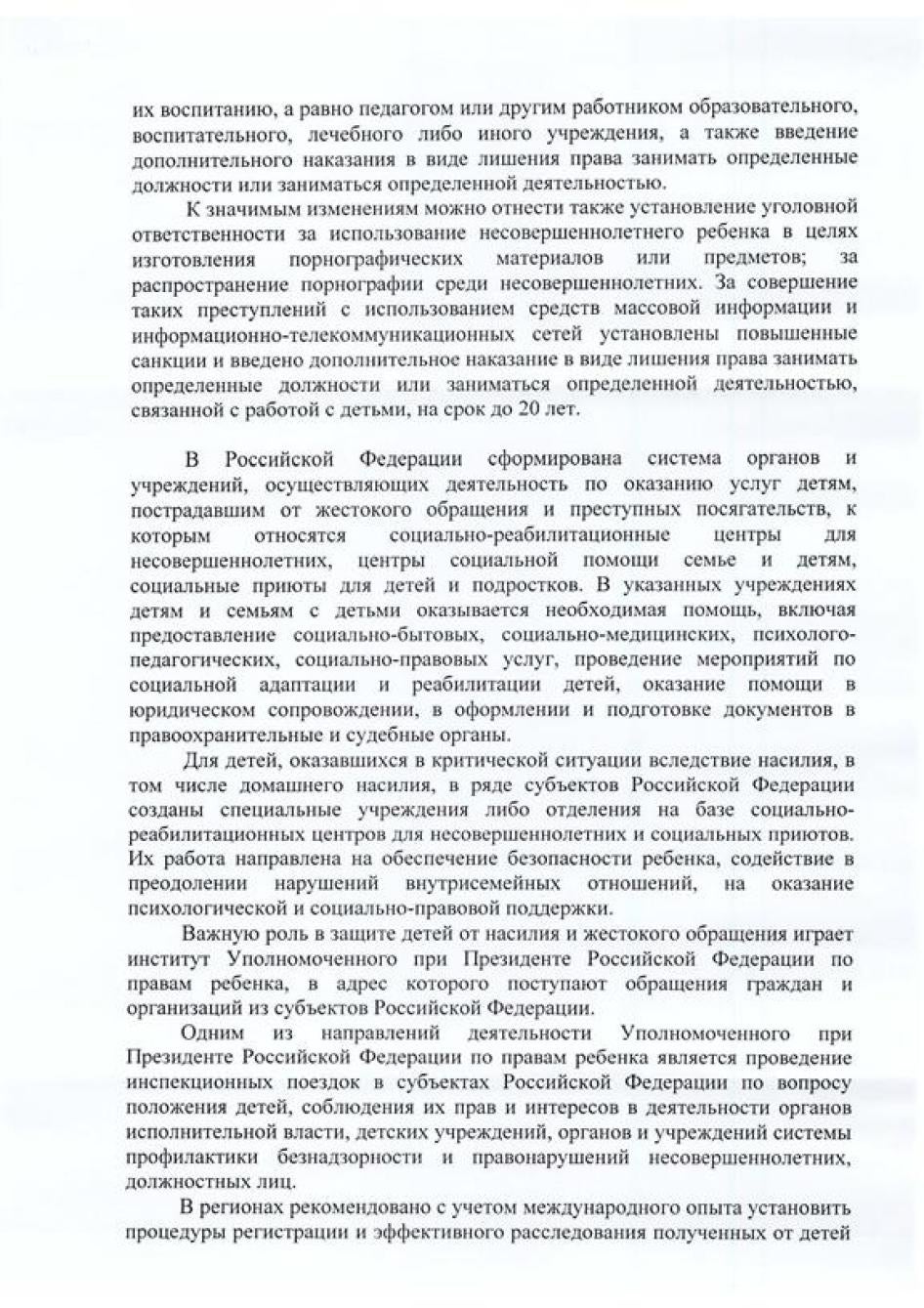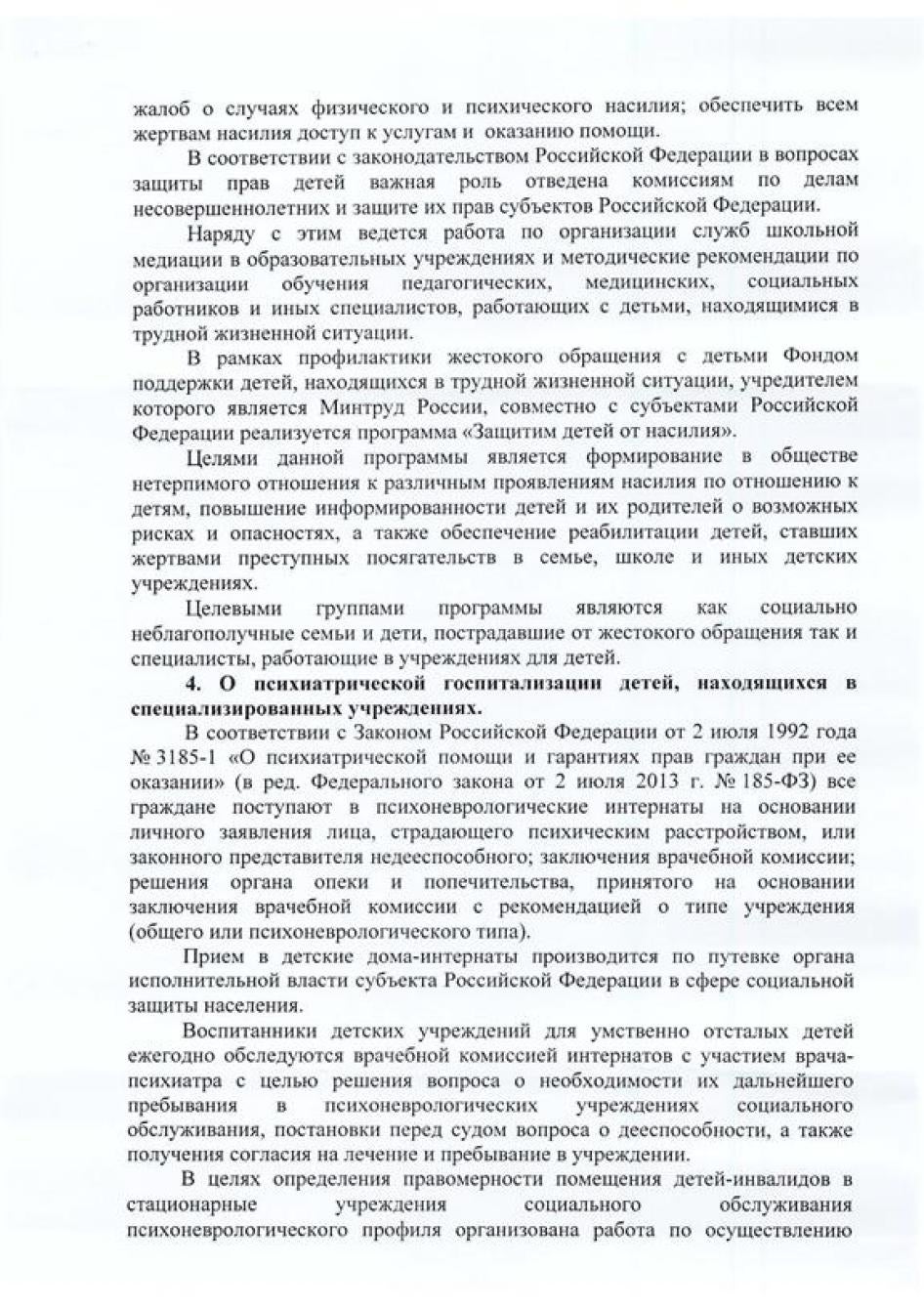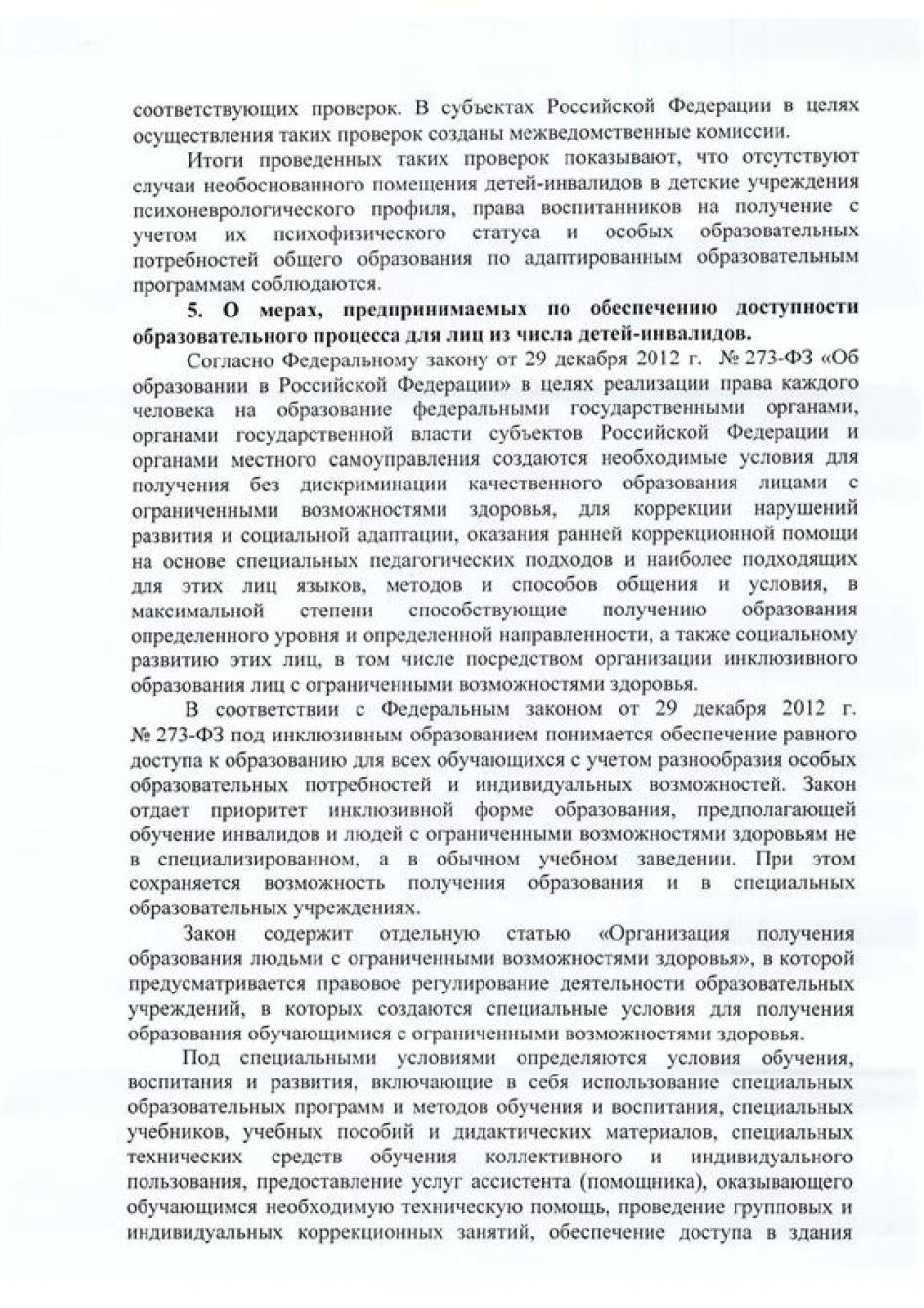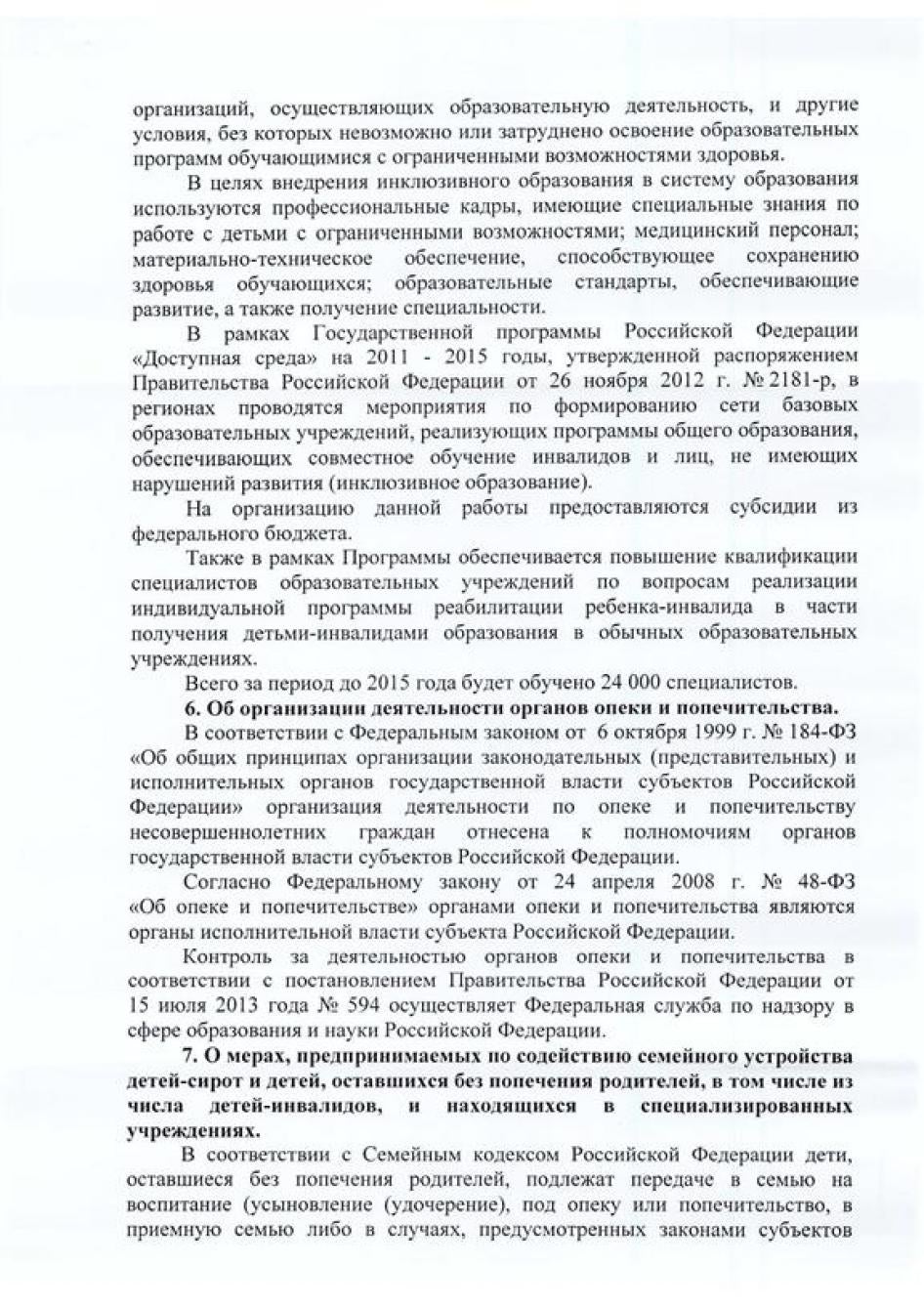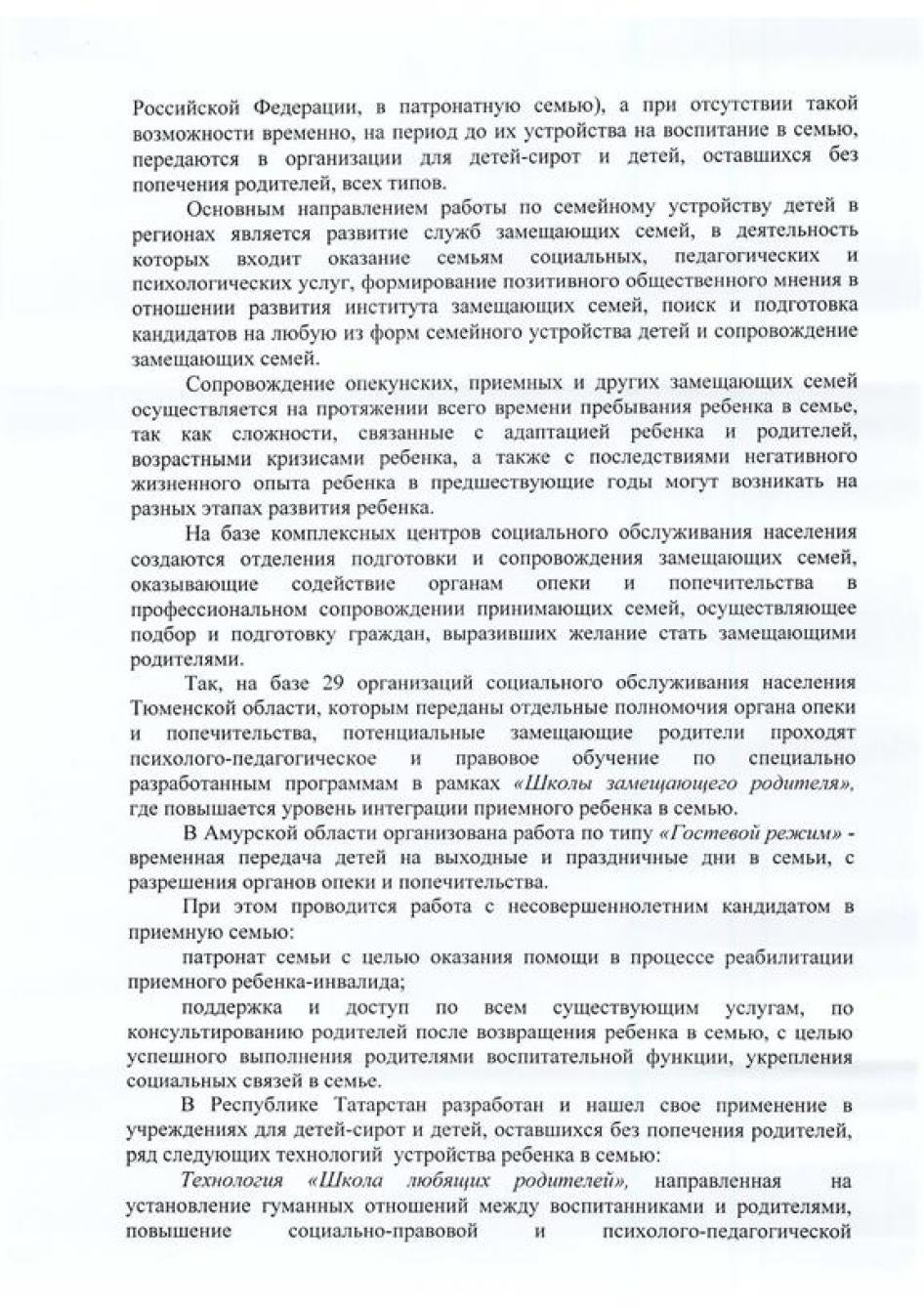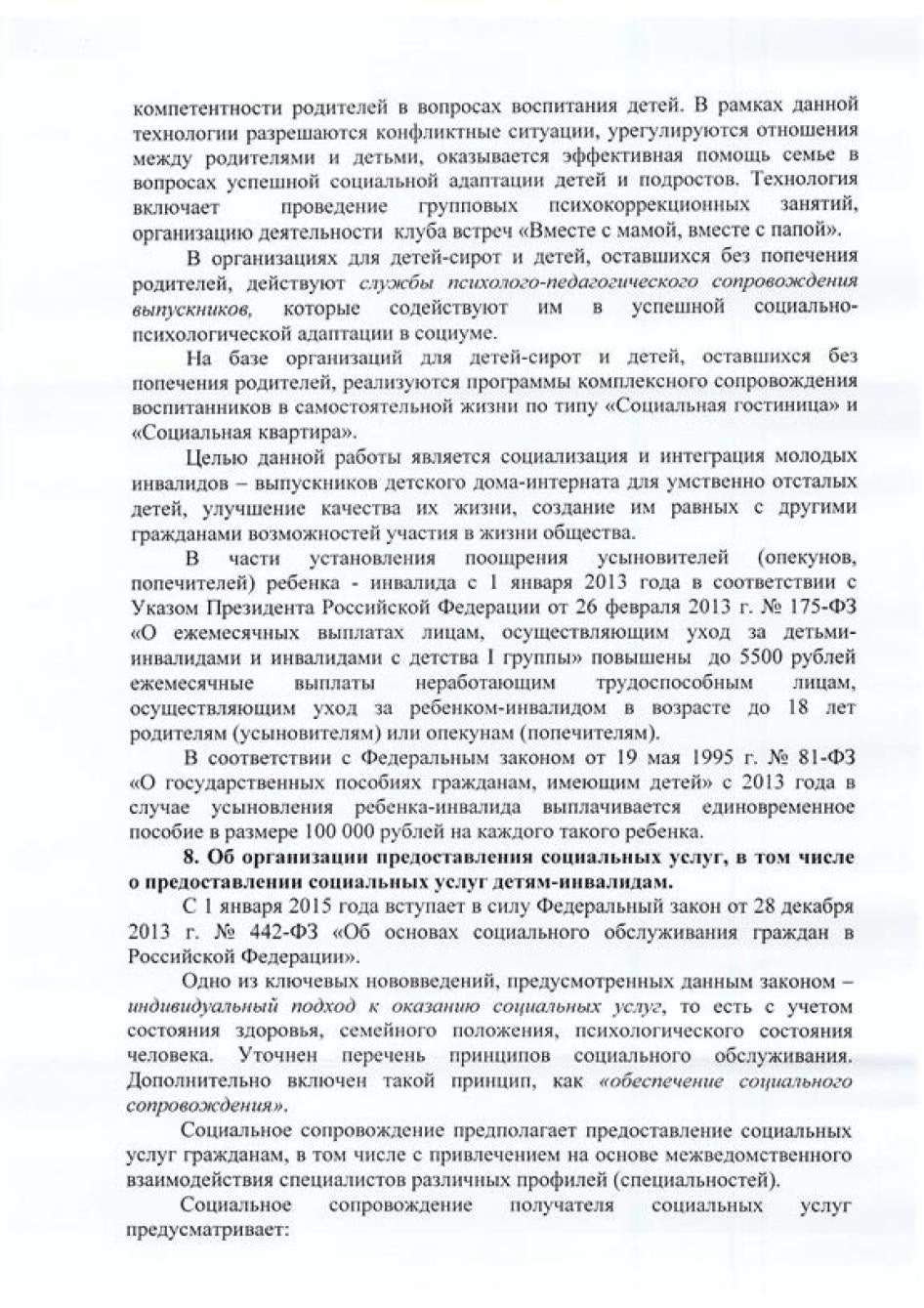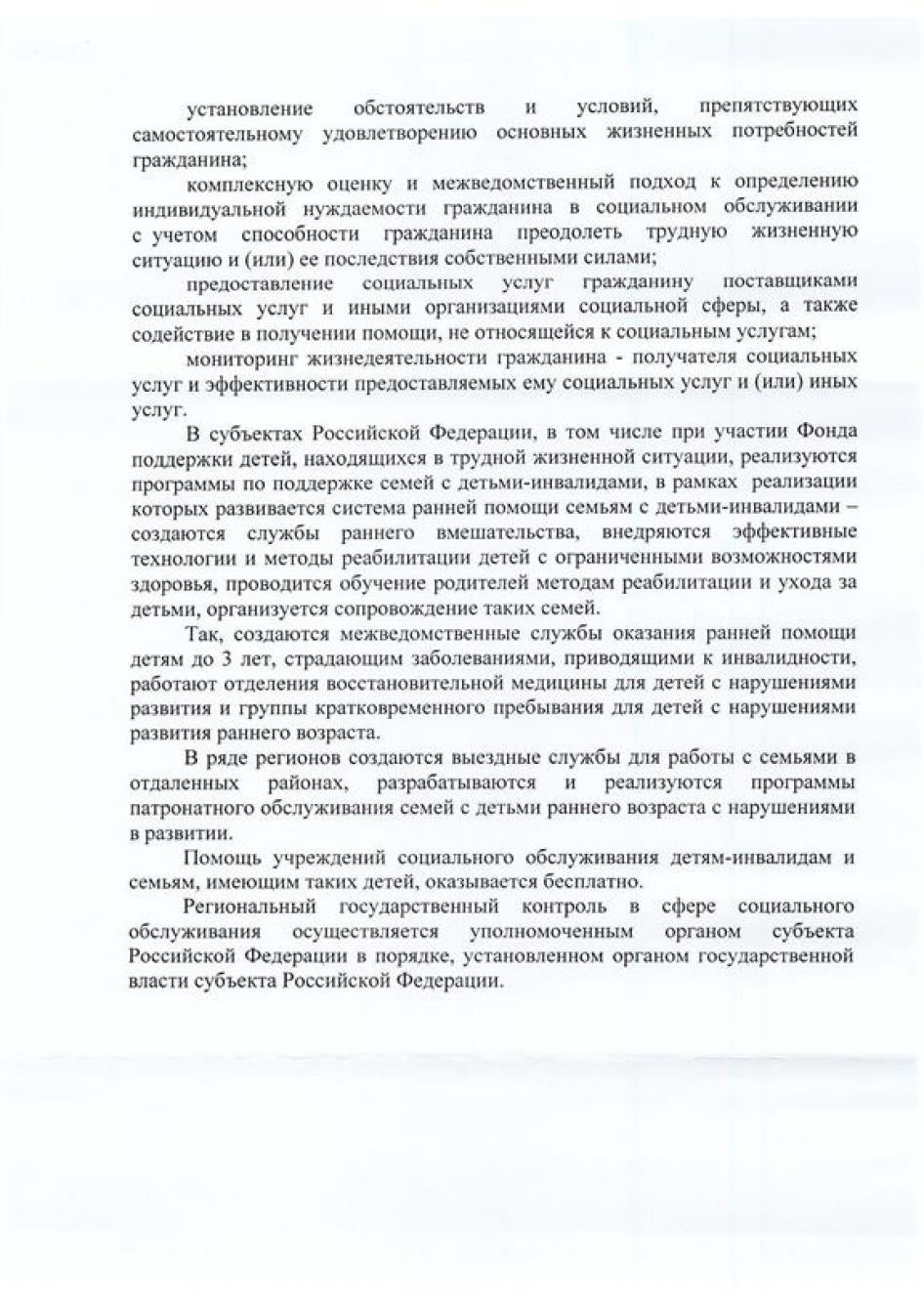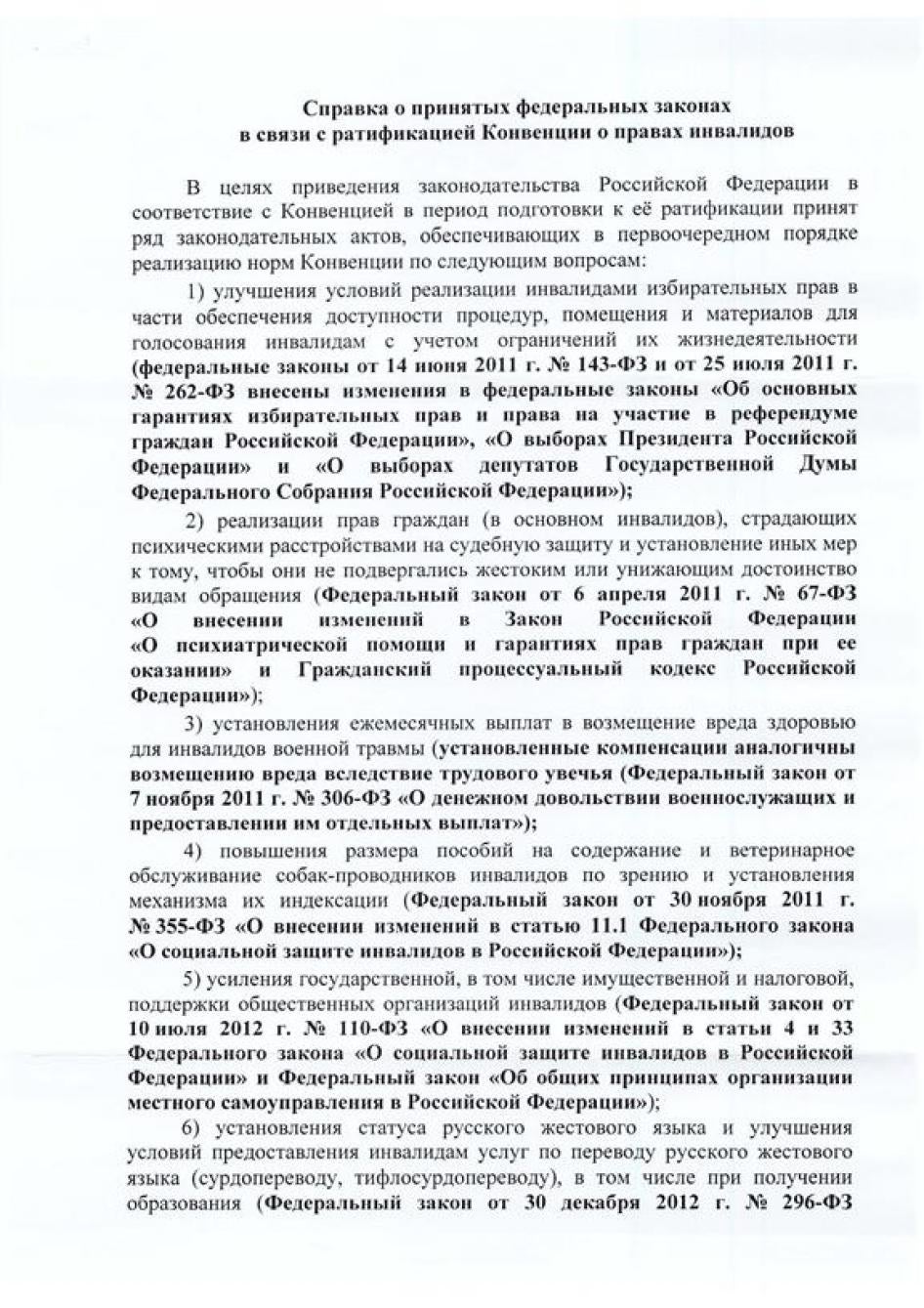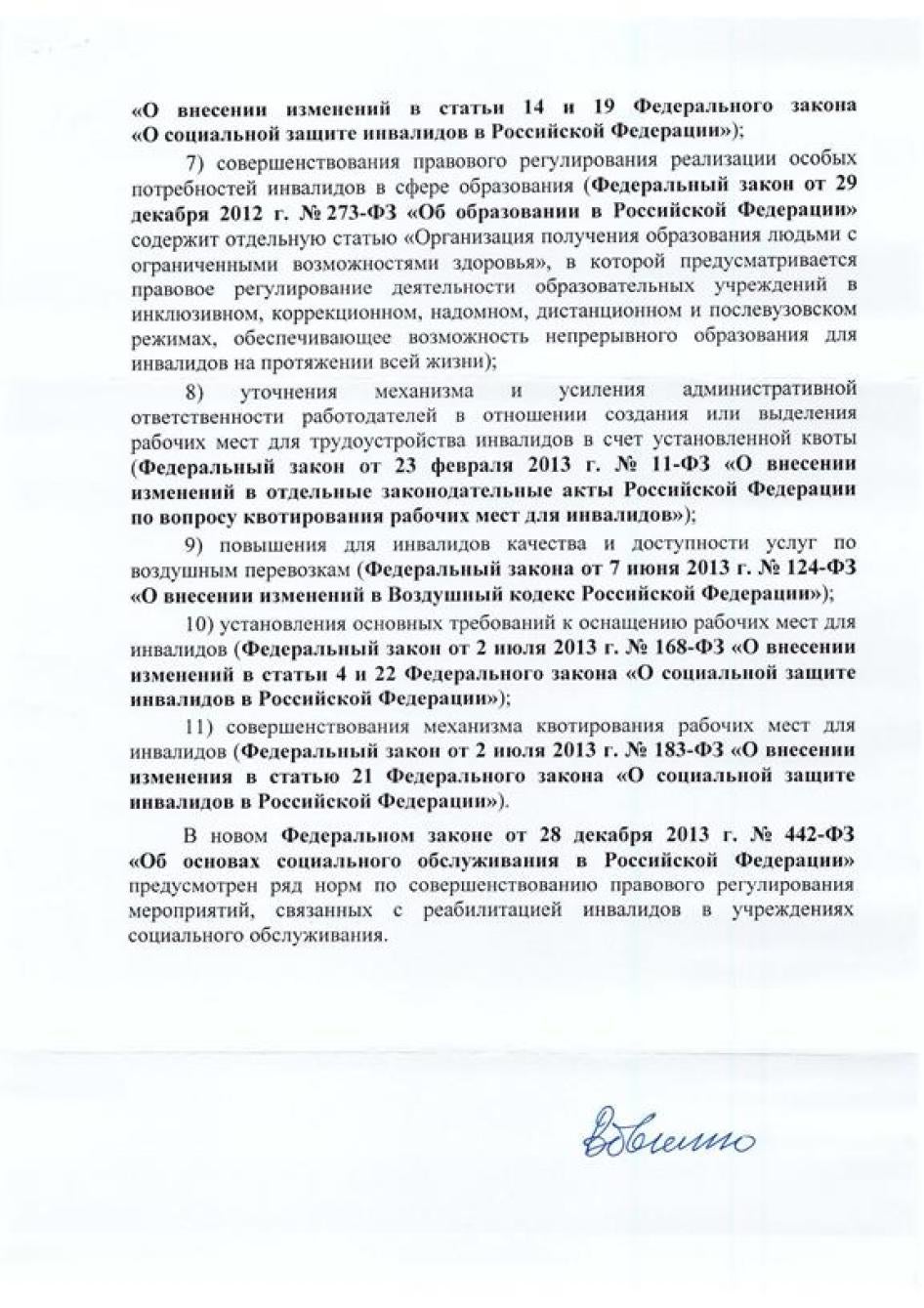Abandoned by the State
Violence, Neglect, and Isolation for Children with Disabilities in Russian Orphanages
Summary
The staff used to hit me and drag me by the hair. They gave me pills to calm me down.
– Nastia Y., a 19-year-old woman with a developmental disability, describing the treatment of staff in an orphanage for children with developmental disabilities in Pskov region, where she lived from 1998 to 2011
Every child with a disability in Russia has a significant chance of ending up in a state-run orphanage. Nearly 30 percent of all Russian children with disabilities live separately from their families and communities in closed institutions. These children have a range of impairments, including physical disabilities such as limited mobility, blindness, and deafness; developmental disabilities such as Down’s syndrome; and psychosocial disabilities such as depression, among others. Children with disabilities in state orphanages may be subject to serious abuses and neglect that severely impede their physical, emotional, and intellectual growth.
Children with disabilities may be overrepresented in institutional care. An international children’s rights nongovernmental organization (NGO) estimates that approximately 45 percent of children living in state institutions have some form of disability, despite the fact that children with disabilities account for only 2 to 5 percent of Russia’s total child population. The Russian government’s failure to ensure meaningful alternatives for these children means that many children with disabilities spend their childhoods within the walls of institutions, never enjoying a family home, attending school, or playing outside like other children.
This report is based on visits by Human Rights Watch researchers to 10 orphanages in 6 regions of Russia, as well as on more than 200 interviews with parents, children, and young people currently and formerly living in institutions in these regions in addition to 2 other regions of Russia. Children described how orphanage staff beat them, used physical restraints to tie them to furniture, or gave them powerful sedatives in efforts to control behavior that staff deemed undesirable. Staff also forcibly isolated children, denied them contact with their relatives, and sometimes forced them to undergo psychiatric hospitalization as punishment.
Many children also experienced poor nutrition and lack of medical care and rehabilitation, resulting in some cases in severely stunted growth and lack of normal physical development. Human Rights Watch determined that the combination of these practices can constitute inhuman and degrading treatment. Children with disabilities living in orphanages also had little or no access to education, recreation, and play.
Children with certain types of disabilities, typically those who cannot walk or talk, are confined to so-called “lying-down” rooms in separate wards, where staff force them to remain in cribs for almost their entire lives. Human Rights Watch documented particularly severe forms of neglect in “lying-down” rooms in the institutions it researched. The practice of keeping children with certain types of disabilities in such conditions is discriminatory, inhumane and degrading, and it should be abolished.
Research by the United Nations Children’s Fund (UNICEF) and others has demonstrated that institutionalization has serious consequences for children’s physical, cognitive, and emotional development, and that the violence children may experience in institutions can lead to severe developmental delays, various disabilities, irreversible psychological harm, and increased rates of suicide and criminal activity. UNICEF has urged governments throughout Central and Eastern Europe and Central Asia to stop sending children under the age of 3, including children with disabilities, to institutions.
While Russia lacks comprehensive and clear statistics on children in state institutions or foster care, experts estimate that the overwhelming majority of these children have at least one living parent. Russia’s high rate of institutionalization of children with disabilities results from a lack of government and state-supported services, such as inclusive education, accessible rehabilitation, and other support that would make it feasible for children’s families to raise them. In addition, many parents face pressure from healthcare workers to relinquish children with disabilities to state care, including at birth. Human Rights Watch documented a number of cases in which medical staff claimed, falsely, that children with certain types of disabilities had no potential to develop intellectually or emotionally and would pose a burden with which parents will be unable to cope. In all of these cases, the children raised in their families had far exceeded any expectations.
Children with disabilities who enter institutions at a young age are unlikely to return to their birth families as a result of the practice of local-level state commissions to recommend continued institutionalization of children. The Russian government has failed to adequately support and facilitate adoption and fostering of children with disabilities, although these types of programs formally exist. As a result, when children with disabilities turn 18 and age out of orphanages, they are overwhelmingly placed in state institutions for adults with disabilities. Staff in many orphanages also fail to provide training and practical knowledge that would give children the skills they need to live independently once they become adults.
While in orphanages, children with disabilities may be subject to serious violence, neglect, and threats. For example, Human Rights Watch documented the use of sedatives to restrain children deemed to be too “active” in 8 out of the 10 institutions it visited in the course of researching this report. Twenty-five year-old Andrei M., a young man with a developmental disability who lived in an orphanage in Pskov region until 2008, told Human Rights Watch, “They constantly gave us injections, and then they sent us to the bedroom so that we would sleep.”
Human Rights Watch spoke with many orphanage staff who expressed a desire to support children’s maximal development and who worked hard to do so with the information and resources at their disposal. Some of these staff were also those who used practices such as physical and chemical restraints, for example. The findings below are presented with the understanding that well-intentioned staff often engage in unacceptable childrearing methods because they lack information, such as training in nonviolent disciplinary methods, as well as resources, such as additional personnel to help them care for large numbers of children.
Children with disabilities living in state institutions may also face various forms of neglect, including lack of access to adequate nutrition, health care and rehabilitation, play and recreation, attention from caregivers, and education. For example, Olga V., a pediatrician at a Sverdlovsk region orphanage for children with developmental disabilities, stated that not all children in the orphanage go to school, including 150 children in “lying-down” rooms who she claimed were “uneducable” (neobuchaemy) – an outdated diagnosis that state doctors and institution staff continue to assign to some children. In the same orphanage, another pediatrician stated that rather than select food appropriate for children’s ages and health needs, staff “grind up whatever we have and use tubes to feed the ones who can’t feed themselves.”
As a result of violence and neglect, children with disabilities in state institutions can be severely physically and cognitively underdeveloped for their ages. Nina B., an independent, Moscow-based pediatrician specializing in the health of children with disabilities, told Human Rights Watch that children from orphanages often become atrophied due to lack of stimulation, movement, and access to rehabilitation services.
Children with disabilities living in state institutions also face numerous obstacles to adoption and fostering, including lack of government mechanisms to actively locate foster and adoptive parents for children with disabilities; lack of support for adoptive and foster families of children with disabilities; and some state officials’ negative attitudes towards children with disabilities and their active attempts to dissuade parents from adopting or fostering these children on the basis that they will be unable to care for them.
The Russian federal government has in recent years developed several policies that include important measures to end institutionalization and provide better alternatives for children with disabilities and their families. For example, the government formulated the National Action Strategy in the Interests of Children for 2012-2017, which aims to create government support services that would enable children with disabilities to remain in their birth families, return children with disabilities who live in institutions to their birth families, and increase the number of Russian regions that do not use any form of institutional care for orphans. The government also established a foundation to finance projects by regional governments and NGOs in certain priority areas, including prevention of child abandonment and social inclusion of children with disabilities.
However, these well-intentioned policies lack clear federal plans for implementation and monitoring. As such, they fail to adequately address the widespread practice of institutionalization of children with disabilities and to create sufficient meaningful alternatives for children with disabilities and their families.
In May 2014 the Russian government also passed a resolution that establishes orphanages as temporary institutions whose primary purpose is to place children in families and mandates that orphanages protect children’s rights to health care, nutrition, and information about their rights, among other fundamental rights guaranteed under the Convention on the Rights of the Child (CRC). While the resolution contains important protections for all children living in state institutions, Human Rights Watch is concerned that several of its articles may segregate children with disabilities living in state institutions from their peers without disabilities and that the resolution does not give sufficient attention to the needs of children with disabilities with regard to adoption, fostering, and access to information on their rights.
Russia has a robust civil society, including many groups that advocate on behalf of children with disabilities and provide services to both children in institutions and children with disabilities and their families outside of institutions. For example, several groups in Moscow and other Russian cities raise awareness about the human rights and dignity of people with disabilities, provide parents of newborns with disabilities with information on services available to these children in the community, and provide services such as support groups to parents of children with disabilities.
With regard to disability rights, the Russian government has taken steps to create more accessible infrastructure and community-based services for all persons with disabilities. For example, in May 2014 the Russian State Duma accepted in their first reading a set of amendments that include a prohibition against disability-based discrimination and an expanded list of changes to be made so that public facilities and services are accessible.
While these initiatives are important, Russia has a long way to go to enable children with disabilities to grow up in their communities and participate in community life. Most importantly, Human Rights Watch has found that children with disabilities and their families have felt the effects of the government measures to a very limited extent. Parents continue to give up their children to state care with little or no information about their children’s rights and developmental potential or about community-based services that are available to help them raise their children.
In order to ensure protection of the rights of children with disabilities in Russia and to comply with its international human rights obligations, the government should immediately adopt a zero tolerance policy for violence, ill-treatment, isolation, and neglect of children with disabilities living in state institutions and guarantee children’s rights to food, education, and play. In addition, the government should accelerate and expand initiatives to prevent healthcare workers from pressuring parents of children with disabilities to relinquish care to institutions. In cases where children are orphaned or living without parental care, the government should ensure that institutionalization is used only in the short term, in emergency situations, to prevent the separation of siblings, and when necessary and constructive for the child and in his or her best interest.
In the long term, Russia should take concrete steps to end the institutionalization of children, especially infants separated from their parents, with extremely limited exceptions, as described above.
Until the government acts, it will needlessly continue to consign these children to lifetimes within four walls, isolated from their families and communities, and robbed of the opportunities available to other children.
Key Recommendations
To the Russian Government, including the Ministries of Labor and Social Protection, Health, and Education
Immediately
- Establish a zero tolerance policy for state children’s institution staff who beat, humiliate, or insult children.
- End the use of physical restraints, sedatives, forced isolation, and forced psychiatric treatment as means of managing or disciplining children in care.
- Abolish the practice of confining children with certain types of disabilities to “lying-down” rooms.
- Ensure that parents and children are able to contact and visit with one another at will, with no adverse consequences to children’s well-being.
- Guarantee children with disabilities living in state institutions access to inclusive education, adequate nutrition and water, health care, rehabilitation, and play.
- Establish robust monitoring mechanisms and systems of redress accessible to children with disabilities.
- Ensure institutionalization is used only in the short term, in emergency situations, to prevent the separation of siblings, when necessary and constructive for the child, and in his or her best interest, including by:
- Providing information to expectant parents and healthcare workers who serve new parents on the rights and dignity of children with disabilities;
- Providing parents of children with disabilities telephone numbers and addresses of community-based support services such as early education programs for children with disabilities.
Medium to Long-Term
- Establish a time-bound plan to end the institutionalization of children, especially infants separated from their parents, with extremely limited exceptions. This plan should:
- Ensure that state financing for formal care of children with disabilities privileges family-based care options;
- Include measures to return children with disabilities to their birth families and ensure that families have adequate support to care for these children;
- Include measures to actively encourage adoption and fostering of children with disabilities.
- Fully realize efforts to make Russian communities accessible and inclusive to all persons with disabilities, including children with disabilities.
To Russia’s International Partners, Including the European Union and its Member States, the United Nations Children’s Fund (UNICEF), the World Bank and Other International Financial Institutions, and All Donors – Governmental and Nongovernmental – Engaged in Assistance Programs with Russia in the Context of Multilateral and Bilateral Funding
- Earmark financial and other forms of support and assistance toward support services for families of young children with disabilities and prevention of child abandonment, as well as toward family reunification and other forms of family-based care for children with disabilities separated from their biological families.
Methodology
The field research for this report was conducted between November 2012 and December 2013 across eight regions of Russia (city of Moscow, Moscow region, city of St. Petersburg, Leningrad region, Sverdlovsk region, Buryatia, Karelia, and Pskov region).
These regions were selected because of their diversity. In St. Petersburg and Leningrad region, we were interested in measures city and regional governments had taken to increase access to education for children with disabilities in institutions. We chose Sverdlovsk region, Buryatia, Karelia, the city of Moscow, Moscow region, and Pskov region because of various innovative measures that nongovernmental organizations (NGOs) in several cities in these regions are taking to support accessibility for people – including children with disabilities – to education and health care and to support foster care and adoption of children with disabilities. To protect the security of several institution staff, volunteers, children, and activists, this report refers to some interviews as having taken place in northwest Russia.
This report is based on 213 interviews, both in Russia and by phone before and after field research, including with 48 children and young people with disabilities who currently live in or have lived in state institutions within the past 10 years. Human Rights Watch also interviewed 48 parents and family members of children with disabilities, including foster and adoptive parents.
Twenty-five interviewees were children ages 5 to 17, and 23 were young adults ages 18 to 28. The term “children and young people with disabilities” includes those with developmental disabilities such as Down’s syndrome; psychosocial disabilities such as depression; sensory disabilities (including blindness, low vision, deafness, and hardness of hearing); and limited mobility. Some children and young people whom Human Rights Watch interviewed had multiple disabilities.
Human Rights Watch visited 10 state institutions where children with disabilities live, housing up to 400 children. These institutions included 3 specialized infant care institutions (“baby houses”) for children with disabilities from newborn to age 4 and 7 children’s homes for children between ages 4 to 17. Six of the children’s homes were specialized homes for children with disabilities and one children’s home included children with and without disabilities. In addition, we visited two institutions for adults with disabilities (in Russian, psychoneurological internats or PNIs) in Moscow region and in northwest Russia.
During our institutional visits and in other settings, we interviewed 39 current or former staff members (directors and vice-directors and medical and other staff) of state children’s institutions, including 3 former directors of children’s homes. Additionally, Human Rights Watch conducted interviews with three Russian doctors who specialize in the health of children with disabilities, including children residing in institutions. We also spoke with two regional government officials: Yuri Kuznitsov, advisor to the chairmanof the St. Petersburg Committeeon Social Policy, and Tatiana Merzliakova, Sverdlovsk region human rights ombudsperson.
Human Rights Watch spoke also with 39 activists with local and international children’s and disability rights NGOs with offices in Russia. Human Rights Watch researchers also consulted international disability rights experts at various stages of the research.
Whenever possible, Human Rights Watch spoke directly with children and young people with disabilities. In all regions but Pskov and northwest Russia as a whole, researchers faced difficulties speaking with children living in institutions in conditions that would not place them at risk of possible retaliation by orphanage staff. For this reason, the majority of direct testimony from children and young people with disabilities comes from these regions.
We interviewed children and young people with disabilities on a variety of topics, including their treatment by staff in institutions; their access to education, adequate nutrition, and health care and rehabilitation in institutions; their access to recreation; and their contact with family members, among other issues. We also interviewed children and young people with disabilities about their experiences accessing education, health care, and rehabilitation in their communities.
This report notes children’s ages at the time when events they reported occurred whenever possible. However, many children and young people whom Human Rights Watch interviewed who had spent years living in institutions were unable to recall their ages or the years and months in which events occurred. These children and young people did not attend school regularly, spent most of their time indoors with little or no access to the Internet or print media, did not celebrate their birthdays, and had few other ways to recall dates or their ages when events in their lives occurred. Sometimes they referenced events by the day of the week they occurred because many children ate the same meal on a given day of the week for years. It was therefore not uncommon for a child to make a statement that a violent event “happened on a Sunday, because we had potatoes,” for example.
With activists, parents, doctors, journalists, and institution staff, we discussed these topics as well as pressure that parents have experienced to relinquish care of their children to institutions. We also discussed mechanisms for the placement of children in foster or adoptive families and mechanisms for the return of children to their birth families. Nearly all interviews were facilitated by local NGOs, disabled persons organizations (DPOs), or children’s and disability rights advocates.
All interviews were conducted in Russian or English. For each person interviewed, we explained our work in age-appropriate terms. Before each interview, we informed potential participants of the purpose of the research and asked whether they wanted to participate. We informed participants that they could discontinue the interview at any time or decline to answer any specific questions without consequence.
Human Rights Watch took great care to interview people in a sensitive manner and ensured that the interviews took place in a location where the interviewees’ privacy was protected. Most persons over age 18 in the report are identified by pseudonyms in order to protect their privacy and confidentiality, unless they requested to be identified by their real names. Human Rights Watch has used pseudonyms for all children interviewed for this report as well as their parents, except where indicated.
Human Rights Watch sent letters to the Ministry of Health, the Ministry of Labor and Social Protection, the Ministry of Education, and to Pavel Alekseevich Astakhov, children’s rights commissioner of the Russian Federation, with questions regarding the findings of this report; seeking recent statistics on the number of children with disabilities in Russian state institutions; and requesting information on the government’s handling of complaints by or on behalf of children with disabilities regarding abuses in state institutions. We received a response from each of the abovementioned ministries and offices.[10]
As part of this research, we also reviewed a number of Russian government policies and laws and relevant reports from United Nations agencies and NGOs.
Key Terms
Baby houses (doma rebyonka): State residential institutions for orphans and children without parental care, age 4 and under.
Cerebral palsy : An impairment of muscular function and weakness of the limbs. Often accompanied by poor motor skills, it sometimes involves speech and learning difficulties. [1]
Children’s homes (detskie doma): State residential institutions for orphans and children without parental care, ages 4 to 18.
Child without parental care : A child under the age of 18 living without the care of a parent. [2]
Developmental disability : An umbrella term that refers to any disability starting before the age of 22 and continuing indefinitely (i.e., that will likely be life-long). [3] It limits one or more major life activities such as self-care, language, learning, mobility, self-direction, independent living, or economic self-sufficiency. [4] While this includes intellectual disabilities such as Down’s syndrome, it also includes conditions that do not necessarily have a cognitive impairment component, such as cerebral palsy, autism, and epilepsy and other seizure disorders. Some developmental disabilities are purely physical, such as sensory impairments or congenital physical disabilities. A developmental disability may also be the result of multiple disabilities. While autism is often conflated with learning disabilities, it is actually a developmental disability.
Disabled persons organizations (DPOs ): These are formal groups of people who are living with disabilities and who work to promote self-representation, participation, equality, and integration of all people with disabilities.
Down’s syndrome : A condition in which a person is born with an extra copy of
chromosome 21. People with Down’s syndrome can have hearing problems and problems with the intestines, eyes, thyroid, and skeleton, as well as intellectual disabilities. [5]
Guardianship and custody agencies (organy opeki i popechitelstva): Local-level committees of teachers, psychologists, lawyers, social workers, and civil servants responsible for monitoring conditions in all state children’s institutions on a regular basis, as well as for selecting and training people wishing to become guardians of children, among other responsibilities.
Institutional caretakers :A range of staff employed by Russian state institutions for children with disabilities, including pediatricians, nurses, psychologists, and speech therapists, as well as caregivers called vospitatels and sanitarkas. [6] For clarity, this report refers to all sanitarkas and vospitatels as institution staff.
Learning disability : A condition affecting the brain’s ability to receive, process, retain, respond to, and communicate information. [7]
Orphan : A child under the age of 18 whose parents are no longer alive. [8]
Psychologo-Medical-Pedagogical Commission (PMPC) (pskhikologo-mediko-pedagogicheskaia komissia): A city-level commission consisting of state psychologists, physicians, and education specialists that evaluates children and formulates a plan for a child’s upbringing. The commission evaluates every child living in an infant care institution at age 3 or 4 and recommends the child’s continued residence in a state institution.
Psychoneurological internats for adults (PNI) (pskhikonevrologicheskie internaty): State residential institutions for adults with various disabilities age 18 and above and for elderly people considered by the government to be unable to care for themselves.
Psychosocial disability : The preferred term to describe persons with mental health problems such as depression, bipolar disorder, and schizophrenia. Psychosocial disability relates to the interaction between psychological differences and social/cultural limits for behavior, as well as the stigma that society attaches to persons with mental impairments. [9]
Specialized state children’s institutions : State residential institutions housing up to 400 children of various ages (see “baby houses” and “children’s homes” above) whom the government designates as having disabilities or health conditions that require specialized medical and rehabilitation services. These include specialized baby houses and children’s homes. Placement of a child in such an institution with the purpose of his or her indefinite residence there is referred to as “institutionalization.”
I. Background
High Rates of Institutionalization
The Russian government lacks age- and disability- disaggregated statistics on children with disabilities in Russia and whether they live in family-based or institutional care. An international children’s rights nongovernmental organization (NGO), whose work includes advocating for community-based support for children with disabilities, estimates that approximately 45 percent of children living in state institutions have some form of disability. They base this figure on United Nations Children’s Fund (UNICEF) and Russian government data and their own observations and consultations with NGO colleagues.[11] The NGO also estimates that approximately 30 percent of all Russian children with disabilities live in state institutions, despite the fact that children with disabilities account for approximately 2 to 5 percent of Russia’s total child population.[12]
According to a 2010 UNICEF report surveying 21 countries in Central and Eastern Europe and the Commonwealth of Independent States, Russia accounted for half of all children under the age of 3 living in institutions in the region and has the fourth highest rate of children under the age of 3 in the region.[13] A 2012 report by an international children’s advocacy organization states that of 10 countries surveyed around the world, Russia has the highest rate of children living in institutional care, although it also has the lowest poverty rate of the countries surveyed.[14]
Russia’s System of Segregation
The Russian system of state children’s institutions includes mainstream institutions for children without disabilities (hereafter referred to as “mainstream institutions”) as well as institutions for children with disabilities.
Infant Care Institutions
Many children enter the state institution system directly after birth, when health workers transport them from birthing hospitals to infant care institutions, or “baby houses.” Russia has 194 infant care institutions in which 13,977 children live. Approximately 26 percent of Russia’s “baby house” residents are children with disabilities. [15] The government designates some “baby houses” as “specialized” or “correctional baby houses” (hereafter referred to as “specialized infant care institutions”). Specialized infant care institutions may include children with various disabilities or children with particular kinds of disabilities.
Institutions for School-Age Children
When children in infant care institutions reach the age of 3 or 4, they appear before a regional commission called the Psychologo-Medical-Pedagogical Commission (PMPC), consisting of a variety of health and educational professionals. The commission’s official role is to medically and psychologically examine children, identify developmental delays, and formulate a structured plan for a child’s further education and upbringing.[16] If the PMPC believes that the child is unable to live in a family, the commission designates the type of institutions in which a child can be placed. In the vast majority of cases, the commissions send children with disabilities to specialized “children’s homes,” sometimes referred to as “internats,” overseen by the Ministry of Labor and Social Protection.[17] Activists familiar with different types of institutions report that conditions in mainstream children’s homes, which are supervised by the Ministry of Education, are generally better than those in the specialized state institutions and that children have more opportunities for education in mainstream children’s homes.[18]
The Ministry of Education also oversees boarding schools for children with disabilities (shkoly-internaty), which are usually specialized by type of disability. Many children live in these schools because their communities lack inclusive education or specialized schools with more specific accommodations for children with disabilities that children and their parents may seek.[19]
Alternatively, children at different ages, both with and without disabilities, may be placed in temporary institutions either because their parents are unable to care for them for a period of time or because local-level state agencies that organize the placement of children without parental care have yet to establish more permanent alternative care for children.[20]
Consequences of Institutionalization and Better Alternatives
UNICEF and others have documented how high rates of institutionalization hold serious consequences for children’s physical, cognitive, and emotional development. Institutional care for children is often characterized by large groups homogeneous in age and disability; overcrowding; unstable caregiver relationships; lack of specialist training in social interactional factors; lack of caregiver responsiveness; sleep, eating, and hygiene routines not tailored to children’s needs; and sometimes, insufficient material resources.[21] UNICEF has urged governments throughout Central and Eastern Europe and Central Asia to stop sending children under the age of 3, including children with disabilities, to institutions.[22]
Psychologists and other child development specialists widely agree that life in institutions contributes to physical underdevelopment, deteriorated brain growth, below average IQs and intellectual development, and reduced social abilities, such as difficulties forming stable relationships with others, including later in life.[23]
Institutional care for children is also often characterized by physical, psychological, and sexual violence by staff and other children.[24] Violence that children may experience in institutions is often long-term and can lead to severe developmental delays, various disabilities, irreversible psychological harm, and increased rates of suicide and criminal activity.[25]
Children who enter institutional care under the age of 3 face particularly severe consequences. Birth to age 3 is the most important developmental phase in life with lasting and sometimes irreversible impacts on children’s physical, cognitive, and emotional development. UNICEF research on young children adopted from institutions in Eastern Europe has documented deficiencies in physical and brain growth, cognitive problems, speech delays, inattention, difficulties forming attachments, and hyperactivity.[26] The deprivation of stable caregiver relationships for young institutionalized children can cause severe damage and has been equated with violence.[27]
Children who are moved from institutional care into adoptive or foster families before the age of 6 months can still reach optimal physical and psychological development, which is characterized by the ability to express oneself and to form close relationships later in life, among other markers of development.[28] Children of all ages transferred from institutions to foster care experience marked gains in cognitive functioning, with younger children experiencing better outcomes.[29]
II. Physical and Psychological Violence in
Russian Institutions
Human Rights Watch documented conditions in 10 state institutions devoted to the care of disabled children in Russia. Through interviews with children and young people with disabilities, institution staff, and activists, as well as visits to the institutions, researchers found a range of abuses against children in 8 of these institutions. Most of the cases of abuse appeared to involve staff using abusive measures to control children’s behaviors or punish children, including for behaviors which were directly related to their disabilities. These abuses include: physical violence in the form of beatings or pouring cold water over children’s heads; the use of physical restraints, including binding children to cribs or wheelchairs; the frequent use of sedatives to control or punish children; and forced psychiatric hospitalization as punishment. Human Rights Watch also documented psychological violence in the form of forced isolation; denial of contact with family members; threats of death, beatings, or psychiatric hospitalization; insults; humiliation; and lack of attention from caregivers. Each of the 23 children living in institutions at the time Human Rights Watch interviewed them described at least one, and usually many more, incidents of abuse against them by institution staff or by other children while institution staff did not intervene.
None of the children or young people interviewed by Human Rights Watch had recourse to systems through which they could safely report violence without fear of retaliation.
Human Rights Watch has determined that the ill-treatment of some children in institutions as documented in this report may rise to the level of torture, particularly given the combination of different types of physical and psychological violence used against children, use of physical and chemical restraints, and psychiatric hospitalization. Other forms of violence against children that may contribute to treatment rising to the level of torture include forced isolation from parents and families, as well as malnutrition and neglect.
Human Rights Watch spoke with many orphanage staff who expressed a desire to support children’s maximal development and who worked hard to do so with the information and resources at their disposal. Some of these staff were also those who used practices such as physical and chemical restraints, for example. The findings below are presented with the understanding that well-intentioned staff often engage in unacceptable childrearing methods because they lack information, such as training in nonviolent disciplinary methods, as well as resources, such as additional personnel to help them care for large numbers of children. Human Rights Watch therefore urges the Russian government to ensure that staff receive all appropriate support to care for children in a way that respects their rights and dignity, as indicated in the recommendations below.
Russia has obligations under national and international law to protect children with disabilities living in Russian state institutions from all forms of violence. Russian national law prohibits torture and inhuman and degrading treatment and guarantees all citizens in state care the right to humane treatment. [30]
As a party to the Convention against Torture, the Convention on the Rights of the Child (CRC), the Convention on the Rights of Persons with Disabilities (CRPD), and the European Convention on Human Rights (ECHR), Russia is obligated to protect children with disabilities from all forms of violence and from torture or inhuman or degrading treatment. [31] The CRC states that children should be protected from “all forms of physical or mental violence, injury or abuse, neglect or negligent treatment, [and] maltreatment or exploitation….” [32] The European Court of Human Rights has repeatedly held governments responsible for failure to protect children from violence and neglect, whether in a domestic situation or in state care. [33]
Under these treaties, Russia must also ensure effective monitoring and mechanisms for reporting abuse. However, the Russian government lacks federally enforced monitoring mechanisms to ensure children’s enjoyment of their basic human rights while living in institutions.
Physical Violence
Children and young adults with disabilities whom Human Rights Watch interviewed reported suffering various forms of violence while living in specialized state institutions or witnessing violence inflicted on other children with disabilities by staff or peers. Interviewees reported beatings by staff and older children with disabilities and other attempts to inflict pain or discomfort, such as pouring cold water on children with disabilities.
Several activists and institution volunteers from St. Petersburg, Leningrad region, Karelia, and Nizhny Novgorod region whom Human Rights Watch interviewed stated that physical abuse in state institutions that they had visited is common. They based these assessments on frequent visits in which they either witnessed beatings firsthand or observed physical and psychological signs of violence in their interactions with children.[34] For example, a children’s rights activist who runs a volunteer program in a specialized infant care institution in Nizhny Novgorod region reported multiple cases between 2010 and 2013 in which children demonstrated beatings by institution staff using dolls. When the activist asked the institution director to investigate, the latter stated that she would not investigate the violence on the basis that the staff member in question had herself been raised in a state institution and was therefore expected to treat others harshly.[35] In 2013 Margarita M., a volunteer at a state children’s institution in northwest Russia, reported witnessing an institution staff member kick in the head a 10-year-old girl who had been crying. Margarita M. reported the incident to the head nurse who she alleges replied, “We need to wait for the next event to occur [before taking further action].” Margarita M. told Human Rights Watch, “I don’t know where to take complaints about how these children are treated.”[36]
Nineteen-year-old Nastia Y., a young woman with a developmental disability, lived in a Pskov region specialized state institution from 1998 to 2011. Nastia Y. told Human Rights Watch that she experienced beatings by institution staff on several occasions, including by institution staff who were drunk:
The staff used to hit me and drag me by the hair. They gave me pills to calm me down. They hit me when they came to work and found me roughhousing with the other kids…. When they got drunk, they would hit the other children and me often. I remember one incident, when a staff member was drunk. She asked me where the key to her office was. When I told her I did not know, she dragged me into a room and beat me up.[37]
According to Nastia Y., she was beaten repeatedly while at the institution. The last time she was beaten there was in 2011 shortly before she left when she refused to sign a contract agreeing to be transferred to an adult institution.[38] Anton K., a 21-year-old man with a physical disability who lived in a specialized state children’s institution in northwest Russia from 2000 until 2011, described a violent incident he witnessed in the institution in 2006, when a staff member punished a boy with a physical disability in Anton K.’s group of children:
One day, I saw a doctor beat a boy badly. Then they tied his hands together with a belt and held his head under water in the bathtub. Since then, whenever I saw doctors, I was quiet. I tried not to be noticed.[39]
Nastia Y., whose case is described above, reported that other girls in the orphanage where she lived used to hit and kick her in the presence of institution staff members, who did not intervene.[40]
Aside from beatings, children reported experiencing or witnessing other forms of physical violence. For example, Anton K., mentioned above, told Human Rights Watch that he repeatedly witnessed institution staff punishing children by pouring cold water on them when they cried.[41]
Each of the children and young people whom Human Rights Watch interviewed reported that they knew of no procedure for reporting violence.[42] In several cases, institution staff also explicitly threatened them to prevent them from telling anyone about the violence.[43] Institution staff or volunteers may be reluctant to report abuse due to lack of knowledge on how to do so, fear of retaliation, or fear of being implicated in the abuse.[44]
Use of Restraints
Human Rights Watch documented how staff in many institutions frequently used physical restraints on children, including tying children’s arms, heads, or torsos, often with rags or scraps of cloth, to cribs or wheelchairs, as well as confining children to cribs. Human Rights Watch researchers witnessed the use of each of these forms of restraints in 8 of the 10 institutions that they visited.[45] Activists, orphanage volunteers, and some institution staff reported that the use of these forms of restraints is a common practice in specialized “children’s homes.”[46] Institution staff stated that they tied children to prevent certain types of behavior, such as clawing at their eyes, knocking their heads against cribs or walls, jumping out of their cribs and injuring themselves, or attempting to escape their rooms or the institutions where they lived. Staff did not use alternative approaches to help children with these behaviors refrain from hurting themselves and others or from disrupting institution routines.
The United Nations special rapporteur on torture’s 2013 report on abuses in healthcare settings states that any restraint on people with mental disabilities, including seclusion, even for a short period of time, may constitute torture and ill-treatment.[47]
The UN Committee on the Rights of the Child has stated that all persons working with children in care institutions should be trained in nonviolent disciplinary and childrearing methods.[48]
Binding
Human Rights Watch observed children who had their heads, arms, or torsos bound by rags or clothing to cribs or other furniture such as wheelchairs in eight of the 10 institutions that researchers visited. In northwest Russia, children’s rights activist Yana D., mentioned above, described her observations while working in three specialized children’s institutions in northwest Russia between 2006 and 2009. Yana D. reported having witnessed children tied to cribs in all three institutions. In cases when institution staff did not bind children to cribs, according to Yana D., they gave children sedatives to prevent them from knocking their heads against the crib railings.[49]
In April 2013 a 7-year-old boy with a developmental disability died after a health worker in a Nizhny Novgorod region specialized state children’s institution used cloth diapers to tie him to his bed. A preliminary account stated that the boy may have choked on his own vomit and that being tied down stopped him from rolling over to breathe.[50] Children’s Rights Commissioner Pavel Astakhov urged the government to investigate the death and called for Russia to ban the practice of tying children up, noting that other children have died in similar circumstances.[51] Astakhov did not comment on the widespread nature of the use of restraints in Russian state children’s institutions and the ways in which the practice denies children even the most basic conditions to grow and develop.
A pediatrician at a specialized state children’s institution in Sverdlovsk region for children with developmental disabilities told Human Rights Watch that personnel tie some children to their beds as a “pedagogical technique” to prevent “self-aggression” or banging one’s head against the wall or crib railings.[52] When Human Rights Watch toured the Sverdlovsk region children’s home described above, a researcher observed eight children bound to the railings of their cribs, to wheelchairs, or with their hands bound to their torsos using rags.
Confinement to Cribs
Human Rights Watch research found that in 8t of the 10 institutions that researchers visited, all of them specialized state children’s institutions, staff confined many children of all ages to cribs all day, seven days per week, in so-called “lying-down” rooms. Rooms typically had 4 to 15 cribs. Staff provided these children with minimal time outdoors and did not give children opportunities to get up and walk or move around in wheelchairs. Staff working in the institutions that Human Rights Watch visited reported a variety of diagnoses for children confined to cribs, including cerebral palsy, schizophrenia, Down’s syndrome, and the Russian diagnoses of “debility” (debilnost), “imbecility” (imbesilnost), and “idiocy” (idiotia).[53] Staff justified keeping children confined to cribs stating that children were contagious (including in cases when children had non-communicable diseases such as schizophrenia); that children did not understand anything and therefore could not benefit from going outside or to classes, when the latter opportunities were available; or that the children’s health was too fragile to remove them from their beds.[54]
For example, in a Pskov region specialized state institution for children with various disabilities, Human Rights Watch visited several “lying-down” rooms. Some of the cribs were fortified with wooden planks bound to their sides, which reached taller than the crib railings. The director of the institution explained that the walls were put up “to keep children from jumping out of their beds.” However, the director also claimed that the children were confined to the beds because their health was too fragile to participate in the routines of the institution and that they needed to rest.[55]
Case Studies: Developmental Consequences of Physical Restraints
In Moscow and northwest Russia, Human Rights Watch documented three cases in which children who had learned to walk, or who may have been able to walk given their ages and lack of physical disabilities, were prevented from doing so because staff used restraints such as rags to bind them to crib railings or wheelchairs or confined them to cribs indefinitely.
In a Moscow specialized infant care institution, one staff member told Human Rights Watch that she had bound a 4-year-old blind girl to a wheelchair using rags tied around the girl’s head and torso, despite the fact that the girl could walk. The staff member justified the binding, stating, “She’s blind and she was hitting her head on the edges of furniture.”[56]
Similarly, in a specialized state children’s institution in northwest Russia, a Human Rights Watch researcher saw a 14-year-old girl named Lyuda who staff stated had cerebral palsy tied by the arms and torso to a wheelchair. A volunteer stated, “Lyuda used to be able to walk, but we tied her to a wheelchair to prevent her from running away. We didn’t want her to get beaten up by the staff [as punishment]. But now she has forgotten how to walk.”[57]
Human Rights Watch interviewed Valentina P., the former vice-director of a specialized state institution in Moscow region who had worked at the home from 2006 to 2008. Valentina P. reported that when she began working there staff bound many children indefinitely to cribs and furniture, including even 10- to 15- year-olds whose diagnoses with developmental disabilities would not have prevented them from learning how to walk. These children were not able to walk when Valentina P. first assumed her post. Other children had been perpetually confined to their beds and were unable to walk. According to Valentina P., about a year after she hired new and more staff and established a plan to engage the children daily, most of these children learned to walk.[58]
Chemical Restraints (Sedatives)
The vast majority of current or former specialized children’s institution residents whom Human Rights Watch interviewed reported that they had been given sedatives or that they had witnessed other children being given sedatives. Some institution staff also reported regularly and frequently administering sedatives to children, typically to control or punish them, and several activists confirmed that this is the case. Human Rights Watch is concerned that the regular and frequent use of sedatives on children, often apparently in order to control certain behaviors, may suggest that sedatives are being overused and may not always be used for their specified therapeutic purposes.
Human Rights Watch spoke with eight current institution staff in five institutions who confirmed the regular and frequent use of sedatives in the institutions where they worked.[59] Personnel typically stated that they gave sedatives to prevent children from banging their heads against crib railings or walls or to prevent children from disrupting institution routines.[60] Olga V., the head doctor in a Sverdlovsk region specialized state institution for children with developmental disabilities, reported, “At least 100 children here receive strong sedatives: five types, three times per day. If the children are not manageable, then we use medication.”[61]
Valia T., a 15-year-old girl with a physical disability residing in a northwest Russia specialized state institution, told Human Rights Watch, “Some children get pills every day, and it hurts me to see this, because the medications make them just want to sleep.” Valia T. told Human Rights Watch that she believed staff found these other children to be too “active” because they were the ones who sometimes tried to leave the room in which they were confined all day.[62]
Staff most commonly gave children whom Human Rights Watch interviewed or who lived in institutions Human Rights Watch visited a drug called Aminazin, though children did not always know what types of drugs they or other children were given. Aminazin, a brand name of chlorpromazine, is an antipsychotic drug used to treat schizophrenia, sleep disorders, and strong pain.[63] In the cases that Human Rights Watch documented, Aminazin was either injected or delivered orally.[64] The known side effects of Aminazin are significant and include: drowsiness, fatigue, depression, helplessness, indifference, lack of motor control, and incessant tremors. There is also a risk of liver damage.[65] Use of Aminazin for anything other than diagnostic and treatment purposes in accordance with the nature of a disorder is a violation of Russian federal law.[66]
Both children and institution staff reported the effects of Aminazin on children whom they observed being injected with it or on themselves: drowsiness, extreme fatigue (including resulting in sleep for more than 24 hours), and loss of appetite. For example, 25-year-old Andrei M., a man with a developmental disability, lived in a Pskov region specialized state institution from age 10 to 20 where staff regularly injected him and other children with Aminazin. He told Human Rights Watch,
They constantly gave us injections, and then they sent us to the bedroom so that we would sleep. There were no evening caretakers. So they gave us Aminazin to get us to sleep. Children became drowsy, and the next day they did not eat.[67]
Human Rights Watch spoke with children’s and disability rights activists with experience working in specialized orphanages in four regions who did not know whether children received sedatives according to their diagnoses, ages, and weights, or and whether orphanage staff monitored children who received sedatives. [68] Human Rights Watch therefore believes that the burden lies on the Ministry of Health, in conjunction with the other ministries responsible for running orphanages where children with disabilities live, to lead a comprehensive audit of all such institutions in order to ensure that sedatives are used only when they have a therapeutic effect on children.
Forced Psychiatric Hospitalization as Punishment
Several young people with disabilities who lived or previously lived in specialized state children’s institutions reported that staff of specialized state children’s homes forcibly sent them to psychiatric hospitals as a form of punishment for “bad” behavior or for being too “active”: for running indoors, roughhousing with other children, or trying to leave their rooms or go outdoors, for example.
Human Rights Watch interviewed 19-year-old Nastia Y., a young woman with a developmental disability who grew up in a specialized state institution in Pskov region. She described how staff gave her medication or took her to a local psychiatric hospital named Bogdanova, as punishment:
If you misbehave, then they give you pills to put you to sleep or they take you to Bogdanova. Bogdanova is a psychiatric hospital where there are bars on the windows. Staff there tie kids’ hands together and give them pills and injections…. I felt very badly when I was there.[69]
Nastia Y. could not recall the year when she was hospitalized. Several other young people whom Human Rights Watch interviewed in Pskov region also reported having seen other children in the institution being punished in this way. [70]
Pavel R., a young man with a physical disability who spent his childhood in a specialized state institution in northwest Russia, said that he had been sent to a psychiatric hospital as punishment for being too “active.” He told Human Rights Watch that it was painful to describe his treatment there. “It’s something I never want to talk about,” he said. [71]
Pavel R. also described an incident in 2006 when institution staff sent a 15-year-old boy named Nikita to the psychiatric hospital for running around the bedroom that he shared with 12 other boys. Pavel R. said, “He returned drowsy, and he slept for days.” [72]
Valia T., a 15-year-old girl with a disability who was living in specialized state institution in northwest Russia during the time of her interview with Human Rights Watch in 2013, said,
On a Sunday, a boy ran away from the children’s home. They put him in a psychiatric hospital. He’s been there for five months. When children return from the hospital, they are quiet. Their bodies tremble.[73]
Valia T. feared exactly this type of punishment for speaking about what she had witnessed. “Don’t tell anyone that I told you this,” she said. “They’ll put me away in a crazy house. They’ll kill me.”[74]
Use of Isolation When Transferring to New Institutions or as Punishment
Human Rights Watch documented how staff in many institutions routinely put children in isolation when they arrive or reenter an institution, when they are transferred from other institutions, or following visits with relatives.
When children move from one institution to another, medical personnel at the receiving institution typically require children to spend anywhere from several days to a month inside a separate medical wing called an “isolator” (isoliator). Children are assigned to beds where they are expected to spend their days with little stimulation while staff monitor their health. The purpose of an isolator is to ensure that children do not carry contagious illnesses into the institution. While children reside in isolators they do not study, interact with other children, or play, allegedly because they need to be watched for signs of infection.[75]
Some staff also claimed that they place children in isolators so that they do not carry illnesses back into the institution after visits with their families.[76] However, some institution staff stated explicitly that the isolator served as a disciplinary method for children returning from visits with relatives, who are assumed to overindulge children.[77] For example, one specialized state institution doctor told researchers, “Children return from home spoiled by their parents. They’ve grown used to too much attention. They need to calm down.”[78]
Time spent in isolators can be emotionally damaging to children. The vice director of an orphanage for children with developmental disabilities in northwest Russia explained to Human Rights Watch why a 16-year-old girl stared at her desk instead of responding to the vice director’s question of what she was drawing. “She’s just spent a few days in the isolator,” said the vice director. “Children sometimes return from there shut down [zamknuty].”[79] In Pskov region, a 25-year-old man named Andrei M. who has a developmental disability reported that he was forced to spend a month in an isolator at the age of 10 upon his transfer to a specialized state children’s institution. He said, “It was tedious and lonely. I missed my family. I didn’t know what was going on. There was nothing to do.”[80]
Psychological Violence
In 8 of 10 institutions for children with disabilities that Human Rights Watch visited, researchers documented how staff issued threats against children, including death threats and threats of beating or psychiatric hospitalization, as punishment for behavior deemed “bad” or “wild”; called children derogatory names such as “vegetables” and claimed children have no potential to learn or live independently; denied children attention; and either actively denied children’s contact with relatives or failed to take measures to facilitate such contact.
The 2006 UN report, World Report on Violence Against Children, identifies nonphysical forms of violence typically inflicted on children that can be “detrimental to a child’s psychological development and well-being” to include persistent threats, insults, name-calling, ignoring, isolation, rejection, threats, emotional indifference, and belittlement. [81] While little is known about the effects on children living in institutions, in families characterized by nonphysical forms of violence “there is constant fear and anxiety caused by the anticipation of violence; pain, humiliation and fear during its enactment; and in older age groups, the loneliness of parental rejection, distrust, and at times self-disgust.” [82]
Threats
A 22-year-old man with a developmental disability named Kostya K. told Human Rights Watch that staff from a Pskov region specialized state institution where he lived from age 5 to 18 (1997 to 2010) repeatedly threatened him and other children with psychiatric hospitalization when they ran in their bedrooms or in the hallways. Kostya K. said, “Staff said, ‘If you roughhouse, you’re going straight to Bogdanova [a nearby psychiatric hospital].”[83] Nine other children and young people with disabilities who lived or have lived in institutions reported that staff threatened them with psychiatric hospitalization if they roughhoused, ran indoors, or were late for meals.[84]
Insults and Derogatory Language
In four regions, researchers observed many incidents in which staff referred to children as “vegetables” (ovoshchi) in children’s immediate presence to denote their alleged lack of intelligence or social responsiveness. For example, in Sverdlovsk region, Human Rights Watch visited one orphanage for children with developmental disabilities. While a researcher was speaking to a group of small boys, a staff member approached and stated, “They’re vegetables. They don’t understand anything.”[85]
In a “lying-down” room in a northwest Russia specialized state children’s institution a Human Rights Watch researcher attempted to speak with Sveta, a 15-year-old girl with a developmental disability. However, a staff member immediately approached the researcher and said, “She can’t understand anything. She’s uneducable.”[86]
In another case, a researcher was speaking with one institution staff member when a 13-year-old girl approached, sat next to the researcher, and leaned against her. The staff member slapped the girl on the arm and said to the researcher, “She’s a schizophrenic. Let her touch you, and she’ll hang on you like an insect.”[87]
Neglect by Caregivers
Several activists whom Human Rights Watch interviewed stated that lack of individualized attention from orphanage caregivers is a significant problem in orphanages for children with disabilities across Russia.[88] As noted above, lack of stable caregiver relationships for young institutionalized children can cause severe psychological damage and has been equated with violence.[89]
Children’s rights activist Yana D. worked in two specialized state institutions for children with developmental disabilities in northwest Russia from 2006 through 2008 and a third from 2008 through 2009. She reported that two to three “lying-down” rooms in each of these institutions had only one institution staff member per 13 children. Further, the staff in these rooms lacked pedagogical training. As a result, Yana D. said, “Other than having basic needs such as diaper changes taken care of, children had no individualized attention. They also never left the rooms.”[90] Yana D. also underscored the consequences of isolation for children she worked with:
Usually, the media calls attention to cases of harsh treatment, deep medical problems, and poor nutrition in children’s homes. But deep isolation is also very harsh treatment. People don’t understand that. Staff will say, “These children are very difficult, they don’t understand anything. Why give him attention?” In fact, the more severe the disability, the more attention [the child] needs, the more you need to work with him.[91]
Because of understaffing and because the children in “lying-down” rooms are seen as especially weak and in need of attention, many NGOs run volunteer programs to provide these children with additional attention and care, such as more frequent diaper changes. Often, the only social interaction that children get is from these volunteers who visit on a semi-regular basis.[92] Several current and former volunteers in state institutions for children with disabilities reported to Human Rights Watch that staff in the institutions where they have worked have discouraged them from paying attention to particular children by playing with them regularly or taking them on outings into the community on the basis that individualized attention would “spoil” children by giving them attention that they would not always receive.[93]
Discouragement of Family Contact
Human Rights Watch research in Russia found that staff of some children’s institutions actively discourage children from having contact with their parents and other relatives or do not take sufficient measures to facilitate such contact, despite Russia’s obligations under federal law and as party to the Convention on the Rights of the Child to protect the rights of the children separated from one or both parents to maintain regular contact with parents.[94]
Staff at two separate institutions reported to Human Rights Watch that they do not attempt to contact children’s parents and discourage visits claiming that children tend to be “spoiled” by special treatment on the part of their parents and return from family visits prone to misbehavior.[95] In St. Petersburg, children’s rights activist Alexander D. told Human Rights Watch, “Some doctors [at specialized state institutions] tell parents not to visit because their presence upsets children.”[96] Karina M., the mother of a 19-year-old young man with a developmental disability who has spent his life living in institutions in northwest Russia, reported to Human Rights Watch that institution staff sometimes prevented her from spending time with her son outside the territory of the state orphanage where he lived under the rationale that he would bring infections back into the institution.[97]
Several senior specialized children’s home staff whom Human Rights Watch interviewed claimed that there is no system in their institutions to connect children with their parents and relatives.[98] Human Rights Watch spoke with three children and young people currently or formerly living in state institutions who requested information about their parents and relatives and were told by staff that such information was unavailable.[99] Human Rights Watch was unable to confirm whether staff actually did not have such information or did not wish to facilitate such contact.
Many state institutions are located remotely from cities. All of the institutions that Human Rights Watch visited were located far from city centers and most were not reachable by public transportation. The hours and travel costs can create significant obstacles for many Russian families.
Lack of Effective Complaint Mechanisms
Several children whom Human Rights Watch interviewed stated that they did not know of any way to file a complaint or receive help after facing abuse. Others attempted to complain about abuse to another staff member and were not given help or were afraid to complain out of fear of retaliation or punishment. For example, Nastia Y., whose case is also described above, appealed to the institution psychologist after an institution staff member beat her: “I asked [the psychologist] to help me so that it would not happen again, and she told me there was nothing she could do to help.”[100]
Anton K., a young man with a physical disability who grew up in a specialized orphanage in northwest Russia, reported that institution staff members and doctors often beat him and his peers with belts and mops and poured cold water on them when the children attempted to leave their bedrooms and go into the courtyard without permission. However, he knew no way to report the staff’s behavior. Anton K. said, “I just wanted to see them judged. My heart’s last desire is justice.”[101]
All Russian children have the right to legal protection by their parents, their legal guardians, by guardianship and custody agencies, the prosecutor’s office, or the courts. Children “with full legal capacity” have the right to independently exercise their rights and obligations, including their right to protection.[102] If a child’s rights are violated, the child has the right to independently apply for protection to guardianship and custody agencies, and at age 14, to a court.[103] Officials and other citizens who learn of a threat to a child’s life or health or of a violation of his or her rights and legal interests are obligated to inform guardianship and custody agencies in the city or region where the child lives. Upon receiving such information, the guardianship and custody agencies are obligated to take necessary measures to protect the legitimate rights and interests of the child.[104] According to Inna A., an expert on people with disabilities living in Russian state institutions, these children usually are unaware of their rights and the procedure for appealing to guardianship and custody agencies and lack access to the Internet or other means of filing a complaint independently. “It’s [only] parents or orphanage volunteers who make it possible for children to appeal to authorities,” Inna A. stated.[105]
Under the Convention on the Rights of the Child (CRC), states parties must guarantee the right of a child capable of forming his or her own views to express those views freely in all matters that affect the child, giving due weight to the child’s age and maturity.[106] The state must also ensure that children enjoy safe and effective means of reporting maltreatment.[107] The CRC also guarantees children the opportunity to be heard in any judicial and administrative proceedings that affect him or her, either directly or through a representative or other “appropriate body.”[108]
As party to the Convention on the Rights of Persons with Disabilities (CRPD), as part of its efforts to protect persons with disabilities from all forms of violence, states parties should provide persons with disabilities and their families and caregivers with “information and education on how to avoid, recognize and report instances of exploitation, violence and abuse.”[109] Protection services must be age-, gender-, and disability-sensitive.
Lack of Effective Monitoring: “No One Checks on the Child”
Russia lacks federally enforced monitoring mechanisms to ensure that children with disabilities live free from neglect and abuse. Under Russian law, guardianship and custody agencies at the regional and city level are responsible for regularly monitoring conditions in all state residential institutions for children.[110] One activist, Tatiana O., who oversees volunteer programs in several state institutions for people with disabilities and runs an organization advocating for stronger monitoring mechanisms in these institutions, reported that in her experience, inspections by these agencies are not sufficiently thorough. “No one checks on the child,” she said. Having witnessed inspections of a number of occasions in different institutions in northwest Russia, Tatiana O. observed that inspectors did not speak with children or examine children’s physical conditions. The inspectors limited their inspection to whether the institution followed sanitary regulations, whether the appropriate number of medical personnel were working in the facilities, and whether children living in the facilities are of the right age.[111] Two other activists, one working in a specialized children’s home in northwest Russia and the other in specialized children’s homes in Moscow and Tula regions, reported that guardianship and custody agency inspectors do not pay attention to whether specialized orphanages protect children’s rights, focusing instead on formal indicators such as whether children of the right ages and with the correct diagnoses are located in the correct institutions.[112]
In December 2012 Deputy Prime Minister Olga Golodetz issued written instructions authorizing the creation of commissions to inspect all specialized state institutions for people with disabilities, including children’s institutions. The instructions indicate that commissions can include regional officials and NGO representatives but do not specify the content of the inspections.[113]
In line with these instructions, NGO activist Anna A. organized an independent commission of NGO representatives with many years of experience working to protect the rights of children with disabilities living in Russian state institutions. The commission was able to inspect three specialized state children’s homes for children with developmental disabilities in one region in 2013. However, Anna A. told Human Rights Watch that in several cases, institution staff did not grant inspectors access.[114]
Another Moscow-based NGO providing rehabilitation services to children with disabilities and their families visited seven different specialized state children’s homes in 2013 and publicly reported problems such as overcrowding and a high proportion of children with disabilities living in institutions in spite of having at least one living parent.[115]
States parties to the Convention on the Rights of Persons with Disabilities are obligated to monitor the convention’s implementation, including in all institutions and programs serving persons with disabilities. States parties must determine focal point(s) within the government tasked with implementing the convention and establish a coordination mechanism “to facilitate related action in different sectors and at different levels,” which Russia has done through the formation of a coordinating council to implement its National Action Strategy in the Interests of Children for 2012-2017, as described below. States parties should also create, maintain, and strengthen mechanisms to monitor implementation of the CRPD, involving civil society and DPOs in particular, in the monitoring process.[116] In order to prevent all forms of violence, abuse, and exploitation, states parties must ensure that all facilities and programs created to serve people with disabilities are monitored by independent authorities.[117]
III. Neglect and Lack of Health Care, Education, and Play
In all 10 institutions that Human Rights Watch visited, researchers documented many cases in which children suffered various forms of neglect, namely lack of adequate nutrition, inadequate health care, lack of access to rehabilitation services, lack of access to education, and insufficient access to leisure and play.[118]
Many children with disabilities whom researchers met appeared significantly physically underdeveloped for their ages. Many also had protruding ribs and were unable to walk or crawl, despite the absence of physical or developmental disabilities that may have prevented them from being able to do so. According to several activists, factors affecting children’s lack of physical development include feeding methods that are inappropriate for children based on their disabilities, diets that fail to meet children’s caloric and nutritional requirements, and lack of stimulation and freedom to move.
These abuses and forms of neglect were particularly pronounced among children confined to “lying-down” rooms. These wards, where children spend their days in cribs, house children whom state officials have deemed to have particularly severe disabilities on the basis of an arbitrary exam given to children with disabilities to determine their placement in institutions (see below regarding the PMPC exam).[119] The children whom Human Rights Watch observed in lying down rooms were usually unable to walk and talk.
Children living in other parts of institutions, while also facing various forms of neglect such as lack of sufficient opportunities for education, recreation, and leisure, were usually free to move around the rooms where they spent most of their days and sometimes to play with toys.
Human Rights Watch has determined that the practice of confining children with certain types of disabilities to “lying-down” rooms, where children receive minimal care and are given little or no opportunity or support for physical, emotional, or intellectual growth, amounts to inhuman and degrading treatment and should be abolished. The practice also discriminates against children with particular types of disabilities. The exam administered by local-level Psychologo-Medico-Pedagogical Commissions to children that typically determines their placement in institutions, including in these types of rooms, is also discriminatory, as detailed below.
Lack of Adequate Nutrition
Interviews with activists and children and young adults with disabilities, as well as Human Rights Watch’s firsthand observations, suggest that many children with disabilities living in Russian state institutions lack adequate nutrition and water to facilitate their full development. Human Rights Watch research identified several problems, including lack of sufficient calories and an adequately varied diet, sufficient drinking water, and knowledge on the part of the staff of these homes about appropriate feeding methods for children.
According to one disability and children’s rights activist:
Food is a big problem in specialized children’s homes in Russia. The children do not get enough calories to allow them to develop. The quality and variety of food is also insufficient. Doctors don’t think that the children have any potential to develop and they feed them the same thing every day.[120]
Institution staff and activists with whom Human Rights Watch spoke in different regions consistently stated that children receive the same foods nearly every week with little consideration for dietary needs specific to children’s disabilities and ages.[121] A pediatrician in a Sverdlovsk region orphanage indicated that the institution does not select food appropriate for children’s ages and specific health needs, stating, “We grind up whatever we have and we use tubes to feed the ones who can’t feed themselves.”[122]
Some children with disabilities who live in state institutions also may not always receive sufficient drinking water. Marina G., an activist in St. Petersburg, described conditions in a specialized state institution where she runs a volunteer program:
The children [in the specialized state institution] don’t drink much. They get their diapers changed three times per day, but the staff can’t give them more diapers. So they limit the amount of water the children drink.[123]
Children with disabilities in state institutions also may suffer inadequate nutrition because staff lack training in appropriate feeding methods for these children. According to Moscow-based pediatric psychiatrist Stanislav A., “Children who have certain genetic conditions cannot be fed with spoons and forks. They need special instruments, which institutions don’t have and which personnel are not trained to use.”[124] Children’s and disability rights activist Tatiana O. told Human Rights Watch that staff do not regularly re-evaluate whether or not a given feeding method is appropriate for children: “If a child has it written on his state medical documents that he needs to be fed through a dropper, then that’s what the child will get indefinitely,” she said.[125]
Lack of Adequate Health Care and Rehabilitation
According to several activists whom Human Rights Watch interviewed, many children with disabilities living in Russian state institutions do not receive adequate health care and rehabilitation primarily due to the lack of qualified and trained personnel.[126]
For example, activist Tatiana O. reported that medical services in specialized children’s institutions lag behind services in the community. Some staff lack any training to treat children with disabilities and others do not participate in professional development training that their counterparts in community-based hospitals and clinics undertake.[127]
According to one independent child psychiatrist based in the Moscow region, specialized state institutions lack sufficient numbers of medical personnel to provide appropriate medical services to children with disabilities, and “very few of the personnel are trained to work with children with conditions such as autism, attention deficit disorder, and schizophrenia.”[128]
According to several activists and institution staff whom Human Rights Watch interviewed, children in “lying-down” wards often lack access to basic rehabilitation services. Nina B., an independent Moscow-based pediatrician who specializes in the health of children who live or have lived in institutions, reported that most specialized state institutions lack trained rehabilitation personnel.[129] According to Valentina P., the former vice director of a specialized state children’s institution in Moscow region, many children in that institution lacked access to needed health care and rehabilitation services due to both a lack of sufficient staff and to these staff members’ lack of sufficient medical or pedagogical training. She described conditions in the institution:
When I assumed the vice directorship in 2006, there was no rehabilitation in the ward for children in “lying-down” rooms. They lay in their cribs all day and had their diapers changed a few times a day.[130]
According to Valentina P., doctors and pedagogical staff spent more time dispensing medications (including sedatives) to children and watching to see that they did not leave their beds than they did providing rehabilitative services and engaging in other activities that may have benefited children.[131]
Even in institutions which had specialized facilities and staff trained to meet the rehabilitation needs of children with disabilities, staff denied children with certain types of disabilities access to these services. For example, in a Moscow region specialized infant care institution, Elena R., a speech therapist, showed Human Rights Watch several facilities meant to help children born with both physical and developmental disabilities such as cerebral palsy and Down’s syndrome to develop cognitive and motor skills. For example, the institution had a “sensory room” with colorful lights, textured toys, and ocean sounds to stimulate children’s senses; walkers to help children with physical disabilities to learn to walk; and climbing walls to facilitate muscular development. Elena R. reported to Human Rights Watch that most children had access to rehabilitation services such as the sensory room, “except for the most difficult children. What for? They can’t understand what is going on anyway.”[132]
Clinical Examinations (“Dispanserizatsiia”)
Beginning in 2013, the Russian government began to implement a policy called “clinical examinations” (dispanserizatsiia). Under this policy, teams of 12 doctors conduct annual visits to each state children’s institution in Russia (including specialized children’s institutions) in order to evaluate whether children have been given the correct diagnoses.[133] In response to a letter from Human Rights Watch related to this report, the Russian Ministry of Health stated that as a result of its policy of dispanserizatsiia, “all children with disabilities are provided with specialized … medical assistance.”[134] However, according to pediatrician Nina B., mentioned above, children who are examined by doctors in accordance with this policy do not always receive follow-up health care and rehabilitation services to treat the conditions with which they have been diagnosed.[135]
Failure to Secure Treatment Outside of Institutions
Depending on a particular institution’s medical license and the specialties and training of its medical personnel, institution staff may not be capable of providing a child with needed health care. Human Rights Watch documented four cases in which institution staff failed to provide children with disabilities with medical treatment outside of an institution when necessary care was not available in the institution.[136]
As a result of the lack of federally regulated mechanisms to secure needed health care for children with disabilities in the community, a child who needs surgery or rehabilitation may need to wait for a third party such as a volunteer, a prospective foster parent, or an institution staff member to take the initiative to arrange for such treatment.[137] However, experts and foster families explained that staff may not always arrange for such treatment, for a variety of reasons, including lack of sufficient personnel to arrange the paperwork and accompany a child to an outside medical facility; their view that a child is too gravely ill for treatment to be worthwhile; or fear of outside scrutiny on the care or condition of a child.[138]
For example, Alexei P., mentioned above, the foster father of a 13-year-old boy named Timofei P. with a physical disability, explained how he helped Timofei receive necessary healthcare and rehabilitation services. While working as a volunteer at the specialized state children’s institution in northwest Russia where Timofei P. lived, Alexei P. asked the institution director to send Timofei P. to a pediatric orthopedic center in early February 2012 to receive surgery and physical therapy to enable him to walk. When no one at the institution was willing to arrange the procedure for Timofei P. or accompany him, Alexei P. compiled the necessary state medical documents and received a federal authorization enabling him to take Timofei P. to Moscow for government-funded surgery and rehabilitation. Alexei P. provided Timofei P. with basic care such as feeding him and supporting him emotionally.[139]
Lack of Access to Education
Many children with disabilities living in specialized state institutions receive little to no education. The education that these children do receive usually takes place within institutional walls rather than in the community, alongside other children.[140]
Children’s rights activist Anna A. has conducted inspections of three specialized children’s homes in one Russian region and runs a Moscow-based NGO extending educational and other services to children with disabilities living in Russian state institutions. She reported, “Many children living in state institutions run by the Ministry of Social Protection receive no education.”[141] In one region in 2013, Anna A. and a group of four other NGO representatives visited a specialized children’s home for children with developmental disabilities and spoke with staff. According to Anna A., while most children received some form of limited education appropriate for their ages and skill levels, the vast majority of children in the “lying-down” ward did not partake in developmental and educational programs.[142]
Similarly, Anton K., who grew up in a specialized state children’s institution in northwest Russia, reported that he and other children spent the majority of their school time doing crafts such as painting envelopes. Anton K. said,
Subjects such as physics and chemistry were missing. When we asked to study more things, the staff members cited our diagnosis: profound mental retardation. We were not thinking about our diagnosis. We just wanted to learn something new.[143]
Anton K. reported that “there was no one to complain to” about his lack of education.[144]
Absence of Education for Children in “Lying-down” Rooms
Children held in “lying-down” rooms of specialized state children’s institutions receive little or no education. A federal decree on the staff assigned to “lying-down” rooms does not include any teachers.[145] By contrast, the decree recommends that other specialized institution wards have two and a half positions for staff with pedagogical training per group of 12 children with disabilities.[146] In one Sverdlovsk region specialized infant care institution that Human Rights Watch visited, the director showed a researcher two rooms where 2-, 3- and 4-year-old children were reading with staff and coloring in coloring books as well as two “lying-down” rooms in an isolator ward with four children each. The children in these rooms lay in metal cribs, where one girl knocked her head against the wall. The director said that these children’s health was too fragile for them to be engaged in activities and that they had to stay in the isolator ward indefinitely due to severe forms of psychiatric illnesses, infections, and high temperatures.[147]
The international disability rights NGO Inclusion Europe has published a report on best practices in inclusive education, which documents education techniques through which educators have successfully included children with a variety of types of disabilities into mainstream classrooms.[148]
Efforts at Education for Children Living in Institutions
In northwest Russia, 100 of approximately 400 children with disabilities living in a state orphanage study in community-based specialized schools.[149] However, according to two local activists, stigma towards institutionalized children among other children’s parents and school staff is so great that staff require children from state institutions to study in separate classrooms and on different schedules. One specialized state children’s home must rent space in six different schools to meet this requirement.[150] According to one of the activists, Valeria I., teachers in these community-based schools are not trained to accommodate the learning needs of children with disabilities, and evaluation methods for these children in community-based schools lack consideration for their skill levels and learning needs. For example, to pass their courses, children need to take oral and written exams, which may prove difficult for some children with disabilities. Nevertheless, teachers pass children despite the fact that they can neither write nor talk. Valeria I. stated, “Here is how even a relatively successful attempt to bring children with disabilities into the community falls short of actually helping them reach their potential.”[151]
In the institutions that Human Rights Watch visited, some children were receiving some limited education while children who resided in “lying-down” rooms received no education.
According to the Ministry of Labor and Social Protection, the government organized inter-ministerial monitoring commissions to inspect state institutions for children with disabilities according to a number of criteria, including whether or not institutions guarantee children’s right to education. The commissions found that orphanages guaranteed these children’s rights to education with adapted programs taking into account children’s needs.[152]
Lack of Access to Play and Recreation
The children with disabilities living in state institutions that Human Rights Watch visited also lacked access to play and recreation. During institution visits researchers encountered few examples in which children were engaged in recreation or play with one another or with institution staff. The majority of children with disabilities whom Human Rights Watch met spent their days seated in classrooms or lying in beds, with toys displayed out of reach.
Children in “lying-down” rooms and children whom staff considered to have the most severe disabilities had the least access to play and recreation. For example, in a Pskov region specialized “children’s home,” Human Rights Watch researchers visited several classrooms where children with various disabilities such as Down’s syndrome, blindness, and physical disabilities were singing and playing with staff members. However, in other rooms, researchers met children with these disabilities and others, such as autism, who were unable to talk and who sat around the perimeter of empty, bare-floored rooms on mats and beanbags. The children rocked back and forth. Toys were arranged on windowsills, out of reach.
Several children and young people with disabilities reported to Human Rights Watch that they received few opportunities to play while living in institutions, and they especially wished to play outside of institutions, with other children. For example, in a Sverdlovsk region specialized children’s home, an 11-year-old boy named Maxim A. with a developmental disability said, “I wish they took us on excursions to the park. I wish we could go out into the city.”[153] In northwest Russia, 7 of 10 institutions Human Rights Watch visited had playgrounds, but all but one were devoid of children during Human Rights Watch’s daytime visits. Staff at the other six institutions reported that some children were allowed outside for regular play. However, staff in these institutions reported that children whose health they deemed too fragile or whom they deemed incapable of responding to stimulation did not leave their rooms.
Severe Physical and Cognitive Underdevelopment
As a result of a lack of stimulation, adequate nutrition, and health care, children with disabilities in state institutions can be severely physically and cognitively underdeveloped for their ages. Human Rights Watch saw dozens of children in specialized state institutions of all ages who lay in cribs, moving little, with their ribs visibly protruding through the skin of their torsos. None of the children in the eight “lying-down” wards Human Rights Watch visited could talk, and the vast majority could not walk.[154]
To better understand these children’s conditions, Human Rights Watch consulted with Moscow-based pediatrician Nina B., mentioned above, who evaluated numerous photographs taken by Human Rights Watch in several “lying-down” wards of specialized state institutions for children with disabilities and commented on the conditions in which they live. Below, the circumstances under which Human Rights Watch met the children are described, along with Nina B.’s commentary. Please see the report summary for the photos discussed below.
Nikita P.: Confinement to a Metal Crib
Nikita P. is a 10-year-old boy. He lives in a specialized state institution for children with developmental disabilities in Sverdlovsk region in a “lying-down” room. An institution staff member reported to Human Rights Watch that Nikita P.’s diagnosis is cerebral palsy and “profound mental retardation” and that he can neither walk nor talk. He spends all of his time indoors in his crib and is not taken out to the yard with children from other wards. A staff member claimed that Nikita P.’s fragile health would be further jeopardized by too much exertion and exposure to the elements.[155] When a Human Rights Watch researcher met Nikita P., his arms were bound to his body using a shirt tied around his torso. The institution staff member explained that this was to prevent “self-aggression.” Nikita P. scratched his eyes, the staff member said. The researcher noted a raw wound on Nikita P.’s head near the metal bar of his crib, which, according to the staff member, was from rocking back and forth.
According to Nina B., Nikita P.’s diagnosis of cerebral palsy might cause delays in physical growth but not to the extent exhibited by Nikita P. at 10 years of age. Nina B. said,
This kind of physical condition is the result of chronic stress. Stress is a result of prolonged isolation and lack of stimulation, social engagement, and movement. For a child to be able to grow, he needs to be able to move around.[156]
Nina B. added that children living in these specialized homes often look atrophied like Nikita P. does due to their lack of access to rehabilitation services. Nina B. said, “No one tells children’s caretakers about rehabilitation and a child’s right to movement.”[157] The pediatrician also noted that rocking back and forth and other forms of “self-aggression” results from a child’s attempt to stimulate himself: “It is a sign of discomfort, and the absence of stimulation.” She concluded, “There is no question that this child has the potential for more growth.”[158]
Sveta L.: The Influence of Chronic Stress
In a specialized state children’s institution in northwest Russia, Human Rights Watch met Sveta L., a 13-year-old girl whom an institution volunteer stated had a diagnosis of “imbecility” (imbesilnost), a developmental disability, explained above.[159] Sveta L. resides in the “lying-down” ward of the institution, where the children spend their time in cribs or wheelchairs. In the summertime, she takes the occasional trip outside in a wheelchair at the initiative of young volunteers who come semi-regularly to the institution. Sveta L. wears diapers and is fed ground up food through a tube. Sveta L.’s ribs protrude from her torso and her legs are extremely thin.
According to Nina B., Sveta L. more likely has a learning disability and may have cerebral palsy. She noted Sveta L.’s “unmotivated smile” and the lack of motor control it suggested and stated that Sveta L.’s physical underdevelopment could result from many factors. However, she continued, “It is probably influenced by the chronic stress of growing up in an institution: lack of stimulation and lack of a well-rounded diet. You can help any child, including her.”[160]
Lyuba P.: An Avoidable Developmental Delay
Also in the “lying-down” ward of the specialized state children’s institution in northwest Russia, Human Rights Watch met 15-year-old Lyuba P., who had been diagnosed with “imbecility,” or a developmental disability.[161] Lyuba P. wore only a diaper and stood by clutching the sidebars of her crib. Like Sveta L., her rib cage protruded, though she was clearly stronger; she grabbed the researcher’s arm and tried to climb out of her crib. Also like Sveta L., Lyuba P. was unable to talk and was taken outside only occasionally by volunteers.
According to Nina B., based on Lyuba P.’s facial features and lack of growth for her age, she may have an iron or hormonal deficiency. However, if this were to be the case, hormonal deficiencies are very easy to correct, Nina B. said. Possibly, Lyuba P. could have fetal alcohol syndrome as well. She continued, “But fetal alcohol syndrome would also not be enough to singlehandedly influence such a pronounced delay in growth.”[162]
Roman K.: A Lifetime of Deprivation
When Human Rights Watch met Roman K., an 18-year-old young man whom an institution volunteer stated had Down’s syndrome, he was awaiting transfer to an adult institution – a psychoneurological internat.[163] However, based on Roman K.’s small size, his inability to walk and talk, and the fact that he sat in his crib wearing a diaper, he appeared to be a child under the age of 3.[164]
When Human Rights Watch showed Nina B. Roman K.’s picture, she said,
This is horrible. Down’s syndrome comes with delays in growth, but not to that extent. Once again, this is about an absence of stimulation and probably, a lack of adequate nutrition as well.[165]
The PMPC Exam
As mentioned above, children living in institutions appear at age 3 or 4 before a local-level commission called a Psychologo-Medico-Pedagogical Commission (PMPC), which uses interview examinations to evaluate both the forms of rehabilitation to which children are entitled and the institutions to which they will usually be transferred, barring opportunities for fostering or adoption. According to one children’s rights activist, Anna A., the PMPC has no legal right to formally approve children’s continued residence in institutions.[166]
However, in practice, the commission uses children’s prior diagnoses and their failure to pass the exam as evidence that a child is unable to live outside of an institution.[167] Further, according to Anna A., many children with disabilities remain in institutions because the PMPC indicates to their parents that institutions are the only places where children can receive educational and rehabilitation services. The PMPC may lack information on accessible community-based services to provide to parents.[168]
According to a letter to Human Rights Watch from the Ministry of Labor and Social Protection, a commission of doctors separate from the PMPC annually evaluates children in institutions designated for children with developmental disabilities in order to determine whether it is necessary for them to continue living in specialized state institutions, among other questions such as children’s consent to placement in institutions, for example. Additionally, the inter-ministerial monitoring commissions mentioned above found no incidents of unjustified placement of children with disabilities in specialized orphanages.[169]
The PMPC exam discriminates against children on the basis of their disability in at least two areas. The exam is administered in the form of an interview and those administering it do not make accommodations for children who are unable to speak and may have developmental disabilities that prevent them from engaging in conversation, understanding questions of the type administered on the exam, or other disabilities.
Interviewees who currently or at one point had worked in orphanages as staff or volunteers, as well as experts on children with disabilities living in Russian state institutions, told Human Rights Watch that the PMPC exam questions which they had direct knowledge of appeared arbitrary, irrelevant to children’s experiences, and often difficult for most 3- or 4-year-old children to answer.[170]
For example, the head doctor of one specialized state institution for children with developmental disabilities, Olga V., told Human Rights Watch that during the PMPC exam, children are asked to identify the name of their city of residence and the capital of Russia; their age; to identify different types of trees based on drawings; and to distinguish between different colors.[171]
In addition, there is no formal mechanism to explain to the child the purpose and nature of the examination, and children living in institutions may have no way to independently acquire the knowledge required to answer many of the exam questions.
Olga V., the head doctor referred to above, told Human Rights Watch that not all children in the orphanage where she works go to school, including the 150 children in the “lying-down” rooms whom the doctor claimed were “uneducable” (neobuchaemy) – a diagnosis that is outdated given that under federal law, all people have the right to an education.[172] In addition, the doctor confirmed that these children have no teachers or other staff with pedagogical training assigned to their wing.[173] Children at that institution, like the others Human Rights Watch visited, remain on the premises full time unless their relatives bring them home on the weekends, thus making it even less likely that they would have someone else in their lives to teach them information relevant to the PMPC exam.
Disability rights experts also told Human Rights Watch that committee members often fail to make an effort to establish rapport with the child, who is meeting them for the first time and who is immediately given a series of tasks or questions for which he or she has not necessarily been prepared.[174]
As a result of the PMPC exam, many children stay in specialized institutions where they suffer continued isolation from their communities and from children without disabilities. Human Rights Watch believes that the exam as currently administered is discriminatory and may in some cases violate children’s right to not be separated from their families and their right to live in the community.
Lack of Preparation for Self-Reliance and Participation in the Community
When children with disabilities living in state institutions reach 18 years of age, the vast majority of them are sent by the government to psychoneurological internats (PNIs). Many of these closed medical institutions are located far outside of Russian cities, in rural areas. Resident-to-staff ratios tend to be far higher in PNIs; and violence, the use of sedatives, and psychiatric hospitalization are common.[175] For children with disabilities who do not have parents or relatives to care for them, entry into PNI upon reaching 18 years of age is a near certainty.
Human Rights Watch research found that staff of state institutions rarely offer children the option of living in their communities as adults. For example, Nastia Y., a 19-year-old woman with a developmental disability who grew up in a specialized children’s home in Pskov region, reported that after she turned 17,
A children’s home administrator told me that I had to sign an application to go to the psychoneurological internat. I said, “I won’t sign your application,” and [the administrator] replied, “The city is not the right place for you.” I said, “Neither is a psychoneurological internat.”
Nastia Y. received assistance from a local NGO and moved into their assisted living facility.[176]
In St. Petersburg, 21-year-old Pavel R. recalled, “The director called me into her office one day when I was 17. She said, ‘In a few months, you’ll be transferred to a PNI.’ That was it.”[177]
All young people who age out of children’s institutions have the legal right to state-funded housing, a monthly stipend, free public transport, subsidized clothing, and other state subsidies. However, many children with disabilities living in state institutions grow up without an education and without the opportunity to learn basic skills such as cooking, purchasing products at the store, and managing their money.[178]
Rights to Health, Adequate Nutrition, Education, and Play
Russian law and Russia’s international obligations require the state to ensure children living in institutions are provided with adequate nutrition, health care, education, and opportunities for play and recreation.
Russian federal law specifies that children in state custody must receive from their guardians decent living conditions, an education, “well-rounded development, and respect for their human dignity,” among other rights.[179] Russian law also entitles people with disabilities to free medical care as part of Russia’s larger state insurance system as well as certain federally approved and funded rehabilitation devices and services.[180] Additionally, Russian law guarantees orphans and children living without parental care free health care within medical organizations run by the Ministry of Health, including but not limited to regular medical examinations, as well as treatment outside the territory of the Russian Federation funded by the federal budget.[181]
The Convention on the Rights of the Child guarantees all children enjoyment of “the highest attainable standard of health and to facilities for the treatment of illness and rehabilitation of health.”[182] States parties also must combat disease and malnutrition through the “application of readily available technology and through the provision of adequate nutritious foods and clean drinking-water….”[183] Under the CRPD, all persons with disabilities have the right to health “without discrimination on the basis of disability….”[184] The CRPD defines discrimination based on disability as “any distinction, exclusion or restriction” on the basis of disability that obstructs or prevents the enjoyment of rights and freedoms on an equal basis with others, including reasonable accommodations on the basis of peoples’ disabilities.[185] States parties must also provide health services to persons with disabilities that they need specifically because of their disabilities, including early identification and intervention to minimize and prevent the development of further disabilities, including among children. States parties also must prevent discriminatory denial of health care, food, or fluids on the basis of disability.[186]
Under the CRC, children have the right to rest, leisure, play, and recreational activities appropriate to their age. They also have the right to “participate fully in cultural and artistic life.”States parties must “encourage the provision of appropriate and equal opportunities for cultural, artistic, recreational and leisure activity.”[187] Children with disabilities enjoy the right to a full and decent life, “in conditions which ensure dignity, promote self -reliance” and facilitate their “active participation in the community.”[188] The CRC also prohibits discrimination of any kind against children, including on the basis of disability.[189]
Under the CRPD, all persons with disabilities enjoy the right to live independently and be included in the community.[190] States parties must ensure that a child with a disability enjoys “a full and decent life, in conditions which ensure dignity, promote self-reliance and facilitate the child’s active participation in the community.”[191]
IV. Pressures to Institutionalize Children
The international nongovernmental organization (NGO) Partnership for Every Child believes that over 95 percent of Russian children living in orphanages or various types of foster homes have at least one living parent. [192] The government lacks clear and publicly accessible statistics on the reasons why children enter institutions and other forms of state care such as fostering. However, the National Action Strategy in the Interests of Children for 2012-2017, a federal policy aiming to bring Russia into compliance with the Convention on the Rights of the Child (CRC), notes that insufficient social assistance such as education and rehabilitation and intolerant societal attitudes often influence parents to relinquish custody of children to state institutions. [193]
Families of children and young people with disabilities face pressure to relinquish their children’s care to state-run institutions. In some cases, doctors and nurses may pressure parents of newborns with disabilities to relinquish custody on the basis that children will be unable to develop and form relationships, that parents will be unable to care for them, or that children will die. [194] Lack of inclusive education, access to rehabilitation and health care, as well as lack of financial and other state supports, also influence parents’ decisions to place or keep their children in institutions.
Pressure on Parents by Medical Personnel
Pressure to Relinquish Children at Birth
According to the Ministry of Health, approximately 0.3 percent of newborns were given up by their parents in 2012.[195] Estimates from NGOs suggest that national rates may be higher, particularly among children with developmental disabilities. For example, according to a 2011 report by Partnership for Every Child, of 40 families from Moscow and St. Petersburg with children with Down’s syndrome, 35 reported in 2006 that staff in (mostly state) birthing hospitals recommended that parents relinquish custody of their children to state children’s institutions.[196]
Human Rights Watch interviewed 18 biological parents of children with disabilities who faced pressure from healthcare workers to give up their children in six of eight regions researchers visited. Two cases in the city of Moscow city took place in 2012 and 2013, and the remainder took place between 1999 and 2008 in Moscow and other cities.
Healthcare workers told several parents that their children would fail to develop and form social relationships. In May 2012 a doctor and nurse from a state hospital in Moscow tried to convince Claudia K. to give her son to a state infant care institution after he was born with Down syndrome:
The doctor told me, “Why spoil your life with this child? You have two other healthy ones.” After two weeks, when I decided to bring him home, the doctor said, “Well, it’ll be like having a dog at home. He’ll do things that make you happy sometimes, but he’ll stay a dog.”[197]
A nurse who had been present during the birth told Claudia K. that her son would die in two weeks from heart problems. When Human Rights Watch interviewed Claudia several months before her son’s second birthday, her son was able to recognize different songs and enjoy picture books and was healthy, though Claudia had difficulty securing preschool and healthcare services due to negative attitudes from the heads of child development centers and pediatricians.[198]
When Eva R. gave birth to her daughter in 2013, also in Moscow, three doctors in a state hospital advised her to give her child up to state custody on the basis that her daughter was a “vegetable” who would not develop and would die before she reached two years of age. Like Claudia K., Eva R. decided to take her child home.[199]
Ksenia L., who lives in Moscow, described the pressure she faced to give up care of her son, Pasha L., who was born with Down’s syndrome in 2006. Healthcare personnel claimed that Pasha L. was “defective” and that she risked social alienation should she try to raise her son:
[After Pasha L.’s birth], doctors came in and out of the hospital room. One after the other they said to me, “Do you understand? Every cell of your child is defective. This is an entirely defective creation. Kindergartens will reject you. Your husband will leave you. Others will turn away from you.” Day and night, this continued…. They kept saying, “He’s not capable of learning. Not capable of adapting. He’s not capable of anything.”[200]
Other women interviewed by Human Rights Watch stated that medical personnel tried to convince them to give up their children to state care or be forced to quit their jobs in order to care for children with disabilities full time. For example, in Pskov region, Tamara N., the mother of an 8-year-old girl with Down’s syndrome, told Human Rights Watch what doctors said to her immediately following her daughter’s birth:
Why do you need to raise this child? You’re going to spend all of your time taking care of her, and you won’t be able to earn your own money.[201]
Tamara N. left her daughter at the hospital but then decided to bring her home when she was a year and 3 months old.
Some healthcare workers tell parents that their children will not live to adulthood because of their disabilities. In St. Petersburg, activist Alexander D. told Human Rights Watch, “Doctors in birthing houses tell new parents that their children will not live long and that they should not get attached to them because of that.”[202] This was what doctors told Nastia D. when her daughter, Dasha D., now 14, was born with Down’s syndrome in 1999:
They told me she would die in my arms, that her illness was so severe that she would need constant care. They compared her to a broken toy that you can return to the store.[203]
Nastia D. initially left Dasha D. at the hospital but regained custody of her shortly after Dasha D.’s first birthday.[204]
Other parents leave their children to the care of the state only to discover that they had been misinformed of their children’s potential. A children’s rights activist and volunteer in a specialized state children’s institution in northwest Russia told Human Rights Watch,
I meet parents who were told in the birthing houses that their children would not live or be capable of learning to do anything. Then they return here to the children’s home ten years later and find their children are still alive. The parents need emotional support after they realize they have missed so much.[205]
Pressure to Relinquish Children in Older Years
According to Stanislav A., a pediatric psychiatrist who works with children with psychosocial and developmental disabilities, some parents choose to relinquish their children’s care at an older age because they are unable to find appropriate health care and medications in their communities.[206] Karina M. gave her son Stas M., who has a disability, to a specialized infant care institution when he was 2 years old at the recommendation of Stas M.’s pediatrician, who told her that appropriate medication was not available in the community. Stas M. spent his entire childhood in institutions and entered an adult institution at age 18 in 2011. Karina M. said she would have liked to take Stas M. home to raise him, but lack of medication, inclusive education, and psychological support for herself and her son in the community made it unfeasible for her to do so.[207]
Obstacles to Raising Children in the Community
Lack of Financial Support
The Russian federal government provides children with disabilities and their parents with monthly pensions with an average of approximately 16,700 rubles (US$494.18) per month until children reach the age of 18.[208] However, many parents of children with disabilities reported that this funding covers a fraction of parents’ costs for services that they must pay for privately given a lack of adequate or in some cases any government services to support children with disabilities.[209]
Lack of Access to Health Care and Rehabilitation
Parents reported to Human Rights Watch key barriers to health care and rehabilitation in their communities. In some communities, specialists qualified to provide the right services are lacking.[210] In other cases, parents encounter difficulties with physicians who do not treat their children with dignity, both when they directly seek out specialists for such services and when they appeal to government healthcare workers for state funding for such services.[211] Pasha L., described above, at age 3 appeared before a city-level commission which determines the benefits and services to which children with disabilities are entitled. After speaking to Pasha L. for fifteen minutes, the commission psychiatrist said to his mother, Ksenia L., “I don’t understand what possibilities you see for this child.” The commission designated only a pension for Pasha and omitted services that Ksenia L. deemed crucial to her son’s continued development.[212]
In addition, the Russian federal government allocates needed rehabilitation services to children based not on their cities of residence but on pre-established quotas of available services such as physical therapy or rehabilitative surgeries in a given city or town. If a child with a disability needs services at a particular time and local hospitals are at capacity, that child must travel to another location. Families must sometimes be prepared to take time from work and other familial responsibilities in order to travel and stay with their children in other cities.[213]
Lack of Access to Education
Human Rights Watch research in a number of cities found children with disabilities and their parents encounter a number of barriers to education, including: a dearth of accessible mainstream schools with staff who are trained and willing to integrate children with disabilities into their classrooms; an insufficient number of specialized schools in children’s home towns; and parents’ lack of knowledge of their children’s rights.[214] The Human Rights Watch report, Barriers Everywhere, documents a range of other accessibility issues that impact children’s access to education.[215]
Rights to Family Life, Education, and an Accessible Environment
As party to the CRC, Russia shall ensure that children are not separated from their parents unless that separation lies in the child’s “best interests.”[216] Under the Convention on the Rights of Persons with Disabilities (CRPD), in all actions concerning children with disabilities, states parties shall make the best interests of the child a primary consideration, giving due weight to the child’s age and maturity.[217] In its General Comment 1, the Committee on the Rights of Persons with Disabilities has stated that governments “must examine their laws to ensure that the will and preferences of children with disabilities are respected on an equal basis with other children.”[218]
The CRPD also guarantees children the right from birth to know and be cared for by their parents and states that states parties must “prevent concealment, abandonment, neglect and segregation of children with disabilities.”[219] States must also “undertake to provide early and comprehensive information, services and support to children with disabilities and their families.”[220]
The United Nations Guidelines for the Alternative Care of Children additionally state that children should be placed in institutional care only under circumstances when such care is “specifically appropriate, necessary and constructive for the individual child concerned and in his/her best interests.”[221]
In its January 2014 concluding observations on Russia, the UN Committee on the Rights of the Child expressed concern over the widespread institutionalization of children with disabilities due to stigma and the absence of social support services. The committee urged Russia to prevent widespread institutionalization of these children and to ensure sufficient family- and community-based alternatives through public education and the provision of support services to children with disabilities and their families.[222]
The Russian federal law “On Education in the Russian Federation,” which came into force in September 2013, defines inclusive education as the “provision of equal access to education for all students, given a diversity of special educational needs and individual capabilities.”[223] The law requires regional and city-level governments to create the conditions for quality education without discrimination towards persons with disabilities, “using appropriate pedagogical and communication methods….”[224] This law does not set minimum inclusive education standards regulating factors such as specialized teacher education, reasonable accommodations, and other infrastructural and curricular changes to ensure that inclusive education is made available to all children in practice.[225]
However, the Ministry of Education is currently sponsoring a project to develop educational programs differentiated by the particular educational needs of students with disabilities to be implemented in both specialized and inclusive schools.[226]
The CRC guarantees the right of the child to education, progressively and on the basis of equal opportunity and that education of the child shall be directed to the “development of the child’s personality, talents and mental and physical abilities to their fullest potential.”[227] The CRPD guarantees persons with disabilities access to inclusive primary and secondary education in the communities where they live. Reasonable accommodations of individuals’ educational requirements should be provided.[228]
The Russian federal law “On the Social Protection of the Disabled” guarantees accessible infrastructure and information to people with disabilities, as well as education and health care. Under the CRPD, all persons with disabilities have the right to accessible infrastructure or services open or provided to the public. Additionally, people with disabilities enjoy the right to access education and health care and rehabilitation services on an equal basis with others.
V. Government Response
The Russian government has taken several measures intended to create more accessible communities for children with disabilities and their families, to prevent children with disabilities from entering institutions, and to transition children with disabilities living in institutions into families and communities. These measures include several national policies including a National Action Strategy in the Interests of Children for 2012-2017 listing goals towards bringing Russia into closer compliance with the Convention on the Rights of the Child (CRC), as well as the establishment of a federal foundation providing funding to some regional governments and NGOs to establish support services for families and children, including children with disabilities. Also, a May 2014 government resolution designates that orphanages are temporary institutions whose purpose is to place children in families and mandates that orphanages protect children’s rights to health care, family contact, and a variety of other rights under the CRC. In addition, in May 2014 the Russian State Duma accepted in their first reading a set of amendments that would include a prohibition against disability-based discrimination and an expanded list of changes to be made so that public facilities and services are physically accessible to people with various kinds of disabilities.
These measures are steps in the right direction, but they could go much further to ensure children with disabilities the right to a full and decent life and participation in their communities, especially through meaningful implementation of progressive policies and laws.
The National Action Strategy in the Interests of Children for 2012-2017
The National Action Strategy in the Interests of Children for 2012-2017 aims to bring Russia into accordance with its obligations under the CRC.
The National Strategy’s main aims are to prevent the entrance of children, including children with disabilities, into institutions and provide child-friendly and accessible educational, healthcare, and rehabilitation services; prioritize family-based alternative care for children living in institutions, including children with disabilities; and return children with disabilities who live in institutions to their birth families.[229]
To begin implementing the strategy, in 2012 the government formed a coordinating council to oversee realization of the strategy, established priority measures to implement the strategy by the year 2014, and recommended that regional governments adopt programs for implementing the strategy.[230]
According to one representative from an international children’s rights NGO with an office in Russia, while the National Strategy contains some strong messages regarding deinstitutionalization, it is not yet clear how and to what extent regional governments have translated these statements into concrete programs. [231]
Foundation for Support of Children in Difficult Life Situations
In 2008 the Russian government created the Foundation for the Support of Children in Difficult Life Situations.[232] Through the foundation, the federal government provides financial support to regional governments or NGOs to carry out programs for the prevention of child abandonment and child abuse; family placement for orphans and children without parental care; and social inclusion for children with disabilities and their families, among other topics.[233] NGOs can receive funding through local governments awarded these federal funds. Regional governments are responsible for reporting directly to the federal government on their progress.[234]
According to one Russia-based NGO representative, support from the foundation has led to the start of several significant projects in Russian cities. For example, in Volgograd region, the government developed infant abandonment prevention services in maternity hospitals.[235]
In the five years since the foundation’s creation, there has been no formal evaluation by the federal government of the implementation of services created with foundation funding.[236]
Draft Amendments on Accessibility and Nondiscrimination
In May 2014 the State Duma, Russia’s lower house of parliament, accepted in their first reading a series of amendments to 25 federal laws related to disability rights. The amendments include a prohibition against disability-based discrimination and an expanded list of changes to be made so that public transport and other facilities and services are physically accessible. Human Rights Watch believes that passage of the amendments would be a positive step towards inclusion of Russian citizens with disabilities in society. However, Human Rights Watch calls on the government to consider additional amendments to protect the rights of people with developmental and psychosocial disabilities, in addition to those that would ensure adequate enforcement of Russia’s disability rights laws.[237]
Recent Initiatives Concerning Orphanages
In May 2014 Prime Minister Dmitri Medvedev signed a resolution developed by the Ministry of Education concerning institutions and their purpose that appears to address a number of concerns about treatment of children, both with and without disabilities, living in state institutions, including: guaranteeing contact between children and their families and communities, including to facilitate children’s return to their families; information for children about their rights and systems of redress; access to health care and other services, including for children with disabilities; and nutrition appropriate to children’s ages and disabilities. The resolution also addresses the need for the government to more actively place children in institutions in foster or adoptive families and states that children are to be placed in orphanages temporarily, only until they can be placed in families. [238]
Notwithstanding these important statements, Human Rights Watch has concerns that implementation of the resolution may lead to continued segregation of children with disabilities from their peers without disabilities living in state institutions and the community. For example, the resolution lacks specific requirements that children with disabilities living in institutions study in mainstream schools, without exception. [239] While the resolution requires that children in state orphanages live in groups of mixed age and disabilities, it grants wide discretion to orphanage directors and local guardianship and custody agencies to segregate children under the age of 4 with certain types of disabilities in separate facilities. [240] The practice of segregating children on the basis of their disabilities is discriminatory and should be abolished. In addition, as described above, children placed in “lying-down” rooms are disproportionately denied lack access to health care, education, nutrition, and play.
The resolution also fails to specify how certain provisions protecting the rights of children living in state institutions would benefit children with disabilities. For example, the resolution lacks mention of how orphanages are to encourage foster care and adoption of children with disabilities. [241] Also, the resolution requires orphanages to provide children with accessible information on their rights as well as telephone numbers and electronic and mailing information for children to receive free legal, psychological, and other assistance. [242] However, it does not specify how children with disabilities, who may not be able to talk, read, or write, will gain access to information on their rights and access to these forms of support.
VI. Alternatives to Institutionalization
Russia’s child welfare system includes various possibilities for alternative care for children, including adoption, fostering, and other arrangements. However, Human Rights Watch interviews with activists as well as with foster and adoptive parents suggest that Russia faces many challenges to ensuring alternative care for children with disabilities. These challenges include lack of independent mechanisms to place children without parental care in families; lack of social support for foster and adoptive families of children with disabilities; and attempts by local-level officials to dissuade families from adopting or fostering children with disabilities.
Data from a database run by the United Nations Children’s Emergency and Relief Fund suggest that overall domestic and international adoption rates in Russia have been declining between 2004 and 2011, the last year for which data is available, and children with disabilities comprise just 2 percent of 10,816 Russian children adopted in 2011. The vast majority of children with disabilities adopted in each of these years were adopted internationally rather than by Russian families.[243] According to a May 2014 letter from the Ministry of Education to Human Rights Watch in response to questions regarding the findings in this report, in 2012 and 2013 a total of 9,169 and 8,245 children were adopted, respectively. Children with disabilities comprised approximately 2 percent of all children adopted in each of those years.[244]
Under Russian law, children without parental care should be placed in families through adoption or more temporary forms of family placement such as fostering and in the absence of such possibilities, should be temporarily placed in orphanages until they can be placed in families.[245]
Under the Convention on the Rights of the Child (CRC), a child deprived of his or her family environment, or in whose best interests cannot remain in that environment, is entitled to “special protection and assistance” from the government.[246] States parties shall ensure alternative care for such a child.[247] Under the CRC and the Convention on the Rights of Persons with Disabilities (CRPD), governments shall grant paramount consideration to a child’s best interests in all matters concerning guardianship, wardship, trusteeship, and adoption.[248]
The UN Guidelines for the Alternative Care of Children state that in order to meet the emotional, social, and other needs of each child living without parental care, states should take all necessary legislative, policy, and financial measures to provide for adequate alternative care options that grant priority to “family-and community-based solutions.”[249] Young children, especially those under 3 years of age, should receive care in family-based settings, except in emergency cases or to prevent the separation of siblings, when residential care should be for a limited duration and “with planned family reintegration or other appropriate long-term care solution as its outcome.”[250]
The UN Committee on the Rights of the Child has called on states parties to establish programs to deinstitutionalize children with disabilities, returning them to their biological or extended families or placing them in foster care, and providing children’s families with systematic support to include children into their homes.[251] Parents and other extended family members should be provided with the necessary and systematic support and training for including their child back into their home environment.”[252]
Human Rights Watch documented several cases in which children with disabilities previously living in institutions who found homes in Russian adoptive and foster families experienced significant improvements in their well-being and development.
Russia has several forms of alternative, family-based care for children deprived of parental care, including but not limited to adoption and fostering.[253] The cases included in this section relate to situations of fostering and adoption.
Problems with Existing Alternatives to Institutionalization
Lack of Mechanisms to Place Children with Families
Under current policies, Russia’s local-level guardianship and custody agencies store lists in their databases of children who are eligible to be placed in family-based care, and prospective foster and adoptive parents can call for information on these children. The government does very little, however, to identify potential adoptive or foster parents for children, including for children with disabilities, and provide them with post-adoption support.[254] In 2009 the Pskov region NGO Rostok and the Levada Center, an independent polling organization, surveyed over 140 state institutions for children with developmental and psychosocial disabilities. They found that none of the directors of these institutions made finding adoptive or foster parents for children in state institutions a priority or devoted significant time or resources to placing children in foster or adoptive families.[255]
Lack of Social Support for Foster and Adoptive Families
Russia also lacks a cohesive state infrastructure to ensure adequate material and social support for children with disabilities after they are placed with adoptive or foster families.
Social payments to foster parents of children with disabilities vary by municipality. For example, in St. Petersburg foster parents and “guest” parents receive 10,000 rubles per month (US$278), and in Moscow city, they receive 15,000 rubles per month (US$418).[256] Foster and guest parents told Human Rights Watch that they encountered many expenses in excess of these payments in caring for children with disabilities in their custody.
For example, in Karelia region Human Rights Watch interviewed Natalia and Sergei S., the foster parents of two children with physical disabilities, ages 11 and 6, from a specialized children’s home and a specialized infant care institution, respectively, and one child, age 8, with a developmental disability. Natalia and Sergei S. reported several challenges raising the children, including insufficient funds from the government to afford necessities such as orthopedic shoes for their youngest daughter; the absence of services such as state developmental psychologists to give guidance on their children’s development; and a lack of an accessible kindergarten and schools in their community. As a result, Natalia S. homeschools the 8-year-old boy, who has a disability, because the teachers at a local specialized school required that she stay with him throughout the day in the absence of school personnel to provide necessary support. Since Natalia S. must also accompany their 6-year-old foster daughter to kindergarten to help her move around the premises, Natalia S. is unable to accompany her foster son to school as well.[257]
Dissuading People from Adopting Children with Disabilities
When prospective foster and adoptive parents approach guardianship and custody agency officials and institution staff, the latter sometimes try to discourage prospective parents on the basis that these children lack prospects for development.[258] For example, in 2012 Valentina Y. approached officials at a Moscow region guardianship and custody agency to inquire about adoption of two boys with psychosocial disabilities from a specialized infant care institution. An official said to her, “You won’t manage. You don’t need them anyway.”[259]
Success Stories: Children’s Transformations in Family Settings
Despite the many challenges that foster and adoptive parents face, Human Rights Watch documented a number of cases in which children who transitioned from institutional to family-based care demonstrated dramatic improvements in health and overall well-being.
In Moscow region Human Rights Watch met Maria T., the foster mother of an 11- year-old boy named Artur T. Maria T. met Artur T. in 2011 while Artur T. was still living in a specialized state children’s institution. The PMPC had labeled Artur T. as “uneducable,” and he neither attended school, nor walked, nor talked. He spent his days lying in a crib in the institution. With the help of a local children’s and disability rights activist, Maria T. arranged to foster Artur T. in 2012 and secured physical therapy for him.[260] Artur T. is learning how to walk and attends a specialized school for children with developmental disabilities.[261]
Sergei and Natalia S.’s foster children have also displayed marked gains in cognitive and physical development: For example, 6-year-old Katya S. moved from a specialized infant care institution to live with the family when she was 3 years old. At first, she could not talk, walk, or sit up. Now she can do all of these things. However, according to Natalia S., Katya S.’s pediatrician says that she is currently within the growth range of a 3-year-old child due to lack of adequate nutrition and stimulation early in life.[262]
Valentina Y. succeeded in adopting two boys with psychosocial disabilities, ages 3 and 4, from a specialized infant care institution. Both boys have displayed marked improvements in their well-being during the past year and a half. Valentina Y. said,
They didn’t used to laugh. Now they do. Before, they had trouble sleeping through the night. The doctor said this was from posttraumatic stress disorder as a result of neglect. Now they both sleep through the night. They used to lie in their beds in the morning until I came to get them. Now I find them playing in the morning.[263]
NGOs Filling the Gaps
Human Rights Watch research found that in many cases, it is NGOs rather than the government that provide children with disabilities and their families with essential social support. Numerous NGOs work in the field of disability, providing direct support and services to adults and children with disabilities and their families, including foster families. Many are also advocacy groups that raise awareness about the rights and dignity of persons with disabilities, including children with disabilities, and promote inclusive education and employment, among other initiatives.
An NGO in the Sverdlovsk region that supports families struggling with poverty and families of children with disabilities provides information on children’s rights and community services to parents of newborns with disabilities in maternity wards. Also, in cases when parents decide to relinquish custody of their children, the NGO encourages state agencies to prioritize children’s placement with relatives rather than in institutions or foster families.[264]
Other NGOs provide ongoing services such as support groups for parents of children with disabilities and speech therapy for children. A psychologist at one NGO that provides support groups and psychological assistance to children with disabilities and their families told Human Rights Watch, “The majority of families who receive psychological help don’t give up their children.”[265]
The evidence is overwhelmingly clear that children with disabilities are able to live in their communities when they and their families are offered sufficient support services. For example, Dasha D., described above, who was born with Down’s syndrome, learned to talk, walk, and read and began to attend school after returning home from an infant care institution to live with her family. There could be many more cases like hers if the government followed the example of local children’s and disability rights NGOs and extended social support to all children with disabilities and their families.
Recommendations
To the Russian Government, Including the Ministries of Labor and Social Protection, Health, and Education
Immediately
- End violence and ill-treatment against children with
disabilities in state institutions:
- Establish a zero tolerance policy for state children’s institution staff who beat, humiliate, insult or otherwise exert physical or psychological violence on children;
- Promote a culture of respect for human rights and diversity, including respect for the rights of children with disabilities.
- End the use of physical restraints, forced isolation, and forced psychiatric treatment as a means of managing or disciplining children in care. Any physical intervention should be strictly limited to emergency situations where a child is in immediate danger of physical harm and should be used only as a last resort, lasting only as long as the immediate danger has subsided.
- Develop and implement alternative means of discipline, based on principles of nonviolence, tolerance, and respect, including as articulated in the Council of Europe commissioner for human rights paper, “The right not to be hit, as a children’s right.”
- Ensure medical interventions are based on the full and informed consent of the child. Any forced medical intervention should be strictly limited to emergency situations where the child’s life is exposed to imminent danger and should be used only as a last resort in the same manner it would be used on any child or adult with a life threatening condition who is unable to consent to treatment at that moment, lasting only until the immediate danger has subsided.
- Conduct an audit of all state institutions where children with disabilities live to ensure that sedatives are used therapeutically, for a short period of time, in limited dosages, and are accompanied by appropriate follow-up monitoring.
- Abolish the practice of confining children with certain types of disabilities to “lying-down” rooms and ensure that all children with disabilities living in state institutions are free from discrimination. Children should undergo an assessment, subject to regular review, to identity technical assistive devices that could provide them with the support they need to sit, hold up their heads, be mobile, communicate, feed themselves, and where possible take full care of themselves. Steps should be taken to ensure children have access to such technical assistive devices.
- Ensure that parents and children are able to contact and visit with one another at will, with no adverse consequences to children’s well-being.
- Abolish isolators. To prevent the spread of contagious diseases among children living in institutions, ensure that all children receive necessary vaccinations and provide access to health clinics or doctors so that children who present with symptoms of infectious or contagious diseases can receive appropriate treatment.
- Guarantee children access to adequate nutrition and water, including through the use of feeding methods that are appropriate to children’s ages and disabilities. Ensure that the feeding methods used for each child with a disability are re-evaluated regularly by health professionals with appropriate expertise and that children are assisted in learning how to feed themselves wherever possible including with the use of appropriate technology or assistive devices.
- Guarantee children with disabilities the right to an
inclusive, quality education, including all children living in
institutions, through the following measures:
- Introduce amendments to the “Law on Education” to explicitly guarantee inclusive education to all children, including children with disabilities living in institutions;
- Ensure that the “Law on Education” is implemented fully, including by ending the practice of categorizing children as “uneducable”;
- Follow through with the current project to develop clear standards specifying curricular and other types of accommodations to make inclusive education accessible to children with various kinds of disabilities, including but not limited to children with developmental or psychosocial disabilities;
- Create training standards for teachers who work with children with various disabilities and train teachers;
- Develop awareness-raising campaigns among specialized state institution staff, mainstream kindergarten and school administrators, teachers, and other school staff, as well as among children without disabilities and their parents, on the rights, dignity, and potential of children with disabilities, including their right to freedom from discrimination of any kind;
- Provide accessible public transport for children with disabilities between institutions and kindergartens and schools in children’s communities;
- Take steps to integrate into education as far as possible the latest advances in assistive technology, devices, and equipment that can help children with disabilities to maximize their community participation.
- Guarantee children with disabilities access to regular play and recreation appropriate to their age. Consult with competent authorities to ensure that recreational activities and toys provided to children with disabilities living within specialized state institutions are developmentally appropriate and accessible to children.
- Ensure that staff in specialized state institutions for children with disabilities receive appropriate training to care for children with disabilities, assess their changing needs, and support them to maximize their potential across all areas of functioning.
- Create accessible and effective mechanisms for children
with disabilities in state institutions to report abuse without risking
repercussions:
- Regularly inform children of their rights and of ways in which to file complaints and receive psychological and legal assistance. Ensure that this information is provided in an accessible manner to all children;
- Ensure that complaint mechanisms are confidential and accessible to children with diverse disabilities;
- Ensure that children’s complaints are reviewed and addressed promptly and impartially.
- Establish meaningful monitoring of all state institutions
where children with disabilities live:
- Ensure that monitoring commissions include independent experts from civil society with experience and expertise on the rights of children with disabilities, their developmental potential, on inclusive education, and health care and rehabilitation for children with disabilities;
- Ensure that monitors enjoy unimpeded access to institutions at different times of day and that they are able to make unannounced as well as announced visits;
- Include in monitoring commissions private, confidential, and accessible interviews with children on their treatment and their enjoyment of the rights and freedoms to which they are entitled under the Convention on the Rights of the Child and the Convention on the Rights of Persons with Disabilities.
- Reform the Psychologo-Medical-Pedagogical Commission to
ensure that:
- The official purpose of the PMPC is to protect the best interests of the child, granting due weight to the child’s will and preferences and in accordance with the child’s age and maturity;
- Professionals who comprise the commission receive information on the rights, dignity, and potential of children with disabilities, including a child’s right not to be separated from his or her parents against their will; to inclusive education; and to a full and decent life in conditions that promote self-reliance;
- Professionals who comprise the commission provide children with disabilities and their families with information on services available to children with disabilities in their communities, including but not limited to inclusive education and accessible and child-friendly healthcare and rehabilitation services;
- The PMPC exam administered to 3- and 4-year-old children includes questions that are appropriate to children’s ages and disabilities and is administered in accessible formats;
- Children are adequately prepared for the exam and that it is administered in a friendly and non-intimidating environment by professionals whom the child has previously met.
- In line with the United Nations Guidelines for the Alternative Care of Children, adopt policies and introduce amendments to all relevant laws to ensure institutionalization is used in limited circumstances, such as in emergencies and to prevent the separation of siblings, and when specifically appropriate, necessary and constructive for the individual child concerned, and in his or her best interests.
- Ensure authorities:
- Provide information to expectant parents and healthcare workers who serve new parents on the rights and dignity of children with disabilities, including but not limited to these children’s rights to inclusive education, accessible health care and rehabilitation, and a physically accessible environment;
- Provide parents of children with disabilities telephone numbers and addresses of community-based support services such as early education programs for children with disabilities and parents’ support groups, among other kinds of services;
- Devote particular attention to ensuring that young children under age 3 receive care in families.
- Collect and make publicly available statistics on the number of children with disabilities living in Russia, as well as the number of children with disabilities living in state institutions. Data should be disaggregated by region, children’s ages, and their types of disabilities, as well as the types of institutions in which children live.
- Throughout the process of reforming policies and amending laws, actively seek and take into consideration the input of children and young people previously in institutional care, as well as the views of experts and NGOs working in the field of disability rights.
- Implement the federal resolution “On the activities
of organizations for orphans…” with regard to the following:
- Educating children’s institution personnel on children’s rights, including on the prohibition of ill-treatment and the extent and severity of consequences of violence against children;
- Ensuring that all children, including children with disabilities, receive necessary skills training to prepare them for independent living;
- Increasing ratios of child care workers to children and ensuring that assigned childcare workers include personnel with pedagogical training;
- Guaranteeing opportunities for children to safely meet regularly with relatives, legal guardians, and other individuals meaningful to children and to correspond in writing and speak by telephone to these people unless competent authorities independent of institutions in which children reside determine that such contact lies contrary to a child’s best interests.
- Implement the recommendations made by the UN Committee on the Rights of the Child following its January 2014 review of Russia.
Medium to Long-Term
- Develop a clear, time-bound plan to end the
institutionalization of children, especially infants separated from their
parents, with extremely limited exceptions granted to emergency and
temporary use of institutions, as described above; and either return
children living in institutions to their birth families or place them in
foster or adoptive families. Ensure that the plan has adequate resources
to reach its goals. This plan should:
- Ensure that state financing for formal care of children with disabilities privileges family-based care options;
- Develop sufficient short-term, emergency family-based care placement spaces for children with disabilities who are relinquished at birth or in the first years of life if necessary while long-term, permanent care options such as adoption or long-term foster care are sought for them;
- Include measures to return children with disabilities to their natal families, except in cases when such measures do not lie within children’s best interests, and ensure that families have adequate support to care for these children;
- Include measures to actively encourage adoption and fostering of children with disabilities, including but not limited to awareness- raising campaigns on the rights and dignity of these children and on services available to them in the community.
- In line with the UN Committee on the Rights of Persons with Disabilities General Comment No. 2 (Article 9: Accessibility), establish a time-bound plan, subject to available resources, to develop accessible, community-based infrastructure and services for children with disabilities and their families, including foster and adoptive families, in sufficient numbers to be accessible to people in their communities:
- Establish, staff, and fund support groups for parents of children with disabilities led by professionals with appropriate training and knowledge on the rights, dignity, and potential of children with disabilities and with knowledge of the challenges that children with disabilities and their families face to living and participating in their communities;
- Ensure that pre-school age children with disabilities have access to pre-school and child care centers on an equal basis as others and ensure that they are accessible and that staff at these facilities receive appropriate training and knowledge on these children’s rights and potential;
- Ensure that healthcare facilities have sufficient capacity to treat children with disabilities in or near their communities, including by hiring appropriately trained personnel and equipping hospitals and clinics with child-friendly and disability-accessible medical equipment;
- Ensure that parents are informed about rehabilitation centers for children with disabilities in their area and that the centers are accessible and effective in meeting assessed psycho-social and rehabilitation needs of children and families and support families and children to access inclusive education, leisure, employment, and other relevant community services in their local area.
- Ensure that all children living in institutions before
turning 18 have meaningful consultations regarding their futures, are
given opportunities to live in the community, and are not automatically
transferred to state institutions for adults:
- Establish and fund community-based assisted living to enable young people with disabilities to transition out of state institutions and realize their right to participate and be included in their communities.
To the Russian State Duma
- Amend the law “On Guardianship and Custody” to establish a procedure for developing an understanding of a child’s best interests, including through the use of accessible mechanisms for children to express their wills and preferences in their own placement decisions. Incorporate diverse means of communication and supported decision-making for children, when needed.
- Amend Russia’s Code of Administrative Violations to include harsher penalties for officials who obstruct the family placement of children left without parental care.
- Pass amendments introduced in May 2014 designed to prohibit disability-based discrimination and expand the list of changes to be made so that public transport and other facilities and services are physically accessible.
- Introduce additional amendments to federal legislation that would protect the rights of all persons with developmental and psychosocial disabilities to accessible community-based infrastructure and services and that would establish clear mechanisms for enforcement of Russia’s disability rights laws, at all levels of government.
To Russia’s Children’s Rights Commissioner
- Issue a public statement calling for a ban on the
following practices:
- The use of all forms of physical violence, including but not limited to restraint, beatings, forced psychiatric hospitalization, and isolation;
- Derogatory language, threats, and insults on the part of institution staff to children;
- Denial of children’s contact with family members.
- Ensure that all monitoring of children’s institutions is accompanied by appropriate follow-up to guarantee protection of the rights of all children, including children with disabilities.
- Work with the relevant ministries to ensure appropriate guidance for protecting children with disabilities from all forms of violence and neglect, including but not limited to lack of adequate nutrition, access to education, play, and recreation.
To Russia’s International Partners
- Russia’s international partners, including the
European Union and its member states, UNICEF, the World Bank, and other
international financial institutions and all donors – governmental
and nongovernmental – engaged in assistance programs with Russia in
the context of multilaterial and bilateral funding should:
- Raise the concerns detailed in this report about the plight of institutionalized children with disabilities on the occasion of bilateral and multilateral dialogues with Russia and proactively look for opportunities to advance the recommendations formulated to address them;
- Earmark financial and other forms of support and assistance toward support services for families of young children with disabilities and prevention of child abandonment, as well as towards family reunification and other forms of family-based care for children with disabilities separated from their biological families;
- Ensure that projects receiving funding for initiatives such as prevention of child abandonment, family reunification of institutionalized children, and protection of the rights of children living in institutions, explicitly include children with disabilities;
- Continuously monitor all community-based projects providing services and infrastructure for children such as schools, recreational programs, and health care to ensure that all parties implementing such projects (i.e. contractors, construction workers, program managers, and other parties) incorporate the needs of children with disabilities for accessible services and infrastructure.
Acknowledgements
Andrea Mazzarino, research fellow in the Europe and Central Asia Division of Human Rights Watch, researched and wrote this report. Some of the research was conducted together with Maria Kunineva, Natalia Estemirova Fellow with the Europe and Central Asia Division.
This report was edited by Jane Buchanan, associate director of the Europe and Central Asia Division; Alice Farmer, researcher in the Children’s Rights Division; Shantha Rau Barriga, director of the Disability Rights Program; Veronika Szente Goldston, advocacy director of the Europe and Central Asia Division; and Danielle Haas, senior editor in the Program office. Aisling Reidy, senior legal advisor, provided legal review, and Tom Porteous, deputy program director, provided Program review.
Production assistance was provided by Kaitlin Martin, Scout Katovich, senior associates in the Europe and Central Asia Division, and Jonny Dzhibladze, Natalia Estemirova Fellow with the Europe and Central Asia Division; Kathy Mills, publications specialist; and Fitzroy Hepkins, production manager. Jessie Graham, senior multimedia producer, directed and produced the multimedia components of the project. Ksenia Kutyreva, intern in the Europe and Central Asia Division, provided research assistance. Jonny Dzhibladze provided research assistance as well.
Human Rights Watch is deeply grateful to all those who helped us conduct our research in Russia. We are especially grateful to all of the children and young people with disabilities and their families who spoke to us about their experiences.
Human Rights Watch would like to thank the American Council of Learned Societies for their support of this research.
Appendix: Government Letters, Replies
- Human Rights Watch correspondence with the Children’s Rights Commissioner for the President of the Russian Federation
- Human Rights Watch correspondence with the Ministry of Education
- Human Rights Watch correspondence with the Ministry of Health
- Human Rights Watch correspondence with the Ministry of Labor and Social Protection
March 21, 2014
125993, Moscow, GSP-3, Miusskaya pl., d. 7, str. 1
Pavel Alekseevich Astakhov
Children’s Rights Commissioner for the President of the Russian Federation
Dear Pavel Alekseevich,
Please accept my greetings on behalf of Human Rights Watch. As you may know, Human Rights Watch is an independent, international human rights organization that advocates respect for human rights in some ninety countries worldwide, including Russia. For more than 20 years, Human Rights Watch has conducted research on a range of human rights concerns in Russia, including, recently, on the rights of people with disabilities. In September 2013 we published a report on the accessibility barriers people with disabilities experience in Russia and have discussed the report extensively and constructively with a wide range of government officials. As part of our program on the rights of people with disabilities we are also focusing on the rights of children with disabilities.
Our basis for all of our research is Russia’s commitments and obligations under international human rights law. Specifically, in our work on the rights of children with disabilities, we are guided by the Convention on the Rights of the Child (CRC) and the Convention on the Rights of Persons with Disabilities (CRPD).
We are writing to you to learn more about the Office of the Children’s Rights Commissioner’s policies and procedures concerning protection of the rights of children with disabilities, including of children living in state institutions.
Human Rights Watch has conducted interviews with children with disabilities, their families, staff of state institutions for children with disabilities, and disability and children’s rights experts in several cities in Russia. Based on our interviews, we have identified a number of concerns. The purpose of this letter is to share some of these concerns with you and learn about the ways in which the Commissioner’s Office may be addressing these issues, so that we can reflect information and perspectives from your Office in any forthcoming reporting.
These concerns related to the following areas:
Linkages to birth families. Human Rights Watch research identified concerns regarding the ability of children with disabilities to remain with their birth families rather than be placed in institutions, or to maintain contact with their families in the event that they have been placed in institutions without their parents having lost or given up their parental rights.
Education . Human Rights Watch is aware that all children living in Russian state institutions are entitled to education, but our research suggests that not all children with disabilities living in state institutions enjoy accessible education, particularly in inclusive settings.
Nutrition, health care, and discipline .Our research identified several concerns regarding children with disabilities living in state institutions and their freedom from violence and particularly corporal punishment; their access to health care and rehabilitation; and their access to adequate nutrition sufficient for their development.
Support for families of children with disabilities and individuals with disabilities to live in their communities .Human Rights Watch research identified concerns regarding the availability and appropriateness of support services to consistently enable parents to raise their children with disabilities at home and facilitate these children’s participation and inclusion in their communities.
We would welcome information from the Commissioner’s Office regarding its role monitoring observance of the rights of children with disabilities, including those living in state institutions, specifically with regard to the following questions:
Oversight of children’s placement in families and institutions :
- Do processes exist through which children who are in institutions or who may be recommended for placement in institutions can express their views in matters related to their participation in family life, their placement in institutions, and their right to maintain linkages with their birth families? What are these processes and how are they implemented?
- Are there official criteria for determining whether institutional placement lies in a child’s best interests? If so, what are those criteria? If not, are there efforts underway to develop these criteria?
Monitoring of the rights of children living in institutions:
- Does the Office of the Children’s Rights Commissioner conduct monitoring of state institutions for children? If so, what is the nature and frequency of that monitoring? Does the Office of the Children’s Rights Commissioner collaborate with any other state institutions in the monitoring of human rights for children living in state institutions, such as local guardian and custody organs? If so, which ones? We would welcome any statistics from the Office of the Children’s Rights Commissioner regarding such monitoring.
- What are the mechanisms for children with disabilities living in state institutions to submit complaints regarding their conditions or treatment to competent authorities? What safeguards exist against retaliation, in cases when abuses are reported? Is there a single mechanism available to children living in institutions falling under the jurisdiction of the Ministries of Education, Labor and Social Protection, and Health?
- How many complaints has the Office of the Children’s Rights Commissioner received in 2011, 2012, 2013, and to date in 2014 regarding alleged human rights violations of children living in state institutions? How many of these complaints specifically concern the rights of children with disabilities living in state institutions? Human Rights Watch would welcome information from the Office of the Children’s Rights Commissioner on the specific concerns raised in these complaints; whether they are from children, their relatives, institutional staff, or other parties, such as guardianship and custody organ officials, for example; and a breakdown of these complaints by year, type of institution, and children’s ages and disabilities.
- What are the procedures for the Office of the Children’s Rights Commissioner to respond to and investigate complaints?
Alternatives to institutionalization :
- What role does the Office of the Children’s Rights Commissioner have in the development and promotion of alternatives to institutionalization? For example, what is the Office of the Children’s Rights Commissioner’s perspective on the expansion and development of programs to facilitate foster care and adoption?
Statistics on children with disabilities :
In compiling our report, Human Rights Watch has encountered difficulties locating comprehensive statistics on the number of children with disabilities living in Russian state institutions; the types of disabilities children with disabilities living in Russian state institutions have; as well as rates of abandonment, adoption, and fostering within Russia. We would therefore appreciate if the Office of the Children’s Rights Commissioner shared the following statistics:
- What is the total number of children with disabilities currently residing in state institutions in Russia, disaggregated by type of institution; disability; age; gender; and region (krai or oblast)?
- What was the total number of children living in state institutions in each of the following years: 2009, 2004, and 1999? Human Rights Watch would welcome information disaggregated by the types of institutions in which children have lived.
- uHu
- What is the rate at which children with disabilities are removed from institutions and placed in (birth, foster, or adoptive) families?
- What are the mortality rates among children living in state institutions, disaggregated by disability, age, gender, type of institution, region (krai or oblast) and cause of death for the years 2014, 2009, 2004, and 1999? We would especially welcome information on mortality rates among children recently transferred from one institution to another, or who have recently entered institutions for the first time. Human Rights Watch would also welcome information on how the mortality rate for children with disabilities compares to the mortality rate for children without disabilities?
In light of our upcoming report on the rights of children with disabilities in Russia, we would welcome your response to our concerns by April 25, 2014 so that we have adequate opportunity to ensure that the report reflects the information and perspectives of the Office of the Children’s Rights Commissioner.
We thank you for your attention to these matters and look forward to receiving your responses.
Sincerely,
Rachel Denber
Deputy Director
Europe and Central Asia Division
Human Rights Watch
March 21, 2014
125993, Moscow, ul. Tverskaya, dom 11, GSP-3
Dmitri Viktorovich Livanov
Minister of Education and Science
Dear Dmitri Viktorovich,
Thank you for agreeing to meet with us in September regarding access to education for people with disabilities. We welcome the constructive dialogue between the Ministry of Education and Human Rights Watch.
We are writing to you to learn more about the Ministry of Education’s policies and procedures concerning protection of the rights of children with disabilities, including those living in state institutions. As you know, Russia has ratified both the Convention on the Rights of the Child (CRC) and the Convention on the Rights of Persons with Disabilities (CRPD).
Human Rights Watch has conducted interviews with children with disabilities, their families, and staff of state institutions for children with disabilities in several cities in Russia. Based on our interviews with the abovementioned groups as well as disability and children’s rights experts, we have identified a number of concerns. The purpose of this letter is to share some of these concerns with you and learn about the ways in which the Ministry of Education may be addressing these issues, so that we can reflect information and perspectives from the Ministry of Education in any forthcoming reporting. We have also written to other ministries regarding concerns that relate directly to issues within their competencies.
Specifically, people with whom Human Rights Watch spoke reported the following concerns:
Linkages to birth families. Human Rights Watch research identified concerns regarding the ability of children with disabilities to remain with their birth families rather than be placed in institutions, or to maintain contact with their families in the event that they have been placed in institutions. In this regard, we would welcome information from the Ministry of Education concerning the following:
- Does staff of the Ministry and institutions under its supervision provide parents of children with disabilities information regarding the rights of children, including children with disabilities, such as the right to an inclusive education and the right to participate in cultural life, for example? What kind of information does the Ministry share with parents regarding the nature of the disability (ies) identified in a child and how the disability relates to the development of the child over his or her lifetime? How does it distribute this information?
- Do processes exist through which children in institutions or who may be recommended for placement in institutions can express their views in matters related to their participation in family life and their placement in institutions? What are these processes and how are they implemented?
- What is the Ministry of Education’s role in overseeing or collaborating with local guardianship and custody organs, including in determining whether family separation lies in a child’s best interests? Does the Ministry collaborate with local guardianship and custody organs to oversee children’s placement in families, whether placement involves reunification with children’s biological relatives or in foster or adoptive families? If so, how does it collaborate with these organs?
- What are the official criteria for determining whether institutional placement lies in the best interests of the child? How does the Ministry of Education apply these criteria, including through its role in the psycho-medico-pedagogical commissions (PMPC)? How do PMPCs determine whether continued institutionalization lies in the best interests of children with disabilities who age out of baby houses? In cases when PMPCs decide that institutionalization does lie in a child’s best interests, how do PMPCs determine whether a child will live in children’s homes run by the Ministry of Labor and Social Protection or in those run by the Ministry of Education? In all of these decisions, we would appreciate information on how the Ministry of Education promotes and incorporates respect for the child’s views.
- In what ways does the Ministry of Education act to protect the right of children with disabilities living in state institutions to maintain linkages with their birth families?
- Human Rights Watch would also appreciate more information on Article 155.1, part 1, paragraph 2 of Russia’s Family Code, on the placement of children without parental care. The article states, “In the case that a child is left without parental care in a subject of the Russian Federation lacking an organization for orphans and children without parental care, where the child can be placed in order to ensure that child’s basic needs and provide that child with an upbringing and an education, that child will be transferred to a guardianship and custody organ located on the territory of a different subject.” In such cases when a child is transferred to an institution located in a different region than that of his or her immediate family or relatives, how does the Ministry of Education act to protect the right of the child to maintain linkages with his or her birth family?
- What steps is the Ministry of Education taking to support the development of federal anti-discrimination legislation to better reflect the principles and provisions of the Convention on the Rights of the Child and the Convention on the Rights of Persons with Disabilities, and to address the needs of children with disabilities in a nondiscriminatory manner, as recommended in the Committee on the Rights of the Child’s concluding observations on Russia in January 2014?
Education . Human Rights Watch is aware that all children living in Russian state institutions are entitled to education. In this regard, Human Rights Watch would be grateful for information from the Ministry of Education concerning the following:
- What specific steps does the Ministry of Education take to ensure that children with disabilities living in institutions under its jurisdiction have access to education in their communities, particularly in inclusive settings? We would particularly appreciate any information that the Ministry could provide on any community-based inclusive education programs in place or under development for children with disabilities living in institutions.
- How does the Ministry of Education train and prepare teachers and other school personnel who work with children with disabilities, including children living in institutions? Human Rights Watch is particularly interested in steps the Ministry might be taking to ensure accessible and inclusive curricula aimed at children’s maximum development and facilitation of their self-reliance.
Nutrition, health care, and discipline .According to article 155.1, part 3 of the Family Code, local guardianship and custody organs are responsible for the living conditions, upbringing, and education of children residing in organizations for orphans and children without parental care. Given this, Human Rights Watch would appreciate the Ministry of Education’s input on the following questions:
- What federal policies exist regarding nutrition for children living in state institutions? What policies exist concerning nutrition for children with disabilities that is adequate for their development, including regarding appropriate feeding methods in cases when children are unable to feed themselves? In what ways does the Ministry of Education work with local guardianship and custody organs to ensure that children with disabilities living in institutions under its supervision receive adequate nutrition?
- What federal policies exist to ensure that children with disabilities living in state institutions have access to health care and rehabilitation, including health care specific to their disabilities? How does the Ministry of Education work with local guardianship and custody organs to ensure that children with disabilities living in state institutions under its jurisdiction are provided with necessary healthcare and rehabilitation services?
- What federal policies currently exist regarding the following practices in state institutions for children:
- the use of restraints to tie children’s hands to their bodies or to tie children to furniture or wheelchairs;
- the use of sedatives;
- the use of corporal punishment or other physical force by staff or other children as punishment for behavior deemed to be disruptive;
- other similar measures, including disciplinary measures?
- In what circumstances are institutional staff authorized to use force against a child?
How does the Ministry of Education work with local guardianship and custody organs to ensure the freedom of all children from violence?
- What federal policies are in place regarding psychiatric hospitalization of children living in state institutions? What policies exist elaborating the conditions under which children with disabilities may be placed in psychiatric institutions? What procedures are in place by which children with disabilities may provide their informed consent to be placed in psychiatric hospitals? How does the Ministry of Education collaborate with local guardianship and custody organs to ensure that psychiatric hospitalization is used only when in the best interests of the child?
- What federal policies exist regarding programs to ensure leisure time and play for children living in state institutions falling under the Ministry of Education’s supervision, particularly for children with disabilities? We would welcome information on what the Ministry does to ensure that children with disabilities living in its institutions enjoy access to leisure and play according to the Ministry’s policies and programs, and information on the number of hours of leisure and play to which children are entitled.
- Does the Ministry of Education carry out any awareness-raising and education programs to promote positive, non-violent, and participatory forms of child rearing and discipline, as recommended in the Committee on the Rights of the Child’s concluding observations on Russia in January 2014? If so, what is the content of these programs, and which audiences do these programs target?
Monitoring and oversight. Human Rights Watch would welcome information from the Ministry of Education on whether and how it collaborates with local guardianship and custody organs to supervise conditions in children’s institutions falling under the Ministry’s jurisdiction, including through any complaint mechanisms that may be available to children with disabilities living in the Ministry’s institutions. In particular, we would appreciate answers to the following questions:
- Do children with disabilities living in state institutions run by the Ministry of Education enjoy accessible means of submitting complaints regarding their conditions or treatment to competent authorities, without fear of retaliation? What are the mechanisms for children to file such complaints? What safeguards exist against retaliation, in cases when abuses are reported? Is there a standardized set of complaint mechanisms available to children living in institutions falling under the jurisdiction of the Ministries of Education, Social Protection, and Health?
- How does the Ministry of Education collaborate with the Ministries of Social Protection and Health and local guardianship and custody organs to ensure respect for laws and policies in order to protect the rights of children living in institutions, including children with disabilities, in the various institutions where children may live over the course of their lives?
Alternatives to institutionalization. Human Rights Watch would welcome information about existing efforts by the Russian federal government and the Ministry of Education in particular to develop alternatives to institutionalization, including, for example, efforts to develop Russia’s system of foster care and adoption. In particular, we would welcome information from the Ministry concerning the following:
- How many children are adopted or fostered each year in Russia? We would welcome this data disaggregated by the number of children with disabilities placed in adoptive versus foster families. What is the percentage of children with disabilities adopted or fostered relative to Russia’s total population of children who are adopted or fostered?
- What role does the Ministry of Education have in overseeing or facilitating adoption and fostering, including through involvement with the PMPCs and its potential role in collaborating with local guardianship and custody organs? Does the Ministry have any policies to encourage adoption of children with disabilities? What steps does the Ministry take to ensure that adoption or fostering is carried out in children’s best interests and with their input?
- Human Rights Watch would appreciate clarification from the Ministry of Education on article 155.2, part 4 of the Family Code, regarding fostering. The legislation states that the temporary transfer of a child to a citizen living in the Russian Federation shall take place for no longer than three months. The law also states that in exceptional circumstances, the term of temporary transfer to a foster family can be extended with the guardianship organ’s consent, and that a continuous period of temporary residence for a child may not exceed six months. Human Rights Watch would appreciate any clarification the Ministry might provide on why a child is permitted to stay with a foster family for only three to six months, what the government considers to be exceptional circumstances, and what role the government may play in determining when exceptional circumstances exist.
Support for families of children with disabilities and individuals with disabilities to live in their communities .Human Rights Watch research identified concerns regarding the availability and appropriateness of support services to consistently enable parents to raise their children with disabilities and facilitate these children’s participation and inclusion in their communities.
- What forms of government support are available for children with disabilities and their families, including foster and adoptive families? What role does the Ministry of Education play in developing and providing these services? For example, is the Ministry creating or considering creating programs to support inclusive and accessible kindergartens and schools for children with disabilities; psychological support services for children and family members; and parenting guidance for children with disabilities and their families?
- How does the Ministry of Education inform children with disabilities living in state institutions of their right to live in and participate in the community after reaching age 18? What measures does the Ministry take to actively facilitate these children’s self-reliance outside of state institutions, including through job-search assistance, life-skills training, and other forms of education or vocational training?
Statistics on children with disabilities .In compiling our report, Human Rights Watch has encountered difficulties locating comprehensive statistics on the number of children with disabilities living in Russian state institutions, the types of disabilities they have, as well as rates of abandonment, adoption, and fostering within Russia. We would therefore appreciate if the Ministry of Education shared the following statistics:
- What is the total number of children with disabilities currently residing in state institutions in Russia disaggregated by disability; age; gender; type of institution; and region (krai or oblast)? Human Rights Watch would also welcome information on whether these institutions are specialized for children with particular kinds of disabilities. Additionally, what is the total number of children living in state institutions run by the Ministry of Education, disaggregated by the same categories?
- What was the total number of children living in state institutions in each of the following years: 2009, 2004, and 1999? What was the total number of children living in state institutions run by the Ministry of Education in each of the following years: 2009, 2004, and 1999?
- What is the rate at which children with disabilities are removed from institutions under its supervision and placed in (birth, foster, or adoptive) families?
- What are the mortality rates among children living in state institutions, disaggregated by disability, age, type of institution, region (krai or oblast) and cause of death for the years 2014, 2009, 2004, and 1999? We would especially welcome information on mortality rates among children recently transferred from one institution to another, or who have recently entered institutions for the first time.
In light of our upcoming report on the rights of children with disabilities in Russia, we would welcome your response to our concerns by April 25, 2014 so that we have adequate opportunity to ensure that the report reflects Ministry of Education’s information and perspectives.
We thank you for your attention to these matters and look forward to receiving your responses.
Sincerely,
Rachel Denber
Deputy Director
Europe and Central Asia Division
Human Rights Watch
March 26, 2014
127994, Moscow, GSP-4, Rakhmanovskii per., d. 3
Veronika Igorevna Skvortsova
Minister of Health
Dear Veronika Igorevna
Thank you for agreeing to meet with us in October regarding access to health care for people with disabilities. We welcome the constructive dialogue between the Ministry of Health and Human Rights Watch.
We are writing to you to learn more about the Ministry of Health’s policies and procedures concerning protection of the rights of children with disabilities, including those living in state institutions. As you know, Russia has ratified both the Convention on the Rights of the Child (CRC) and the Convention on the Rights of Persons with Disabilities (CRPD).
Human Rights Watch has conducted interviews with children with disabilities, their families, and staff of state institutions for children with disabilities in several cities in Russia. Based on our interviews with the abovementioned groups as well as disability and children’s rights experts, we have identified a number of concerns. The purpose of this letter is to share some of these concerns with you and learn about the ways in which the Ministry of Health may be addressing these issues, so that we can reflect information and perspectives from the Ministry of Health in any forthcoming reporting. We have also written to other ministries regarding concerns that relate directly to issues within their competencies.
Specifically, people with whom Human Rights Watch spoke reported the following concerns:
Linkages to birth families. Human Rights Watch research identified concerns regarding the ability of children with disabilities to remain with their birth families rather than be placed in institutions, or to maintain contact with their families in the event that they have been placed in institutions. In this regard, we would welcome information from the Ministry of Health concerning the following:
- What kind of information does staff of the Ministry and institutions under its supervision provide to parents of children with disabilities in birthing houses and in other healthcare settings regarding the rights of children, including children with disabilities, such as rights to an inclusive education, health care, rehabilitation, and other rights? What kind of information does the Ministry share with parents regarding the nature of the disability (ies) identified in a child and how the disability relates to the development of the child over his or her lifetime? How does it distribute this information?
- Do processes exist through which children in institutions or who may be recommended for placement in institutions can express their views in matters related to their participation in family life and their placement in institutions? What are these processes and how are they implemented?
- What is the Ministry of Health’s role in overseeing or collaborating with local guardianship and custody organs, including in determining whether family separation lies in a child’s best interests? Does the Ministry collaborate with local guardianship and custody organs to oversee children’s placement in families, whether placement involves reunification with children’s biological relatives or in foster or adoptive families? If so, how does it collaborate with these organs?
- What are the official criteria for determining whether institutional placement lies in the best interests of the child? How does the Ministry of Health apply these criteria, including through its role in the psycho-medico-pedagogical commissions (PMPC)? How do PMPCs determine whether continued institutionalization lies in the best interests of children with disabilities who age out of baby houses? In cases when PMPCs decide that institutionalization does lie in a child’s best interests, how do PMPCs determine whether a child will live in children’s homes run by the Ministry of Labor and Social Protection or in those run by the Ministry of Education? In all of these decisions, we would appreciate information on how the Ministry of Health promotes and incorporates respect for the child’s views.
- In what ways does the Ministry of Health act to protect the right of children with disabilities living in state institutions to maintain linkages with their birth families?
- Human Rights Watch would also appreciate more information on Article 155.1, part 1, paragraph 2 of Russia’s Family Code, on the placement of children without parental care. The article states, “In the case that a child is left without parental care in a subject of the Russian Federation lacking an organization for orphans and children without parental care, where the child can be placed in order to ensure that child’s basic needs and provide that child with an upbringing and an education, that child will be transferred to a guardianship and custody organ located on the territory of a different subject.” In such cases when a child is transferred to an institution located in a different region than that of his or her immediate family or relatives, how does the Ministry of Health act to protect the right of the child to maintain linkages with his or her birth family?
- What steps is the Ministry of Health taking to support the development of federal anti-discrimination legislation to better reflect the principles and provisions of the Convention on the Rights of the Child and Convention on the Rights of Persons with Disabilities, and to address the needs of children with disabilities in a nondiscriminatory manner, as recommended in the Committee on the Rights of the Child’s concluding observations on Russia in January 2014?
Education . Human Rights Watch is aware that all children living in Russian state institutions are entitled to education. In this regard, Human Rights Watch would be grateful for information from the Ministry of Health concerning the following:
- What specific steps does the Ministry of Health take to ensure that children with disabilities living in institutions under its jurisdiction have access to education in their communities? We would particularly appreciate any information that the Ministry could provide on any community-based inclusive education programs in place or under development for children with disabilities living in institutions.
Nutrition, health care, and discipline .According to article 155.1, part 3 of the Family Code, local guardianship and custody organs are responsible for the living conditions, upbringing, and education of children residing in organizations for orphans and children without parental care. Given this, Human Rights Watch would appreciate the Ministry of Health’s input on the following questions:
- What federal policies exist regarding nutrition for children living in state institutions? What policies exist concerning nutrition for children with disabilities that is adequate for their development, including regarding appropriate feeding methods in cases when children are unable to feed themselves? In what ways does the Ministry of Health work with local guardianship and custody organs to ensure that children with disabilities living in institutions under its supervision receive adequate nutrition?
- What federal policies exist to ensure that children with disabilities living in state institutions have access to health care and rehabilitation, including health care specific to their disabilities? How does the Ministry of Health work with local guardianship and custody organs to ensure that children with disabilities living in state institutions under its supervision are provided with necessary healthcare and rehabilitation services?
-
What
federal policies currently exist regarding the following practices in state
institutions for children:
- the use of restraints to tie children’s hands to their bodies or to tie children to furniture or wheelchairs;
- the use of sedatives;
- the use of corporal punishment or other physical force by staff or other children as punishment for behavior deemed to be disruptive;
- other similar measures, including disciplinary measures?
- In what circumstances are institutional staff authorized to use force against a child?
How does the Ministry of Health work with local guardianship and custody organs to ensure the freedom of all children from violence?
- What federal policies are in place regarding psychiatric hospitalization of children living in state institutions? What policies exist elaborating the conditions under which children with disabilities may be placed in psychiatric institutions? What procedures are in place by which children with disabilities may provide their informed consent to be placed in psychiatric hospitals? How does the Ministry of Health collaborate with local guardianship and custody organs to ensure that psychiatric hospitalization is used only when in the best interests of the child?
- What federal policies exist regarding programs to ensure leisure time and play for children living in state institutions falling under the Ministry of Health’s supervision, particularly for children with disabilities? We would welcome information on what the Ministry does to ensure that children with disabilities living in its institutions enjoy access to leisure and play according to the Ministry’s policies and programs, and information on the number of hours of leisure and play to which children are entitled.
- Does the Ministry of Health carry out any awareness-raising and education programs to promote positive, non-violent, and participatory forms of child rearing and discipline, as recommended in the Committee on the Rights of the Child’s concluding observations on Russia in January 2014? If so, what is the content of these programs, and which audiences do these programs target?
Monitoring and oversight. Human Rights Watch would welcome information from the Ministry of Health on whether and how it collaborates with local guardianship and custody organs to supervise conditions in children’s institutions falling under the Ministry’s jurisdiction, including through any complaint mechanisms that may be available to children with disabilities living in the Ministry’s institutions. In particular, we would appreciate answers to the following questions:
- Can children with disabilities living in state institutions run by the Ministry of Health submit complaints (through an accessible process) regarding their conditions or treatment to competent authorities, without fear of retaliation? What are the mechanisms for children to file such complaints? What safeguards exist against retaliation, in cases when abuses are reported? Is there a standardized set of complaint mechanisms available to children living in institutions falling under the jurisdiction of the Ministries of Health, Social Protection, and Education?
- How does the Ministry of Health collaborate with the Ministries of Social Protection and Education and local guardianship and custody organs to ensure respect for laws and policies in order to protect the rights of children living in institutions, including children with disabilities, in the various institutions where children may live over the course of their lives?
Alternatives to institutionalization. Human Rights Watch would welcome information about existing efforts by the Russian federal government and the Ministry of Health in particular to develop alternatives to institutionalization, including, for example, any efforts to develop Russia’s system of foster care and adoption. In particular, we would welcome information from the Ministry concerning the following:
- How many children are adopted or fostered each year in Russia? We would welcome this data disaggregated by the number of children with disabilities placed in adoptive versus foster families, by gender, age, and type of disability. What is the percentage of children with disabilities adopted or fostered compared to Russia’s total population of children who are adopted or fostered?
- What role does the Ministry of Health have in overseeing or facilitating adoption and fostering, including through involvement with the PMPCs and its potential role in collaborating with local guardianship and custody organs? Does the Ministry have any policies to encourage adoption of children with disabilities? What steps does the Ministry take to ensure that adoption or fostering is carried out in children’s best interests and with their input?
- Human Rights Watch would appreciate clarification from the Ministry of Health on article 155.2, part 4 of the Family Code, regarding fostering. The legislation states that the temporary transfer of a child to a citizen living in the Russian Federation shall take place for no longer than three months. The law also states that in exceptional circumstances, the term of temporary transfer to a foster family can be extended with the guardianship organ’s consent, and that a continuous period of temporary residence for a child may not exceed six months. Human Rights Watch would appreciate any clarification the Ministry might provide on why a child is permitted to stay with a foster family for only three to six months, what the government considers to be exceptional circumstances, and what role the government may play in determining when exceptional circumstances exist.
Support for families of children with disabilities and individuals with disabilities to live in their communities .Human Rights Watch research identified concerns regarding the availability and appropriateness of support services to consistently enable parents to raise their children with disabilities and facilitate these children’s participation and inclusion in their communities.
- What forms of government support are available for children with disabilities and their families, including foster and adoptive families? What role does the Ministry of Health play in developing and providing these services? For example, is the Ministry creating or considering creating programs to support accessible healthcare and rehabilitation services in children’s communities; inclusive and accessible kindergartens and schools for children with disabilities; rehabilitation and psychological support services for children and family members; and parenting guidance for children with disabilities and their families?
- How does the Ministry of Health inform children with disabilities living in state institutions of their right to live in and participate in the community after reaching age 18? What measures does the Ministry take to actively facilitate these children’s self-reliance outside of state institutions, including through job-search assistance, life-skills training, and other forms of education or vocational training?
Statistics on children with disabilities .In compiling our report, Human Rights Watch has encountered difficulties locating comprehensive statistics on the number of children with disabilities living in Russian state institutions and the types of disabilities they have, as well as rates of abandonment, adoption, and fostering within Russia. We would therefore appreciate if the Ministry of Health shared the following statistics:
- What is the total number of children with disabilities currently residing in state institutions in Russia disaggregated by disability; age; gender; type of institution; and region (krai or oblast)? Human Rights Watch would also welcome information on whether these institutions are specialized for children with particular kinds of disabilities. Additionally, what is the total number of children living in state institutions run by the Ministry of Health, disaggregated by the same categories?
- What was the total number of children living in state institutions in each of the following years: 2009, 2004, and 1999? What was the total number of children living in state institutions run by the Ministry of Health in each of the following years: 2009, 2004, and 1999?
- Can the Ministry of Health please provide statistics on the rate at which children with disabilities are removed from institutions under its supervision and placed in (birth, foster, or adoptive) families?
- Can the Ministry of Health please provide statistics on mortality rates among children living in state institutions, disaggregated by disability, age, type of institution, region (krai or oblast) and cause of death for the years 2014, 2009, 2004, and 1999? We would especially welcome information on mortality rates among children recently transferred from one institution to another, or who have recently entered institutions for the first time.
In light of our upcoming report on the rights of children with disabilities in Russia, we would welcome your response to our concerns by April 25, 2014 so that we have adequate opportunity to ensure that the report reflects Ministry of Health’s information and perspectives.
We thank you for your attention to these matters and look forward to receiving your responses.
Sincerely,
Rachel Denber
Deputy Director, Europe and Central Asia Division
March 21, 2014
127994, Moscow, GSP-4, Ilinka, d. 21
Maksim Anatolyevich Topilin
Minister of Labor and Social Protection
Dear Maksim Anatolyevich,
Thank you for agreeing to meet with us in September to discuss improving access to employment for people with disabilities.
Human Rights Watch has conducted interviews with children with disabilities, their families, and staff of state institutions for children with disabilities in several cities in Russia. Based on our interviews with the abovementioned groups as well as disability and children’s rights experts, we have identified a number of concerns. As you are aware, Russia ratified the Convention on the Rights of the Child and Convention on the Rights of Persons with Disabilities. The purpose of this letter is to inquire about additional information concerning the policy and procedure of the Ministry of Labor as concerns defending the rights of children with disabilities, and to share some of our concerns with you and learn about the ways in which the Ministry of Labor may be addressing these issues, so that we can reflect information and perspectives from the Ministry of Labor in any forthcoming reporting. We have also written to other ministries regarding concerns that relate directly to issues within their competencies.
Specifically, people with whom Human Rights Watch spoke reported the following concerns:
Linkages to biological families. Human Rights Watch research identified concerns regarding the ability of children with disabilities to remain with their biological families rather than be placed in institutions, or to maintain contact with their families in the event that they have been placed in institutions. In this regard, we would welcome information from the Ministry of Labor concerning the following:
- Does staff of the Ministry and institutions under its supervision provide parents of children with disabilities information regarding the rights of children, including children with disabilities, such as the right to rehabilitation, for example? What kind of information does the Ministry share with parents regarding the nature of the disability (ies) identified in a child, how the disability relates to the development of the child over his or her lifetime, and potential opportunities for rehabilitation? How does it distribute this information?
- Do processes exist through which children in institutions or who may be recommended for placement in institutions can express their views in matters related to their participation in family life and their placement in institutions? What are these processes and how are they implemented?
- What is the Ministry of Labor’s role in overseeing or collaborating with local guardianship and custody organs, including in determining whether family separation lies in a child’s best interests? Does the Ministry collaborate with local guardianship and custody organs to oversee children’s placement in families, whether placement involves reunification with children’s biological relatives or in foster or adoptive families? If so, how does it collaborate with these organs?
- Ministry of Education Order number 1082, issued on September 20, 2013, “Regarding the establishment of Positions concerning psycho-medico-pedagogical commission” does not propose any sort of role for the Ministry of Labor in the basic structure of the psycho-medico-pedagogical commission (PMPK), but does it retain the possibility of attracting Ministry of Labor specialists? Human Rights Watch would be grateful for a clarification of the Ministry of Labor’s role in the decisions and recommendations of the PMPK, as well as clarifications about the possibilities and precedents for participation of members of the Ministry of Labor in the establishment of the PMPK.
- In what ways does the Ministry of Labor act to protect the right of children with disabilities living in state institutions to maintain linkages with their biological families?
- Human Rights Watch would also appreciate more information on Article 155.1, part 1, paragraph 2 of Russia’s Family Code, on the placement of children without parental care. The article states, “In the case that a child is left without parental care in a subject of the Russian Federation lacking an organization for orphans and children without parental care, where the child can be placed in order to ensure that child’s basic needs and provide that child with an upbringing and an education, that child will be transferred to a guardianship and custody organ located on the territory of a different subject.” In such cases when a child is transferred to an institution located in a different region than that of his or her immediate family or relatives, how does the Ministry of Labor act to protect the right of the child to maintain linkages with his or her biological family?
- What steps is the Ministry of Labor taking to support the development of federal anti-discrimination legislation to better reflect the principles and provisions of the Convention on the Rights of the Child and Convention on the Rights of Persons with Disabilities; and to address the needs of children with disabilities in a nondiscriminatory manner, as recommended in the Committee on the Rights of the Child’s concluding observations on Russia in January 2014?
Education . Human Rights Watch is aware that all children living in Russian state institutions are entitled to education. In this regard, Human Rights Watch would be grateful for information from the Ministry of Labor concerning the following:
- What specific steps does the Ministry of Labor take to ensure that children with disabilities living in institutions under its jurisdiction have access to education in their communities? We would particularly appreciate any information that the Ministry could provide on any community-based inclusive education programs in place or under development for children with disabilities living in institutions.
Nutrition, health care, and discipline .According to article 155.1, part 3 of the Family Code, local guardianship and custody organs are responsible for the living conditions, upbringing, and education of children residing in organizations for orphans and children without parental care. Given this, Human Rights Watch would appreciate the Ministry of Labor’s input on the following questions:
- What federal policies exist regarding nutrition for children living in state institutions? What policies exist concerning nutrition for children with disabilities that is adequate for their development, including regarding appropriate feeding methods in cases when children are unable to feed themselves? In what ways does the Ministry of Labor work with local guardianship and custody organs to ensure that children with disabilities living in institutions under its supervision receive adequate nutrition?
- What federal policies exist to ensure that children with disabilities living in state institutions have access to health care and rehabilitation, including health care specific to their disabilities? How does the Ministry of Labor work with local guardianship and custody organs to ensure that children with disabilities living in state institutions under its jurisdiction are provided with necessary healthcare and rehabilitation services?
-
What
federal policies guide workers at state institutions for children regarding the
following practices:
- the use of restraints to tie children’s hands to their bodies or to tie children to furniture or wheelchairs;
- the use of sedatives;
- the use of corporal punishment or other physical force by staff or other children as punishment for behavior deemed to be disruptive;
- other similar measures, including disciplinary measures?
- In what circumstances are institutional staff authorized to use force against a child?
How does the Ministry of Labor work with local guardianship and custody organs to ensure the freedom of all children from violence?
- What federal policies are in place regarding psychiatric hospitalization of children living in state institutions? What policies exist elaborating the conditions under which children with disabilities may be placed in psychiatric institutions? What procedures are in place by which children with disabilities may provide their informed consent to be placed in psychiatric hospitals? How does the Ministry of Labor collaborate with local guardianship and custody organs to ensure that psychiatric hospitalization is used only when in the best interests of the child?
- What federal policies exist regarding programs to ensure leisure time and play for children living in state institutions falling under the Ministry of Labor’s supervision, particularly for children with disabilities? We would welcome information on what the Ministry does to ensure that children with disabilities living in its institutions enjoy access to leisure and play according to the Ministry’s policies and programs, and information on the number of hours of leisure and play to which children are entitled.
- Does the Ministry of Labor carry out any awareness-raising and education programs to promote positive, non-violent, and participatory forms of child rearing and discipline, as recommended in the Committee on the Rights of the Child’s concluding observations on Russia in January 2014? If so, what is the content of these programs, and which audiences do these programs target?
Monitoring and oversight. Human Rights Watch would welcome information from the Ministry of Labor on whether and how it collaborates with local guardianship and custody organs to supervise conditions in children’s institutions falling under the Ministry’s jurisdiction, including through any complaint mechanisms that may be available to children with disabilities living in the Ministry’s institutions. In particular, we would appreciate answers to the following questions:
- Can children with disabilities living in state institutions run by the Ministry of Labor submitting complaints (in an accessible process) regarding their conditions or treatment to competent authorities, without fear of retaliation? What are the mechanisms for children to file such complaints? What safeguards exist against retaliation, in cases when abuses are reported? Is there a standardized set of complaint mechanisms available to children living in institutions falling under the jurisdiction of the Ministries of Education, Labor, and Education?
- How does the Ministry of Labor collaborate with the Ministries of Education and Health and local guardianship and custody organs to ensure respect for laws and policies in order to protect the rights of orphaned children or children left without parental care, including children with disabilities, in various specialized institutions?
Alternatives to institutionalization. Human Rights Watch would welcome information about existing efforts by the Russian federal government and the Ministry of Labor in particular to develop alternatives to institutionalization, including, for example, efforts to develop Russia’s system of foster care and adoption. In particular, we would welcome information from the Ministry concerning the following:
- How many children are adopted or fostered each year in Russia? We would welcome this data disaggregated by the number of children with disabilities placed in adoptive versus foster families as well as by age, gender and type of disability. What is the percentage of children with disabilities adopted or fostered relative to Russia’s total population of children who are adopted or fostered?
- What role does the Ministry of Labor have in assisting adoption and fostering, including through its potential role in collaborating with local guardianship and custody organs? Does the Ministry have any policies to encourage adoption of children with disabilities? What steps does the Ministry take to ensure that adoption or fostering is carried out in children’s best interests and with their input?
- Human Rights Watch would appreciate clarification from the Ministry of Labor on article 155.2, part 4 of the Family Code, regarding fostering. The legislation states that the temporary transfer of a child to a citizen living in the Russian Federation shall take place for no longer than three months. The law also states that in exceptional circumstances, the term of temporary transfer to a foster family can be extended with the guardianship organ’s consent, and that a continuous period of temporary residence for a child may not exceed six months. Human Rights Watch would appreciate any clarification the Ministry might provide on why a child is permitted to stay with a foster family for only three to six months, what cases constitute “exceptional circumstances”, and what role the government may play in determining when exceptional circumstances exist.
Support for families of children with disabilities and individuals with disabilities to integrate without problems into their surrounding communities. Human Rights Watch research identified concerns regarding the availability and appropriateness of support services to consistently enable parents to raise their children with disabilities and facilitate these children’s participation and inclusion in their communities.
- What forms of government support are available for children with disabilities and their families, including foster and adoptive families? What role does the Ministry of Labor play in developing and providing these services? For example, is the Ministry creating or considering creating programs to support inclusive and accessible kindergartens and schools for children with disabilities; rehabilitation and psychological support services for children and family members; and parenting guidance for children with disabilities and their families?
- How does the Ministry of Labor inform children with disabilities living in state institutions of their right to live in and participate in the community after reaching age 18? What measures does the Ministry take to actively facilitate these children’s self-reliance outside of state institutions, including through job-search assistance, life-skills training, and other forms of education or vocational training?
Statistics on children with disabilities .In compiling our report, Human Rights Watch has encountered difficulties locating comprehensive statistics on the number of children with disabilities or health impairments living in Russian state institutions, the types of disabilities or health impairments they have, as well as rates of abandonment, adoption, and fostering within Russia. We would therefore appreciate if the Ministry of Labor shared the following statistics:
- What is the total number of children with disabilities or health impairments currently residing in state institutions in Russia disaggregated by disability or health impairment; age group; gender; type of institution; and region (krai or oblast)? Human Rights Watch would also welcome information on whether these institutions are specialized for children with particular kinds of disabilities or health impairments. Additionally, what is the total number of children living in state institutions run by the Ministry of Labor, disaggregated by the same categories?
- What was the total number of children living in state institutions in each of the following years: 2009, 2004, and 1999? What was the total number of children with disability or health impairments living in state institutions run by the Ministry of Labor in these same years?
- Can the Ministry of Labor please provide statistics on the rate at which children with disabilities or health impairments are removed from institutions under its supervision and placed in (biological, foster, or adoptive) families?
- Can the Ministry of Labor please provide statistics on mortality rates among children living in state institutions, disaggregated by disability or health impairment, age, type of institution, region (krai or oblast) and cause of death for the years 2014, 2009, 2004, and 1999? We would especially welcome information on mortality rates among children recently transferred from one institution to another, or who have recently entered institutions for the first time.
In light of our upcoming report on the rights of children with disabilities in Russia, we would welcome your response to our concerns by April 25, 2014, so that we have adequate opportunity to ensure that the report reflects Ministry of Labor’s information and perspectives.
For more detailed information, and in case of other questions or requests, please contact our researcher Andrea Mazzarino (email mazzara@hrw.org , telephone – 212-216-1229, Moscow office telephone (495) 648-29-24).
We request that answers be sent in the form of an emailed letter ( mazzara@hrw.org and newsrussia@hrw.org ) or as a letter addressed to our office in Moscow – 101000, Moscow, Armyanskiy per. Dom 9/1/1, str. 1, office 516.
We thank you for your attention to these matters and look forward to receiving your responses.
Sincerely,
Rachel Denber
Deputy Director
Europe and Central Asia Division
Human Rights Watch
[1] “Cerebral palsy,” Collins English Dictionary: Complete & Unabridged 10th Edition, 2009, http://dictionary.reference.com/browse/Cerebral+Palsy (accessed April 6, 2013); American Heritage Stedman’s Medical Dictionary, 2002, http://dictionary.reference.com/browse/Cerebral+Palsy (accessed April 26, 2013).
[2] Federal law “Additional guarantees of social support for orphans and children left without parental care [О дополнительных гарантиях по социальной поддержке детей-сирот и детей, оставшихся без попечения родителей],” No. 159-F3, 2013, art. 1, para. 3.
[3] “FAQ on Intellectual Disability,” American Association on Intellectual and Developmental Disabilities, 2013, http://www.aamr.org/content_104.cfm (accessed April 27, 2013); “Mental Retardation/Intellectual Disability,” Merck Source: Online Medical Library, October 2006, http://www.mercksource.com/pp/us/cns/cns_merckmanual_frameset.jspzQzpgzEzhttpzCzzSzzSzwwwzPzmerckzPzcomzSzmmhezSzsec23zSzch285zSzch285azPz.html (accessed June 17, 2013).
[4] “Developmental Disabilities,” Centers for Disease Control and Prevention, November 8, 2012, http://www.cdc.gov/ncbddd/dd/ (accessed April 27, 2013).
[5] “Down’s syndrome,” MedLine Plus, http://www.nlm.nih.gov/medlineplus/downsyndrome.html (accessed April 6, 2013).
[6] The professional role of a vospitatel is to develop age-appropriate educational programs for children that promote development; play and interact with children; organize recreational or cultural excursions outside of the institution; assist families in decisions concerning children’s upbringing; and maintain a friendly, tolerant, and safe environment. Vospitatels are expected to have knowledge of “foundational children’s rights legislation” as well as federal educational standards. Federal order “On approval of the professional standard of a pedagog (pedagogical activities in the sphere of preschool, primary general, basic general, and secondary education) (vospitatel, teacher) [“Об утверждении профессионального стандарта “Педагог (педагогическая деятельность в сфере дошкольного, начального общего, основного общего, среднего общего образования) (воспитатель, учитель)],” No. 544, 2013, art. 3.1.2. Sanitarkas do not have pedagogical education and are responsible for meeting children’s basic needs such as changing their diapers and feeding them. Federal order “On approval of a single qualification handbook for managers, professionals, and employees in the health sector [Об утверждении Единого квалификационного справочника должностей руководителей, специалистов и служащих, раздел ‘Квалификационные характеристики должностей работников в сфере здравоохранения’],” No. 541, 2010, part 4, paras. 1-3, 13.
[7] NCLD Editorial Team, “What Are Learning Disabilities?” The National Center for Learning Disabilities, 2014, http://www.ncld.org/types-learning-disabilities/what-is-ld/what-are-learning-disabilities (accessed July 21, 2014).
[8] Federal law “Additional guarantees of social support for orphans and children left without parental care,” No. 159-F3, 2013, art. 1, para. 2. The United Nations Children’s Fund (UNICEF) defines an orphan as “a child who has lost one or both parents.” UNICEF, “Orphans,” 2008, http://www.unicef.org/media/media_45279.html (accessed June 15, 2014). Human Rights Watch spoke with some single parents of children with disabilities living in Russia whose child’s other parent had died or did not participate in the child’s upbringing. These parents did not consider their children to be orphans. This report uses the Russian government’s definition of orphans as children who have lost their only parent(s).
[9] “Manual on Implementation of the Convention on the Rights of Persons with Disabilities,” World Network of Users and Survivors of Psychiatry, http://www.chrusp.org/home/resources (accessed August 4, 2011), p. 9.
[10] Copies of all correspondences are included in the appendix to this report.
[11] Human Rights Watch email correspondence with Erica J. (pseudonym), children’s rights NGO representative, May 29, 2014. Erica J. compiled data for the total number of children with disabilities in Russia, as well as for the total number of children with disabilities ages 4 to 18 living in state children’s institutions from the following sources: a joint report by UNICEF and the Russian Federal State Statistics Service (2009); a report from the Russian Federation on CRC implementation (2009); an unpublished Russian Ministry of Education report (2010); and a Ministry of Health report (2011). Data for the number of institutionalized children with disabilities up to age 3 comes from a 2011 Russian Ministry of Health report. All other figures cited are from 2009.
[12] Human Rights Watch email correspondence with Erica J., May 29, 2014. The figure of 2 to 5 percent of children with disabilities of Russia’s total child population is low in comparison with estimates from the World Health Organization (WHO), which states that approximately 15 percent of the world’s population has some form of disability. WHO, “Disability and Health,”2013, http://www.who.int/mediacentre/factsheets/fs352/en/ (accessed May 28, 2014). One difficulty in assessing relevant data may be different definitions of disability. WHO defines disability as “an umbrella term, covering impairments, activity limitations, and participation restrictions,” thereby including restrictions that arise from peoples’ interactions with barriers in their environments.
[13] UNICEF, “Children Under the Age of Three in Formal Care in Eastern Europe and Central Asia,” 2012, http://www.unicef.org/ceecis/UNICEF_Report_Children_Under_3_FINAL.pdf (accessed April 26, 2014).
[14] “Context for Children and Policy Situation Paper,” Family for Every Child, 2012, http://www.familyforeverychild.org/sites/default/files/resources/Context%20for%20Children%20and%20Policy%20situation%20paper.pdf (accessed June 27, 2014).
[15] Letter from D.V. Kostennikov, state secretary-deputy minister, Ministry of Health, to Human Rights Watch, May 12, 2014. The vast majority of state infant care institutions are run by the Ministry of Health, with the exception of those in the city of Moscow, where all state children’s institutions fall under the jurisdiction of the Department of Social Protection, City of Moscow. Human Rights Watch telephone interview with Anna A. (pseudonym), children’s rights activist, April 25, 2014.
[16] Federal order “On approval of the psychological-medical-pedagogical commission,” art. 2.
[17] Human Rights Watch interviews with Anna A., Moscow, September 10, 2013 and with Tamara P. (pseudonym), children’s and disability rights activist, Moscow, September 10, 2013.
[18] Human Rights Watch interviews with Olga P. (pseudonym), children’s rights activist, Moscow, September 15, 2013; with Anna A., Moscow, September 10, 2013; and with Alexandra E. (pseudonym), children’s and disability rights activist, Pskov region, December 5, 2013.
[19] Human Rights Watch interview with Valeria T. (pseudonym), children’s and disability rights activist, Karelia region, December 11, 2013.
[20] Human Rights Watch interview with Natalia G. (pseudonym), children’s rights activist, Karelia region, December 10, 2013; and with Valeria T., Karelia region, December 11, 2013.
[21] Marinus H. van Ijzendoorn et. al, “Children in Institutional Care: Delayed Development and Resilience,” Monographs of the Society for Research in Child Development, vol. 76, issue 4 (2011). Megan M. Julian and Robert B. McCall, “The Development of Children within Alternative Residential Care Environments,” 2009, http://www.ocd.pitt.edu/Files/Documents/The%20Development%20of%20Children%20within%20Alternative%20Residential%20Care%20Environments%20copy.pdf (accessed February 13, 2014).
[22] UNICEF, “End placing children under three years in institutions – a call to action,” 2011, http://www.unicef.org/ceecis/media_17370.html (accessed June 23, 2014).
[23] Ibid.
[24] UNICEF, “Violence against Children in Care and Justice Institutions,” undated, http://www.unicef.org/violencestudy/5.%20World%20Report%20on%20Violence%20against%20Children.pdf (accessed February 13, 2014).
[25] Ibid.
[26] UNICEF, “End placing children under three years in institutions: A call to action,” 2011, http://www.unicef.org/ceecis/UNICEF_A_call_to_action_En_Web%281%29.pdf (accessed February 13, 2014); UNICEF, “At home or in a home? Formal care and adoption of children in Eastern Europe and Central Asia,” 2010, http://www.unicef.org/protection/Web-Unicef-rapport-home-20110623v2.pdf (accessed February 13, 2014); Rebecca Stanton et. al, “Young Children in Institutional Care at Risk of Harm,” Trauma, Violence, & Abuse, 2006, http://stantatkin.com/wp-content/uploads/2012/12/import/ans/library/Institutional%20trauma%20Johnson06.pdf (accessed February 13, 2014).
[27] Rebecca Stanton et. al, “Young Children in Institutional Care at Risk of Harm.”
[28] Ibid.
[29] Ibid.
[30] Federal law “On the Foundations of Social Service to the Population in the Russian Federation [Об основах социального обслуживания населения в Российской Федерации],” No. 195-F3, 2013, art. 5. For example, the Russian federal law on the Foundations of Social Service of the Population in the Russian Federation names the following principles as the basis of social service: targeted or tailored care (adresnost), accessibility, consent (dobrovolnost), humanity, priority in granting services to children in difficult life situations, confidentiality, and the preventative orientation of social services.
[31] Convention on the Rights of the Child (CRC), adopted November 20, 1989, G.A. Res. 44/25, entered into force September 2, 1990, ratified by Russia on August 16, 1990. Convention on the Rights of Persons with Disabilities (CRPD), adopted December 13, 2006, G.A. Res. 61/106, entered into force May 3, 2008, ratified by Russia on September 25, 2012, art. 15 and art. 16, para 1. UN Convention against Torture and other Cruel, Inhuman or Degrading Treatment of Punishment, U.N. Doc A/RES/49/36 (1984), entered into force June 26, 1987, ratified by Russia on March 3, 1987. European Convention for the Protection of Human Rights and Fundamental Freedoms, 213 U.N.T.S. 222, entered into force September 3, 1953. Russia became a party to the ECHR on May 5, 1998. See article 3.
[32] CRC, art. 19, para 1.
[33] See Tyrer v. The United Kingdom, Application no. 5856/72, Judgment April 25, 1978, Others v. United Kingdom, Application no. 29392/95 , Grand Chamber judgment May 10, 2001, and Nencheva and Others v. Bulgaria, Application no. 48609/06, Judgment June 18, 2013.
[34] For example, Human Rights Watch interview with Tatiana O. (pseudonym), children’s and disability rights activist, St. Petersburg, June 24, 2013; and with Lyudmila P. (pseudonym), orphanage volunteer, northwest Russia, June 28, 2013.
[35] Human Rights Watch telephone interview with Elizaveta L. (pseudonym), children’s rights activist, October 29, 2013.
[36] Human Rights Watch interview with Margarita M. (pseudonym), institution volunteer, northwest Russia, June 28, 2013.
[37] Human Rights Watch interview with Nastia Y., Pskov region, December 6, 2013.
[38] Ibid.
[39] Human Rights Watch interview with Anton K. (pseudonym), St. Petersburg, June 26, 2013. According to Anton K., the peer group in which he lived at the time of this incident ranged between 12 and 14 years of age.
[40] Human Rights Watch interview with Nastia Y., Pskov region, December 6, 2013.
[41] Human Rights Watch interview with Anton K. (pseudonym), St. Petersburg, June 26, 2013.
[42] For example, Human Rights Watch interviews with Anton K. (pseudonym), St. Petersburg, June 26, 2013; and with Nastia Y., Pskov region, December 6, 2013.
[43] Human Rights Watch interviews with Ekaterina F. (pseudonym), 21, northwest Russia, June 29, 2013; with Valia T. (pseudonym), northwest Russia, 2013; and with Kostya K. (pseudonym), Pskov region, December 5, 2013. The month and date of the interview with Valia T. have been omitted to protect her security
[44] Human Rights Watch email correspondences with Inna A. (pseudonym), expert on people with disabilities living in Russian state institutions, June 17, 2014; and with Alexander D. (pseudonym), children’s and disability rights activist, June 18, 2014.
[45] In two of the 10 state children’s institutions that Human Rights Watch visited, one in the city of Moscow and one in Karelia region, Human Rights Watch did not witness the use of restraints. The Moscow city state children’s institution included children with sensory, developmental, and psychosocial disabilities living in mixed age groups where they were free to move around the premises. However, Human Rights Watch was not granted access to the separate “lying-down” ward housing children with disabilities that the staff deemed to be more severe. The Karelia region state children’s institution mentioned above was a temporary institution housing both children with and without disabilities. Two of 30 children residing in the institution during the time of Human Rights Watch’s visit had psychosocial disabilities, and they also moved freely about the premises.
[46] For example, Human Rights Watch interview with Lyudmila P. (pseudonym), orphanage volunteer, northwest Russia, June 28, 2014; and Human Rights Watch telephone interview with Yana D. (pseudonym), children’s rights activist, September 26, 2013.
[47] United Nations Human Rights Council, Report of the Special Rapporteur on torture and other cruel, in human or degrading treatment or punishment, Juan E. Mendez, A/HRC/22/53, February 1, 2013, http://www.ohchr.org/Documents/HRBodies/HRCouncil/RegularSession/Session22/A.HRC.22.53_English.pdf (accessed April 27, 2014), para. 63. In this context, the special rapporteur on torture also noted that healthcare professionals may seek to defend “serious [human rights] violations and discrimination against persons with disabilities” as “well intended.” Ibid, para. 20.
[48] UN Committee on the Rights of the Child, General Comment No. 8, The right of the child to protection from corporal punishment and other cruel or degrading forms of punishment, U.N. Doc. CRC/C/GC/8 (2007), para 48. The committee recommends a UNESCO handbook, which includes recommendations from an international panel of experts in constructive and nonviolent child discipline. UNESCO, “Executive Summary: Against Corporal Punishment – Moving Toward Constructive Child Discipline,” 2005.
[49] Human Rights Watch telephone interview with Yana D. (pseudonym), children’s rights activist, September 26, 2013.
[50] Tatiana Ermoshkina, “Astakhov took control of the case of a child’s death in a Nizhny Novgorod children’s home [Астахов взял под контроль дело о гибели ребенка в нижегородском детдоме],” 2014, Rossiskaya Gazeta, http://www.rg.ru/2014/04/29/reg-pfo/detdom-anons.html (accessed May 13, 2014).
[51] Alyona Konkina and Milena Cherevko, “Children’s home administration in Arzamas, where a child died, suspended from duty [Руководители детского дома в Арзамасе, где погиб ребенок, отстранены от работы],” 2014, Vremya , http://www.vremyan.ru/news/rukovoditeli_detskogo_doma_v_arzamase_gde_pogib_rebenok_otstraneny_ot_raboty.html (accessed May 13, 2014).
[52] Human Rights Watch interview with Valeria N. (pseudonym), specialized state children’s institution pediatrician, Sverdlovsk region, July 8, 2013.
[53] The terms “debility,” “idiocy,” and “imbecility” overlap with obsolete diagnostic categories from the World Health Organization ICD-10 (International Statistical Classification of Diseases and Related Health Problems): moron, imbecile, and idiot. These terms are based on IQ ranges. They are not recommended for use. World Health Organization, “ICD Version 2007: Mental and Behavioral Disorders (F00-F99), 2007, http://apps.who.int/classifications/apps/icd/icd10online2007/index.htm?gf70.htm+ (accessed April 26, 2014).
[54] According to Nina B., an independent Moscow-based pediatrician who specializes in the health of children who live or have lived in institutions, the appearance of schizophrenia in children under the age of 12 is unlikely, and schizophrenia diagnoses in young children in this age range are probably inaccurate. Behavioral changes in children that may sometimes be interpreted as symptoms of schizophrenia are more likely due to deprivation and stress in the case of institutionalized young children. Human Rights Watch telephone interview with Nina B. (pseudonym), pediatrician, June 23, 2014.
[55] Human Rights Watch interview with Vasilii V. (pseudonym), specialized state children’s institution director, Pskov region, 2013. The month and date of this interview have been omitted to protect staff members’ security.
[56] Human Rights Watch interview with Irina K. (pseudonym), Moscow, September 16, 2013.
[57] Human Rights Watch interview with Lyudmila P. (pseudonym), orphanage volunteer, northwest Russia, June 28, 2013.
[58] Human Rights Watch interview with Valentina P. (pseudonym), children’s and disability rights activist, Moscow region, September 16, 2013.
[59] Human Rights Watch interviews with Olga V. (pseudonym), head doctor, specialized state children’s institution, Sverdlovsk region, July 8, 2013; with Polina R. (pseudonym), specialized state children’s institution staff member, Sverdlovsk region, July 8, 2013; with Yana R. (pseudonym), specialized state children’s institution staff member, Sverdlovsk region, July 8, 2013; with Lyubov E. (pseudonym), pediatrician, specialized infant care institution, Karelia region; with Elena R. (pseudonym), speech therapist, specialized infant care institutions, Moscow, September 16, 2013; with Radmila K. (pseudonym), specialized state children’s institution staff member, northwest Russia, June 28, 2013; with Irina V. (pseudonym), specialized state children’s institution staff member, northwest Russia, June 29, 2013; and with Darya V. (pseudonym), doctor, specialized state institution, Pskov region, 2013. The month and date of this interview have been omitted to protect staff members’ security.
[60] Human Rights Watch interviews with Polina R. (pseudonym) and Yana R. (pseudonym), specialized state children’s institution staff members, Sverdlovsk region, July 8, 2013.
[61] Human Rights Watch interview with Olga V. (pseudonym), head doctor, specialized state children’s institution, Sverdlovsk region, July 8, 2013.
[62] Human Rights Watch interview with Valia T. (pseudonym), northwest Russia, 2013. The month and date of this interview have been omitted to protect Valia T.’s security.
[63] “Aminazin application features [Аминазин особенности применения],” Farmacevtic.ru, 2008, http://www.farmacevtic.ru/aminazin_osobennosti_primenenija.html (accessed April 28, 2014); “Chlorpromazine,” MedlinePlus, 2014, http://www.nlm.nih.gov/medlineplus/druginfo/meds/a682040.html (accessed June 23, 2014).
[64] Aminazin can be injected or ingested orally. NCBI, “Chlorpromazine,” undated, http://pubchem.ncbi.nlm.nih.gov/summary/summary.cgi?cid=2726 (accessed April 28, 2014). Injections of Aminazin are very painful. Natalia Chernova, “Sacrifice [Жертвоприношение],” Novaya Gazeta, February 17, 2014, http://www.novayagazeta.ru/society/62265.html (accessed April 28, 2014).
[65] United States National Laboratory of Medicine, “Chlorpromazine,” 2014, http://livertox.nlm.nih.gov/Chlorpromazine.htm (accessed June 23, 2014).
[66] “Russian federal legislation in the area of psychiatry. Commentary on the federal law on psychiatric help and guarantees of the rights of citizens in its provision [Законодательство российской федерации в области психиатрии. Комментарии к закону РФ о психиатрической помощи и гарантиях прав граждан при ее оказании],” Psychoreanimatology.org, undated, http://www.psychoreanimatology.org/download/docs/psihiatriya_v_zakonodatelstve.pdf (accessed April 28, 2014).
[67] Human Rights Watch interview with Andrei M., Pskov region, December 5, 2013.
[68] Human Rights Watch email correspondences with Inna A. (pseudonym), expert on children with disabilities living in Russian state institutions, May 28, 2014; and with Alexander D. (pseudonym), children’s and disability rights activist, May 29, 2014. Human Rights Watch telephone interviews with Nina B. (pseudonym), pediatrician, May 20, 2014; and with Slava M. (pseudonym), children’s and disability rights activist, May 23, 2014.
[69] Human Rights Watch interview with Nastia Y., Pskov region, December 6, 2013.
[70] Human Rights Watch interview with Marat T., Pskov region, December 5, 2013; with Andrei M., Pskov region, December 5, 2013; and with Kostya K. (pseudonym), Pskov region, December 5, 2013.
[71] Human Rights Watch interview with Pavel R. (pseudonym), 21, St. Petersburg, June 26, 2013.
[72] Ibid.
[73] Human Rights Watch interview with Valia T. (pseudonym), northwest Russia, 2013. The month and date of this interview have been omitted to protect Valia T.’s security.
[74] Ibid.
[75] Human Rights Watch interview with Valeria N. (pseudonym), specialized state children’s institution pediatrician, Sverdlovsk region, July 8, 2013; with Yulia P. (pseudonym), vice director, specialized state children’s institution, northwest Russia, September 20, 2013; and with Elizaveta G. (pseudonym), specialized infant care institution director, Sverdlovsk region, July 4, 2013.
[76] Human Rights Watch interview with Olga V. (pseudonym), head doctor, specialized state children’s institution, Sverdlovsk region, July 8, 2013; with Valeria N. (pseudonym), specialized state children’s institution pediatrician, Sverdlovsk region, July 8, 2013; with Elizaveta G. (pseudonym), specialized infant care institution director, Sverdlovsk region, July 4, 2013; and with Yulia P. (pseudonym), vice director, specialized state children’s institution, northwest Russia, September 20, 2013.
[77] Ibid.
[78] Human Rights Watch interview with Valeria N. (pseudonym), pediatrician, specialized state children’s institution, Sverdlovsk region, July 8, 2013.
[79] Human Rights Watch interview with Yulia P. (pseudonym), vice director, specialized state children’s institution, northwest Russia, September 20, 2013.
[80] Human Rights Watch interview with Andrei M., Pskov region, December 5, 2013.
[81] Paulo Sergio Pinheiro, “World Report on Violence Against Children,” UN, 2006, http://www.unicef.org/lac/full_tex(3).pdf (accessed April 28, 2014).
[82] Ibid.
[83] Human Rights Watch interview with Kostya K. (pseudonym), Pskov region, December 5, 2013.
[84] For example, Human Rights Watch interviews with Nastia Y., Pskov region, December 6, 2013; with Ekaterina F. (pseudonym), northwest Russia, June 29, 2013; and with Valia T. (pseudonym), northwest Russia, 2013.
[85] Human Rights Watch interview with Yulia T. (pseudonym), Sverdlovsk region, July 8, 2013.
[86] Human Rights Watch interview with Natalia L. (pseudonym), northwest Russia, June 29, 2013.
[87] Human Rights Watch interview with Valentina V. (pseudonym), Sverdlovsk region, July 8, 2013.
[88] For example, Human Rights Watch telephone interview with Yana D. (pseudonym), children’s rights activist, September 26, 2013; and Human Rights Watch interviews with Inna A. (pseudonym), expert on people with disabilities living in Russian state institutions, northwest Russia, March 2, 2013; and with Nina B., (pseudonym), pediatrician, Moscow, December 16, 2013.
[89] Rebecca Stanton et. al., “Young Children in Institutional Care at Risk of Harm,” Trauma, Violence, & Abuse, 2006, http://stantatkin.com/wp-content/uploads/2012/12/import/ans/library/Institutional%20trauma%20Johnson06.pdf (accessed February 13, 2014).
[90] Human Rights Watch telephone interview with Yana D. (pseudonym), children’s rights activist, September 26, 2013.
[91] Ibid.
94 Human Rights Watch interview with Karina L. (pseudonym), former specialized state children’s institution director, Moscow region, September 12, 2013; and with Anna A. (pseudonym), children’s rights activist, Moscow, September 10, 2013.
[93] Human Rights Watch interviews with Alexei P. (pseudonym), St. Petersburg, June 27, 2013; with Maria F. (pseudonym), foster parent, Moscow region, December 17, 2013; with Anna M., foster parent, St. Petersburg, June 29, 2013; with Lyudmila P. (pseudonym), orphanage volunteer, northwest Russia, June 28, 2013; and with Natalia G. (pseudonym), children’s rights activist, Karelia region, December 10, 2013.
[94] An exception to this obligation is if such contact lies contrary to a child’s best interests. Family Code of the Russian Federation, art. 148.1.5; CRC, art. 9(3).
[95] Human Rights Watch interviews with Yulia P. (pseudonym), vice director, specialized state children’s institution, northwest Russia, September 20, 2013; and with Olga V. (pseudonym), head doctor, specialized state children’s institution, Sverdlovsk region, July 8, 2013.
[96] Human Rights Watch interview with Alexander D. (pseudonym), children’s and disability rights activist, St. Petersburg, June 25, 2013.
[97] Human Rights Watch interview with Karina M. (pseudonym), St. Petersburg, June 25, 2013.
[98] Human Rights Watch interviews with Olga V. (pseudonym), head doctor, specialized state children’s institution, Sverdlovsk region, July 8, 2013; with Valeria N. (pseudonym), specialized state children’s institution pediatrician, Sverdlovsk region, July 8, 2013; and with Elizaveta G. (pseudonym), specialized infant care institution director, Sverdlovsk region, July 4, 2013.
[99] Human Rights Watch interviews with Marat T., and with Andrei M., Pskov region, December 5, 2013; and with Ruslan P., Sverdlovsk region, July 8, 2013.
[100] Human Rights Watch interview with Nastia Y., Pskov region, December 6, 2013.
[101] Human Rights Watch interview with Anton K. (pseudonym), 21, St. Petersburg, June 26, 2013.
[102] Family Code of the Russian Federation, No. 223-F3, 2013, art. 56.
[103] Ibid, para. 2.
[104] Ibid, para. 3.
[105] Human Rights Watch email correspondence with Inna A. (pseudonym), expert on people with disabilities living in Russian state institutions, May 13, 2014.
[106] CRC, art. 12(1).
[107] CRC, art. 19(2).
[108] CRC, art. 12(2).
[109] CRPD, art. 16(2).
[110] Federal law “On guardianship and custody [Об опеке и попечительстве],” No. 48-F3, 2008, chapter 8, parts 8, 11.
[111] Human Rights Watch interview with Tatiana O. (pseudonym), disability and children’s rights activist, St. Petersburg, February 25, 2013.
[112] Human Rights Watch interviews with Anna A. (pseudonym), children’s rights activist, Moscow region, September 10, 2013; and with Alexander D., (pseudonym), children’s and disability rights activist, St. Petersburg, June 25, 2013.
[113] The committee is “The Committee before the Russian Government on Questions of Custody in the Social Sphere.” “Olga Golodetz issued a series of instructions as a result of the hearing of the Committee before the Russian Government on questions of guardianship in the social sphere [Ольга Голодец дала ряд поручений по итогам заседания Совета при Правительстве России по вопросам попечительства в социальной сфере],” December 18, 2012, http://government.ru/vice_news/7484 (accessed April 28, 2014).
[114] Human Rights Watch interview with Anna A. (pseudonym), children’s rights activist, Moscow region, September 10, 2014.
[115] For example, Vera Shengelia, “When all life happens in one room, it’s called a prison [Когда вся жизнь проходит в одной комнате – это называется тюрьма],” Snob, October 9, 2013, http://www.snob.ru/selected/entry/66286 (accessed April 28, 2014).
[116] CRPD art. 33 (1-3).
[117] CRPD art. 16(3).
[118] Human Rights Watch documented similar conditions and treatment of children living in institutions, including children with disabilities, in a 1998 report. Abandoned to the State: Cruelty and Neglect in Russian Orphanages. Human Rights Watch report, December 1998. Mental Disability Rights International documented conditions and treatment of children with disabilities living in Russian state institutions in 1999. Mental Disability Rights International, Children in Russia’s Institutions: Human Rights and Opportunities for Reform. Findings and Recommendations of a UNICEF-Sponsored Fact-Finding Mission to the Russian Federation, February 1999.
[119] Both children with disabilities residing in mainstream infant care institutions and children living in specialized institutions with disabilities the state determines to be “particularly severe” live in “lying-down” rooms. “Punitive Psychiatry against Orphans in Russia Revisited,”Citizens Commission on Human Rights Russia, December 2013, http://tbinternet.ohchr.org/Treaties/CRC/Shared%20Documents/RUS/INT_CRC_NGO_RUS_16026_E.pdf (accessed February 14, 2014); and Human Rights Watch observations in 8 institutions in Russia in 2013.
[120] Human Rights Watch interview with Marina G. (pseudonym), children’s and disability rights activist, St. Petersburg, June 29, 2013.
[121] Human Rights Watch interviews with Polina R. (pseudonym), specialized state children’s institution staff member, Sverdlovsk region, July 8, 2013; and with Yana R. (pseudonym), specialized state children’s institution staff member, July 8, 2013.
[122] Human Rights Watch interview with Valeria N. (pseudonym), specialized state children’s institution pediatrician, Sverdlovsk region, July 8, 2013.
[123] Human Rights Watch interview with Marina G. (pseudonym), children’s and disability rights activist, St. Petersburg, June 29, 2013.
[124] Human Rights Watch interview with Stanislav A. (pseudonym), pediatric psychiatrist, Moscow, February 16, 2013.
[125] Human Rights Watch interview with Tatiana O. (pseudonym), children’s and disability rights activist, St. Petersburg, February 25, 2013. Children’s state medical documents, or Individual Plans for Rehabilitation, list forms of rehabilitation and accommodations to which they are entitled by law. The plan is formulated by the Bureau of Medical-Social Expertise, a local-level commission consisting of doctors, healthcare and rehabilitation professionals, and a social worker. It issues a designation of a person’s level of disability based on the perceived severity of the person’s disability and its alleged effects on his or her daily activities. Federal law “On the Order and Conditions of Declaring a Person Disabled [О порядке и условиях признания лица инвалидом],” No. 95, 2006, art. 39, part 5. A child’s guardian, which is in this case the institution, need not abide by these recommendations. Therefore, institution staff could ostensibly change children’s feeding methods in consultation with qualified specialists.
[126] Human Rights Watch interview with Marina G. (pseudonym), children’s and disability rights activist, St. Petersburg, June 29, 2013.
[127] Human Rights Watch interview with Tatiana O. (pseudonym), disability and children’s rights activist, St. Petersburg, February 25, 2013.
[128] Human Rights Watch interview with Stanislav A. (pseudonym), pediatric psychiatrist, Moscow, February 16, 2013.
[129] Human Rights Watch interview with Nina B. (pseudonym), pediatrician, Moscow, December 16, 2013.
[130] Human Rights Watch interview with Valentina P. (pseudonym), children’s and disability rights activist, Moscow region, September 16, 2013.
[131] Ibid.
[132] Human Rights Watch interview with Elena R. (pseudonym), speech therapist, specialized infant care institution, Moscow, September 16, 2013.
[133] Human Rights Watch interview with Nina B. (pseudonym), pediatrician, Moscow, December 16, 2013. Information on Russia’s federal policy of dispanserizatsiia can be found here: Federal order “On conducting clinical examinations for orphans and children in difficult life situations [О проведении диспансеризации пребывающих в стационарных учреждениях детей-сирот и детей, находящихся в трудной жизненной ситуации],” 2013, No. 72H.
[134] Letter from D.V. Kostennikov, State Secretary-Deputy Minister, Ministry of Health, to Human Rights Watch, May 12, 2014.
[135] Human Rights Watch interview with Nina B. (pseudonym), pediatrician, Moscow, December 16, 2013.
[136] Human Rights Watch interviews with Alexei P. (pseudonym), St. Petersburg, June 27, 2013; with Maria T. (pseudonym), foster parent, Moscow region, December 17, 2013; with Anna M. (pseudonym), foster parent, June 29, 2013; and Human Rights Watch group interview with Natalia and Sergei S. (pseudonyms), Karelia region, December 13, 2013.
[137] Human Rights Watch email correspondence with Inna A. (pseudonym), expert on people with disabilities living in Russian state institutions, May 13, 2014; Human Rights Watch interview with Nina B. (pseudonym), pediatrician, Moscow, December 16, 2013.
[138] Human Rights Watch email correspondence with Inna A. (pseudonym), expert on people with disabilities living in Russian state institutions, May 13, 2014. Human Rights Watch interview with Nina B. (pseudonym), pediatrician, Moscow, December 16, 2013; and with Alexei P. (pseudonym), St. Petersburg, June 27, 2013.
[139] Human Rights Watch interview with Alexei P. (pseudonym), St. Petersburg, June 27, 2013.
[140] Human Rights Watch interviews with Tatiana O. (pseudonym), disability and children’s rights activist, St. Petersburg, February 25, 2013; and with Anna A. (pseudonym), children’s rights activist, Moscow, September 10, 2013.
[141] Human Rights Watch interview with Anna A. (pseudonym), children’s rights activist, Moscow, September 10, 2013.
[142] Ibid.
[143] Human Rights Watch interview with Anton K. (pseudonym), St. Petersburg, June 26, 2013. It was not clear to Anton K. why he had been diagnosed with Profound Mental Retardation, the Russian medical equivalent of a developmental disability, given that his specific diagnosis, to the best of his knowledge, was cerebral palsy.
[144] Ibid.
[145] The decree assigns the following staff members for 25 children in a “lying-down” ward: one ward manager, four nurses, 22 sanitarkas or junior medical workers, one physical education specialist, one maid, and one cook. Federal degree “On approval of methodological recommendations for the organizing the activities of state (municipal) institutions “home-internat for mentally retarded children [Об утверждении методических рекомендаций по организации деятельности государственного (муниципального) учреждения «дом-интернат для умстенно отсталых детей»],” No. 54, 2002, paras. 3, 7.
[146] Ibid.
[147] Human Rights Watch interview with Elizaveta G. (pseudonym), specialized infant care institution director, Sverdlovsk region, July 4, 2013.
[148] Inclusion Europe, “Towards Inclusive Education,” 2013, http://inclusion-europe.org/images/stories/documents/policies/Education_BestPractice.pdf (accessed June 23, 2014).
[149] Human Rights Watch interview with Tatiana O. (pseudonym), children’s and disability rights activist, St. Petersburg, June 24, 2013.
[150] Human Rights Watch interviews with Valeria I. (pseudonym), children’s rights activist, St. Petersburg, June 29, 2013; and with Marina G. (pseudonym), children’s and disability rights activist, St. Petersburg, June 29, 2013.
[151] Human Rights Watch interview with Valeria I. (pseudonym), children’s rights activist, St. Petersburg, June 29, 2013.
[152] Letter from A. V. Vovchenko, Deputy Minister, Ministry of Labor and Social Protection, to Human Rights Watch, May 28, 2014.
[153] Human Rights Watch interview with Maxim A. (pseudonym), Sverdlovsk region, July 8, 2013. Maxim A. was among few children Human Rights Watch met whose parents visited him and took him home on some weekends, and was therefore able to comment on what lay outside the institution wall.
[154] Researchers were unable to confirm the official diagnoses of children, as volunteers and junior personnel did not know or would not share children’s diagnoses.
[155] Human Rights Watch interview with Polina R. (pseudonym), specialized state children’s institution staff member, Sverdlovsk region, July 8, 2013.
[156] Human Rights Watch interview with Nina B. (pseudonym), pediatrician, Moscow, December 16, 2013.
[157] Ibid.
[158] Ibid.
[159] Human Rights Watch interview with Milena T. (pseudonym), state children’s institution volunteer, northwest Russia, June 27, 2013.
[160] Human Rights Watch interview with Nina B. (pseudonym), pediatrician, Moscow, December 16, 2013.
[161] Human Rights Watch interview with Milena T. (pseudonym), specialized state children’s institution volunteer, northwest Russia, June 27, 2013.
[162] Human Rights Watch interview with Nina B. (pseudonym), pediatrician, Moscow, December 16, 2013.
[163] Human Rights Watch interview with Milena T. (pseudonym), children’s home volunteer, northwest Russia, June 27, 2013.
[164] A Human Rights Watch researcher estimated roughly that Roman K. was under three feet tall and weighed approximately 30 pounds.
[165] Human Rights Watch interview with Nina B. (pseudonym), pediatrician, Moscow, December 16, 2013.
[166] Human Rights Watch email correspondence with Anna A. (pseudonym), children’s rights activist, August 17, 2014. The PMPC’s official function is to recommend psychological, medical, or educational services for children. Federal Order “Об утверждении Положения о психолого-медико-педагогической комиссии [On approval of the psychological-medical-pedagogical commission],” No. 1082, 2013, art. 2.
[167] Human Rights Watch interview with Anna A. (pseudonym), children’s rights activist, Moscow, September 10, 2013.
[168] Human Rights Watch email correspondence with Anna A. (pseudonym), children’s rights activist, August 17, 2014.
[169] Letter from A. V. Vovchenko, Deputy Minister, Ministry of Labor and Social Protection, to Human Rights Watch, May 28, 2014.
[170] Human Rights Watch interviews with Olga P. (pseudonym), children’s rights activist, Moscow, September 15, 2013; with Anna A. (pseudonym), children’s rights activist, Moscow, September 10, 2013; with Alexandra E. (pseudonym), children’s and disability rights activist, Pskov region, December 5, 2013; with Elena R. (pseudonym), speech therapist, specialized infant care institution, Moscow, September 16, 2013; with Inna A. (pseudonym), expert on people with disabilities living in Russian state institutions, St. Petersburg, March 2, 2013 and Human Rights Watch telephone interview with Yana D. (pseudonym), children’s rights activist, September 26, 2013.
[171] Human Rights Watch interview with Olga V. (pseudonym), head doctor, specialized state children’s institution, Sverdlovsk region, July 8, 2013. Olga V. and other interviewees did not know if there was a standard set of questions asked throughout Russia, or if other types of questions were asked in other regions.
[172] Human Rights Watch interview with Olga V. (pseudonym), head doctor, specialized state children’s institution, Sverdlovsk region, July 8, 2013. Federal law “On Education in the Russian Federation,” 2013, art. 5, para 1. According to Inna A., social scientist specializing in the rights of children with disabilities living in Russian state children’s institutions, doctors evaluating children with disabilities continue to widely use this term as a diagnosis. Human Rights Watch email correspondence with Inna A. (pseudonym), expert on people with disabilities living in Russian state institutions, June 16, 2014.
[173] Human Rights Watch interview with Olga V. (pseudonym), head doctor, specialized state children’s institution, Sverdlovsk region, July 8, 2013.
[174] Human Rights Watch interviews with Olga P. (pseudonym), children’s rights activist, Moscow, September 15, 2013; with Anna A. (pseudonym), children’s rights activist, Moscow, September 10, 2013; and with Alexandra E. (pseudonym), children’s and disability rights activist, Pskov region, December 5, 2013.
[175] Human Rights Watch interviews with Anatolii T. (pseudonym), children’s and disability rights activist, Moscow, December 8, 2012; and with Stanislav A. (pseudonym), pediatric psychiatrist, Moscow, February 16, 2013.
[176] Human Rights Watch interview with Nastia Y., Pskov region, December 6, 2013.
[177] Human Rights Watch interview with Pavel R. (pseudonym), St. Petersburg, June 26, 2013.
[178] Human Rights Watch interview with Mikhail G. (pseudonym), children’s and disability rights activist, Pskov region, December 6, 2013.
[179] Family Code of the Russian Federation, No. 223-F3, 2013, art. 155(3).
179 Federal law “On the Social Protection of the Disabled [О социальной защите инвалидов в Российской Федерации],” No. 181-F3, 2013, arts. 10, 13.
[181] Federal law “On additional guarantees of social support for orphans and children left without parental care,” No. 159-F3, 2013, chapter 7, part 1.
[185] CRPD, art. 2(3).
[188] Ibid, art. 23(1).
[189] CRC, art. 2(1).
[190] CRPD, art. 19.
[191] CRPD, art. 23(1).
[192] EveryChild, “Russia,” undated, http://www.everychild.org.uk/where-we-work/russia (accessed April 28, 2014).
[193] Presidential Decree of the Russian Federation, “On the National action strategy in the interests of children for 2012-2017 [О Национальной стратегии действий в интересах детей на 2012-2017 годы],” http://graph.document.kremlin.ru/page.aspx?1613662 (accessed September 2, 2014).
[194] Human Rights Watch interviews with Stanislav A. (pseudonym), pediatric psychiatrist, Moscow, February 16, 2013; and with Olga P. (pseudonym), children’s rights activist, Moscow, September 15, 2013.
[195] Letter from T.V. Yakovleva, Deputy Minister of Health of the Russian Federation, to the heads of executive bodies of subjects of the Russian Federation in the field of health, October 15, 2013.
[196] EveryChild, “Factors affecting the placement of children with special needs in state care institutions [Факторов попадания детей с особыми потребностями в государственные воспитательные учреждения],” 2011.
[197] Human Rights Watch telephone interview with Claudia K. (pseudonym), April 19, 2014.
[198] Ibid.
[199] For example, Human Rights Watch telephone interview with Eva R. (pseudonym), April 20, 2014.
[200] Human Rights Watch interview with Ksenia L. (pseudonym), Moscow region, December 16, 2013.
[201] Human Rights Watch interview with Tamara N. (pseudonym), Pskov region, December 8, 2013.
[202] Human Rights Watch interview with Alexander D. (pseudonym), children’s and disability rights activist, St. Petersburg, June 25, 2013.
[203] Human Rights Watch interview with Nastia D., Moscow region, December 3, 2013. Nastia D. and Dasha D. are the interviewees’ real names.
[204] Ibid.
[205] Human Rights Watch interview with Lyudmila P. (pseudonym), orphanage volunteer, northwest Russia, June 28, 2013.
[206] Human Rights Watch interview with Stanislav A. (pseudonym), pediatric psychiatrist, Moscow, February 16, 2013.
[207] Human Rights Watch interview with Karina M. (pseudonym), St. Petersburg, June 25, 2013. Human Rights Watch documented only one case (Karina M., described above) in which the parent of a child with a disability relinquished custody of her child due to lack of accessible community-based services, rather than direct pressure from healthcare workers.
[208] This includes an average of 11,200 rubles per month for each child with a disability, and 5,500 rubles per month for the parent(s) of each child with a disability. Pension Fund of the Russian Federation, “Индексация пенсий [Indexation of pensions],” 2014, http://www.pfrf.ru/pensionres/ (accessed June 24, 2014). Ibid; “Ежемесячная выплата лицам, осуществляющим уход за детьми инвалидами и инвалидами с детства I группы [Monthly payments for caretakers of disabled children and people disabled from childhood],” 2014, http://www.pfrf.ru/kompens/27152.html (accessed June 24, 2014). Some regional and municipal governments also provide monthly payments in addition to this. For example, the Moscow city government provides children with disabilities and their parents an additional 6,450 rubles (US$185) per month until children reach the age of 18 or 23, depending on the severity of children’s disabilities as determined by local-level Medical-Social Expertise commissions, mentioned above. “If there is a child with a disability in the family [Если в семье ребенок -инвалид],” mosblago.ru, 2014, http://www.mosblago.ru/articles/show-198.htm (accessed June 2, 2014).
[209] Parents reported paying for private schools, psychologists, learning specialists, physical therapists, and private doctors. For example, Human Rights Watch telephone interview with Eva R. (pseudonym), April 20, 2014; and Human Rights Watch interview with Ksenia L. (pseudonym), Moscow, December 16, 2013; with Lilia (pseudonym), Karelia, December 12, 2013; and with Tamara N. (pseudonym), Pskov region, December 8, 2013.
[210] Human Rights Watch, Barriers Everywhere: Lack of Accessibility for People with Disabilities in Russia, September 2013.
[211] Human Rights Watch interview with Tatiana O. (pseudonym), disability and children’s rights activist, St. Petersburg, February 25, 2013.
[212] Human Rights Watch interview with Ksenia L. (pseudonym), Moscow, December 16, 2013. The commission is part of the local-level Bureau of Medical-Social Expertise, defined above.
[213] Human Rights Watch interview with Nina B. (pseudonym), pediatrician, Moscow, December 16, 2013.
[214] “Education of people with disabilities in Russia [Образование инвалидов в России],” 2010, Perspektiva, http://perspektiva-inva.ru/protec-rights/articles/vw-840/ (accessed October 28, 2013). Human Rights Watch believes that the government should ultimately transition to inclusive education rather than invest in specialized schools.
[215] Human Rights Watch, Barriers Everywhere: Lack of Accessibility for People with Disabilities in Russia.
[216] CRC, arts. 9(1) and 3(1).
[217] CRPD, art. 7, paras. 2-3.
[218] UN Committee on the Rights of Persons with Disabilities, General Comment No. 1, “Article 12: Equal Recognition Before the Law,” U.N. Doc. CRPD/C/GC/1 (2014), para 36.
[219] CRPD, arts. 18(2), 23(3)
[220] CRPD, art. 23(3).
[221] Guidelines for the Alternative Care of Children,
http://www.mhlw.go.jp/stf/shingi/2r9852000001j8zz-att/2r9852000001j91g.pdf (accessed June 20, 2013), para. 21.
[222] UN Committee on the Rights of the Child, Concluding observations on the combined fourth and fifth periodic reports of the Russian Federation, U.N. Doc. CRC/C/RUS/CO/4-5 (2014), para. 49(a), 50(a).
[223] Federal Law “On Education in the Russian Federation,” 2013, art. 2, para 27.
[224] Ibid., art. 5, para 5.1.
[225] Human Rights Watch telephone interview with Karina P. (pseudonym), disability rights activist, November 12, 2013.
[226] Letter from L. P. Falkovskaya, Head of Education for Children with Developmental and Socialization Problems, Ministry of Education, to Human Rights Watch, May 29, 2014.
[227] CRC, arts. 28(1), 29(1).
[228] CRPD, art. 24(2b, c).
[229] Presidential Decree of the Russian Federation, “On the National action strategy in the interests of children for 2012-2017 [О Национальной стратегии действий в интересах детей на 2012-2017 годы],” http://graph.document.kremlin.ru/page.aspx?1613662(accessed September 2, 2014).
[230] Federal order “On the National action strategy in the interests of children for 2012-2017 [О Национальной стратегии действий в интересах детей на 2012 - 2017 годы],” No. 761, 2012. Human Rights Watch telephone interview with Erica J. (pseudonym), children’s rights NGO representative, northwest Russia, April 22, 2014.
[231] Ibid.
[232] Presidential Decree of the Russian Federation “On creation of a foundation for support of children in difficult life situations [О создании фонда поддержки детей, находящихся в трудной жизненной ситуации],” No. 404, 2008, http://graph.document.kremlin.ru/page.aspx?954214 (accessed August 29, 2014).
[233] “Official site of the foundation to support children in difficult life circumstances: areas of activity [Официальный сайт фонда поддержки детей, находящихся в трудной жизненной ситуации: Направления деятельности],” http://www.fond-detyam.ru/about/napravleniya-deyatelnosti/ (accessed August 29, 2014).
[234] Human Rights Watch telephone interview with Erica J., children’s rights NGO representative, northwest Russia, April 22, 2014.
[235] Ibid.
[236] Ibid.
[237] “Russia: Pass Laws to Protect Disability Rights,” May 2014, Human Rights Watch news release, http://www.hrw.org/news/2014/05/11/russia-pass-laws-protect-disability-rights.
[238] Federal resolution “On the activities of organizations for orphans and children without parental care, and on placing children without parental care in them [О деятельности организаций для детей-сирот и детей, оставшихся без попечения родителей, и об устройстве в них детей, оставшихся без попечения родителей],” No. 481, 2014, arts. 4, 27, 42, 49, 55, 51m, 51о, 53a.
[239] Ibid, arts. 22-24.
[240] Ibid, arts. 21, 33-34.
[241] For example, articles 45 through 47 state that orphanages should secure comfortable conditions for prospective foster or adoptive parents with government permission to visit children, to enable these parties to get acquainted with one another; should acquaint them with children’s personal history; and provide consultations with medical, pedagogical, psychological, and other orphanage personnel.
[242] Ibid, art. 27.
[243] Data from 2011. TransMonEE 2013 Database, UNICEF Regional Office for CEE/CIS, “Russian Federation,” 2013, http://www.transmonee.org/About.html (accessed April 22, 2014).
[244] Letter from L. P. Falkovskaya, Head of Education for Children with Developmental and Socialization Problems, Ministry of Education, to Human Rights Watch, May 29, 2014.
[245] Family Code of the Russian Federation, art. 123(1).
[246] CRC, art. 20(1).
[247] CRC, art. 20(2).
[248] CRC, art. 21, para 1. CRPD, art. 23(2).
[249] Guidelines for the Alternative Care of Children, http://www.mhlw.go.jp/stf/shingi/2r9852000001j8zz-att/2r9852000001j91g.pdf (accessed June 20, 2013), para. 53.
[250] Ibid, para. 22.
[251] UN Committee on the Rights of the Child, General Comment No. 9, The Rights of Children with Disabilities, U.N. Doc. CRC/C/GC/9/Corr.1 (2006), para 49.
[252] Ibid.
[253] Adoption entails the permanent placement of a child in a family, whereby the parent or parents take on all of the rights and responsibilities of a biological family. It is, however, not an option for children whose parents have not permanently relinquished their rights. Guardianship entails rearing a child and caring for his or her basic daily needs, but guardians are subject to regular monitoring by guardianship and custody agencies. Fostering is another temporary form of family-based care for children who cannot legally be adopted or placed under guardianship or for whom an adoptive family cannot be found. Foster parents receive salaries. Patronage is a family-based form of childrearing by an employee of a state institution. Patronage serves as a replacement for a child’s temporary placement within an institution and is often used as a transitory period leading to guardianship or adoption, pending resolution of a child’s legal status. A “guest family” takes place by agreement between a state children’s institution and a family for a child living in the institution to visit the family temporarily during weekends and holidays while remaining an official ward of the institution. The purpose of a guest family is to allow a child to spend time outside of an institutional setting and experience family life. “Forms of family placement: a list of guardians’ responsibilities [Семейные формы устройств; перечень обязанностей опекунов],” Mamamoya, 2010, http://mamamoya.ru/semeynie_formi_ustroystva.htm (accessed August 29, 2014).
[254] Human Rights Watch interview with Ekaterina M. (pseudonym), children’s rights activist, Moscow region, February 13, 2013.
[255] Human Rights Watch interview with Slava M. (pseudonym), children’s and disability rights activist, Moscow region, September 23, 2013.
[256] Human Rights Watch interviews with Alexei P. (pseudonym), St. Petersburg, June 27, 2013; with Tatiana O. (pseudonym), disability and children’s rights activist, St. Petersburg, June 24, 2013; and with Ekaterina S. (pseudonym), children’s rights activist, Moscow region, September 17, 2013. For a definition of “guest families,” please see footnote 254.
[257] Human Rights Watch interview with Natalia and Sergei S. (pseudonyms), Karelia, December 13, 2013.
[258] Human Rights Watch interviews with children’s rights activist Karolina S. (pseudonym), Moscow region, December 16, 2013; with children’s and disability rights activist Tatiana O., St. Petersburg, February 25, 2013; with Maria T. (pseudonym), foster parent, Moscow region, December 17, 2013; and with Anna T., foster parent, St. Petersburg, June 29, 2013.
[259] Human Rights Watch interview with Valentina Y. (pseudonym), Moscow region, December 3, 2013. Valentina Y. reported inquiring about her prospective sons’ diagnoses of the specialized infant care institution psychologist where the boys then lived. According to Valentina Y., the psychologist replied, “You don’t need to know this information. You don’t need these children,” and told Valentina Y. that the boys were simply “inadequate.” According to Valentina Y., both of her sons had difficulties speaking when they were adopted, but their speech improved shortly after coming to live with her and her family.
[260] Human Rights Watch interview with Maria T. (pseudonym), foster parent, Moscow region, December 17, 2013.
[261] Human Rights Watch interview with Artur T. (pseudonym), Moscow region, December 17, 2013.
[262] Human Rights Watch group interview with Natalia and Sergei S. (pseudonyms), Karelia region, December 13, 2013.
[263] Human Rights Watch interview with Valentina Y. (pseudonym), Moscow region, December 3, 2013.
[264] Human Rights Watch interview with Margarita L. (pseudonym), children’s rights activist, Sverdlovsk region, July 2, 2013. Recently, the Sverdlovsk regional government has begun to provide some financial support to this NGO.
[265] Human Rights Watch interview with Olga P. (pseudonym), psychologist, Moscow, September 15, 2013.
